






























































































































































































Tracey Barnes grew up in Heritage Optical Centers, the business founded in 1975 by her father, George Barnes. From polishing the glass as a child, to working as a retail associate, to manning the front desk, Tracey touched every aspect of the business. When Heritage Vision Plans was established as its own entity in 2006 to manage the vision benefits side of the business, Tracey was the natural choice to take the helm.
Since then, she’s worked to build Heritage Vision Plans into a leading U.S. provider of vision benefits plans with an extensive, nationwide network of over 31,000 eye care providers. During that time, Heritage has never lost sight of their roots. Each year, they work with Detroit Public Schools to provide free vision screenings, eye exams, and glasses to children in Wayne County.
Integrity, affordability, flexibility—and top-notch customer service: These traits are the Heritage Legacy


• We offer competitive, transparent pricing that clarifies the complex world of healthcare.
• We provide vision benefits that include annual eye exams, discounts on LASIK and hearing aids, and frame and lens options for both individuals and the whole family.
• We support our members with a home-grown customer service team, ready to stay on the line until the problem is resolved.


• We champion our community through eye health and wellness programs that help disadvantaged youth receive eye care.
No matter the size of your organization, we deliver the vision care benefits your employees need.







Congratulations to KeyBank teammate Celisa Jackson for being this year's Beth E. Mooney Community Impact Award Recipient
At KeyBank, we know that the best leaders thrive in a culture where every person feels included, valued, and empowered.
Celisa is a role model in her community and to all of us at Key. Thank you for your consistent hard work and your dedication to being a great leader.





























































Discover the versatility of our lakefront venue, where every detail is thoughtfully designed to elevate your event.
From intimate gatherings in a cozy historic space to grand receptions for over 600 guests in our modern, state-of-the-art facility, our stunning waterfront views and sophisticated spaces create the perfect setting for any occasion.
Whether you’re hosting a fundraising gala, milestone celebration, holiday gathering, or a business meeting, our expert team is dedicated to delivering top-notch service and exceptional food and beverage.
Let us help you create an unforgettable experience — whatever the occasion.
Our 2026 books are open, and select 2025 date are still available.
Reach out today to secure your perfect venue!
313.881.7511 eventsales@warmemorial.org www.warmemorial.org/venue





TODD FLOOD MANAGING PARTNER



























DRE WALLACE CEO & FOUNDER OF OPNR

Detroit was recently named the #1 emerging startup ecosystem in North America. Advancing the success of businesses statewide, MEDC supports the $60 million Michigan Innovation Fund. With well-rounded resources and collaborative communities, we welcome entrepreneurs from everywhere to bring their breakthroughs here. Start your future with us at MICHIGANBUSINESS.ORG

20 NUCLEAR POWER 2.0
A renaissance in nuclear energy production is sweeping the nation as the growing use of AI, bots, servers, EVs, and industrial robots place added demands on the power grid.
20 TURNING TABLES
The 2025 Restaurant Business Report, released in March by SpotOn, a software and payments partner for dining establishments and small businesses, highlights that with the right tools and insights, restaurant operators can take control of their financial future.
20 BOT INVASION
Anand Mahindra, chairman of Mahindra Group in Mumbai, India, a multifaceted enterprise spanning automotive, aerospace, agriculture, construction, and defense, recently shared a report that showed AI and bots account for 61 percent of global internet tra c.
22 COMPENDIUM
How outsiders view Detroit.

26 PICTURING THE PAST
History America, in the Upper Peninsula, is igniting memories and preserving the nation’s heritage. By Tim Keenan
27 COLD PLUNGE
Brian Falther has launched a unique wellness club in Detroit. By R.J. King
27 MAKING A SPLASH
The Frankenmuth Bavarian Inn Lodge has opened the Bavarian Blast Waterpark, billed as “Michigan’s biggest indoor waterpark and family fun center.” By R.J. King
28 TAPESTRY OF HISTORY
The Cadillac House, a restored 165-year-old hotel in Lexington, aligns with Hilton to expand its client base. By Tim Keenan
28 PDA Q&A
Chantal Cornfield, vice president of operations, Encore Healthcare Services, West Bloomfield. By R.J. King
30 MARITIME TREASURE
The Detroit Boat Club is poised for a major renovation that will make it a public destination. By R.J. King


73 BACK IN THE SWING
New hospitality o erings, golf courses, and resorts are being planned across Michigan, along with major tournaments, horse shows, and competitive fireworks. By Norm Sinclair
PLUS: Northern Michigan Dining and Iconic Restaurant Guide.
78 RETURN ON INVESTMENT
Gulf Stream: Producer Chris Keefer and his two brothers have built a global media platform in Midland centered on environmental stewardship. By Tom Murray
80 PRODUCTION RUN
Port of Michigan: The boating industry is poised for a comeback following lackluster sales last year, while more cruise ships and the return of tall ships will drive added economic activity. By R.J. King
82 PATENTS AND INVENTIONS
Wonder Drug: Battle Creek native John Clark Sheehan developed a synthetic version of penicillin that has been used to save countless lives around the world. By Norm Sinclair
84 OPINION
AI for All: For many, the conversation around artificial intelligence still feels like a high-stakes game reserved for Fortune 500 megacompanies. By Gino
Roncelli
86 THE CIRCUIT
Our party pics from exclusive events.
90 FROM THE TOP
Top Hotels Outside Metro Detroit, Largest Contractors in Metro Detroit, Largest Business Insurance Agencies in Metro Detroit, Largest Accident and Health Insurance Companies in Michigan, Largest Law Firms in Metro Detroit, Chambers of Commerce in Metro Detroit.
96 CLOSING BELL
Ma Bell: When the telephone arrived on the scene in the 1870s, consumers and businesses didn’t know how one ring could change their prospects. By Ronald Ahrens
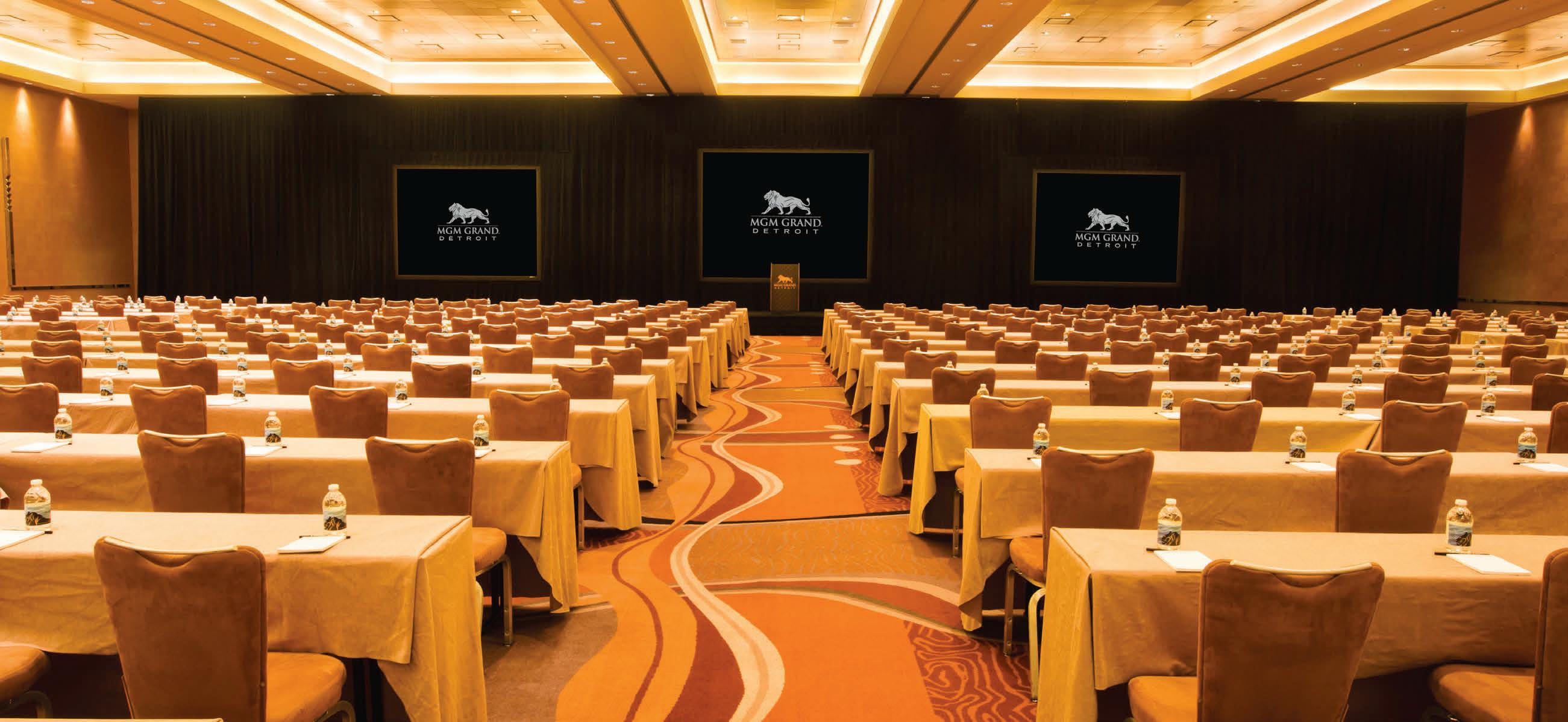












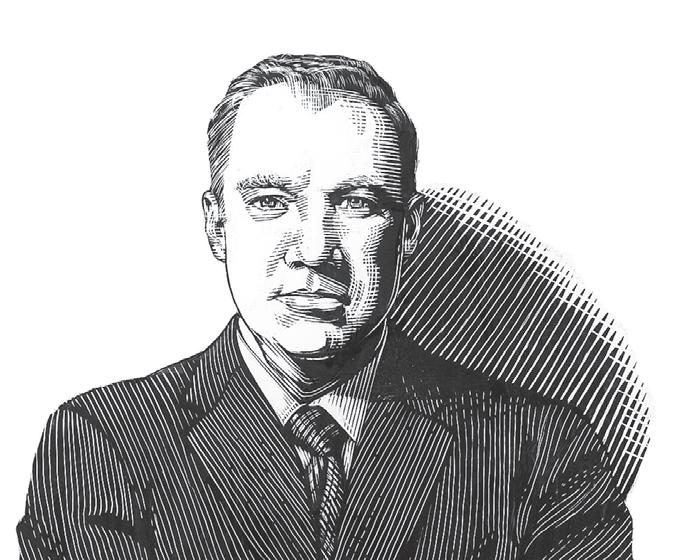

Higher education is expanding in Detroit at a rate not seen since the 1950s.

Grand River Avenue, a few blocks west of the Fox eatre. e $250-million research, education, and entrepreneurship project will open in spring 2027.


In recent years, investments made by the “Big ree” — Wayne State University, the University of Detroit Mercy, and the College for Creative Studies — are a reminder that a con dent market is an attractive market.

that a con dent market is an
Moving to the east side of the central business district, in December, Bedrock, Dan Gilbert’s real estate company, announced plans to develop a 14-acre district along Gratiot Avenue on the site of the former Wayne County Criminal Justice Center complex. e new campus will focus on fostering innovation in life sciences, technology, and entrepreneurship.
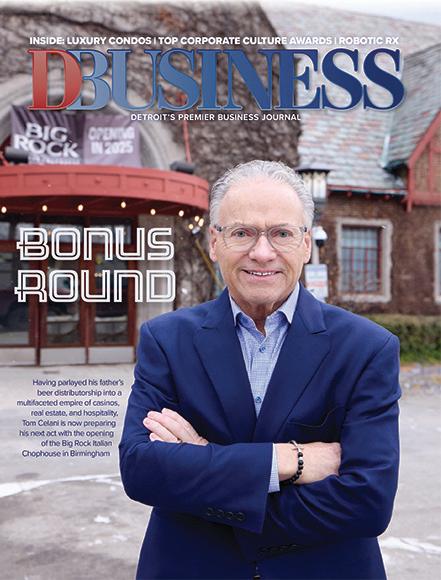

Contributing to a new age in higher learning, more businesses are seeking access to skilled talent, nancial aid and scholarships are on the rise, and philanthropy has never been stronger, especially among baby boomers reaching their golden years.
nesses are seeking access to skilled




With the Big ree institutions leading the way, two decades ago the University of Michigan and Michigan State University dipped their toes into the water; each occupies space on opposite sides of Woodward Avenue, south of Mack Avenue.
In 2008, what was then known as the Center for Creative Studies established the A. Alfred Taubman Center for Design Education in General Motors’ famed Argonaut Building in New Center.
A pause brought on by the Great Recession, the city’s bankruptcy, and COVID-19 was lifted in 2023 when MSU acquired a majority stake in the Fisher Building in New Center while further solidifying its longstanding partnership with Henry Ford Health.
e two organizations are currently building a $335-million Henry Ford Health + Michigan State University Health Sciences Research Center just west of the Detroit Pistons practice facility. It will be home to joint programs spanning cancer, neuroscience, cardiometabolic diseases, immunology, and precision health.
e 335,000-square-foot facility, including the new Nick Gilbert Neuro bromatosis Research Institute, is scheduled to open in 2027.
Farther south, the University of Michigan Center for Innovation in Detroit is under construction at
In partnership with BAMF Health, Michigan Innovation Headquarters, Ferris State University, and Wayne State University via its TechTown Detroit entrepreneurship hub, among others, the project seeks to become a premier hub for advancing precision technology, personalized medicine, and biotech.
e new campus will open in phases in 2027, o ering comprehensive education and talent development opportunities.
Other higher education providers have added or expanded their presence in the city, including Central Michigan University, Davenport University, Grand Valley State University, Lawrence Technological University, Pensole Lewis College of Business and Design, and Wayne County Community College.
Adding to investor con dence, U-D Mercy was recently named a Research University by the Carnegie Foundation for the Advancement of Teaching and the American Council on Education.
Meanwhile, in April, Wayne State was gifted $50 million for the College of Engineering by James and Patricia Anderson. It comes on the heels of $40 million donated by Mike and Marian Ilitch to establish the Mike Ilitch School of Business, which opened in 2018 just north of Little Caesars Arena.
Ko Bonner, CEO of Bedrock, sums up the growth in skilled training best.
“It allows businesses to have better access to top educational institutions and a diverse talent pool,” he says, “while fostering cross-industry collaboration in close proximity to major markets.”
R.J. King rjking@dbusiness.com
I just finished reading your latest magazine (March-April 2025 DBusiness). I have to tell you, it was your best edition. I enjoyed the Century Club section and the story about Tom Celani and the rest of the issue. I will pass it on to Marshall Chin (owner of Mon Jin Lau in Troy), a big wine guy. Marshall knows everyone who is into wine.
Al Trombetta Royal Oak
ART OASIS
Thank you very much for publishing the terrific article “Art Oasis” in the March-April 2025 edition of DBusiness. We appreciate and value your involvement and look forward to having you back out to visit when the wisteria is blooming.
Linda Schinkel Rodney Detroit
COMMERCIAL REAL ESTATE AWARDS
I just want to reach out on behalf of Jonna Group and say thanks for the gracious acknowledgement as Broker of the Year during the recent DBusiness Commercial Real Estate Awards program. We will proudly timestamp the award on our itinerary and appreciate all that you do. Thank you once again. Simon Jonna Birmingham

Business leaders say they trust the attorneys of Plunkett Cooney to anticipate legal pitfalls, to resolve high-stakes litigation and to craft contracts they can sign... with confidence. See your business differently. Get the Plunkett Cooney perspective. n Appellate Law n Banking, Bankruptcy & Creditors’ Rights n Business Transactions n Cannabis Law n Commercial Litigation n

Tom Murray has been a regular contributor to DBusiness for several years. He began his career in print journalism, then made an unplanned turn to broadcast television, where he was an award-winning anchor and reporter for three decades, covering everything from sports to fine wine and true crime. His work for DBusiness is a return to his early aspirations in the business world: As a kid growing up in his native New York City, Murray’s regular summer job through high school and college was on the floor of the stock exchange. In this issue, he wrote the Perspectives piece on Superlap Drive Studio in Ferndale, and the Return on Investment feature about Midland’s Chris Keefer of BeAlive Inc. and Rivers Are Life.
Matthew LaVere is an editorial portrait and commercial photographer based in Detroit. He understands that most people don’t enjoy being in front of a camera, which is why he continues to learn how to direct and capture realistic expressions in his portraits in the least amount of time by working on personal portrait projects outside of client work. In this issue, he photographed the 2025 Class of 30 in Their Thirties over three days. He has worked with many brands and publications, including DBusiness, Hour Detroit, Car Design News, DFCU, Shinola, the Detroit Lions, Ford Motor Co., and HBO.
CONTRIBUTION: Photographer, 30 in Their Thirties SEE IT HERE: Page 44


Nic Antaya is a Detroit-based photographer specializing in reportage, portraiture, sports photography, and photo essays for editorial and commercial clients. In any given month, he might be on the sidelines of a pro sporting event, making portraits of everyday people and industry leaders, or covering breaking news and human-interest stories for clients like The New York Times, The Washington Post, Getty Images, and more. Across all assignments, Antaya draws on his natural curiosity and ability to connect with others to create compelling, story-driven imagery. In this issue, he photographed the ACG M&A All-Star Award winners.
STRATEGY Travis Fletcher
DIGITAL DEVELOPMENT MANAGER Matt Cappo SR. DIGITAL DEVELOPMENT SPECIALIST Luanne Lim
DEVELOPMENT SPECIALIST Izak Geisler
DIRECTOR Jeremy Leland CIRCULATION
CIRCULATION MANAGER Riley Meyers
CIRCULATION COORDINATORS David Benvenuto, Cathy Krajenke, Rachel Moulden, Michele Wold MARKETING AND EVENTS
MARKETING AND EVENTS MANAGER Regan Wright
MARKETING AND EVENTS COORDINATOR Maya Stephenson
MARKETING AND EVENTS ADMINISTRATIVE ASSISTANT Isabella Amadori
WEDDINGS ACCOUNT MANAGER Karen Wilkie
MARKETING AND EVENTS INTERNS Zeinab Beydoun, Olivia Clark
MARKET RESEARCH
MARKETING RESEARCH DIRECTOR Sofia Shevin
MARKETING RESEARCH COORDINATORS Kristin Bestrom, Alyssa Fueri
MARKETING RESEARCH SALES COORDINATOR Alex Thompson
MARKETING RESEARCH SALES ASSISTANT Theresa Lowery
GRAPHIC DESIGNER Kendra Okamoto
MARKETING RESEARCH INTERNS Alyssa Dunson, Alli Garpow
BUSINESS
CEO Stefan Wanczyk
PRESIDENT John Balardo
DIRECTOR OF BUSINESS OPERATIONS Kathie Gorecki
MEDIA ASSOCIATE Kayla Yucha
SENIOR ACCOUNTING ASSOCIATE Andrew Kotzian
ACCOUNTING ASSOCIATES Jenna Glod, Austin Schmelzle
DISTRIBUTION Target Distribution, Troy
CONTRIBUTING
Energy is the key that unlocks the world of travel, turning every trip into an unforgettable experience. From the thrill of exploring new places to the joy of creating lasting memories with loved ones, energy is what makes it all possible.
With innovative energy solutions, we’re modernizing, protecting and maintaining our energy super systems to fuel travel and exploration today and into the future.















































1.5 BILLION
U.S. Department of Energy loan guarantee for reopening Holtec’s Palisades nuclear plant
Arenaissance in nuclear energy production is sweeping the nation as the growing use of AI, bots, servers, EVs, and industrial robots place added demands on the power grid.
With the federal government offering new incentives to support the development of nuclear power generation and reopen older facilities, most states — including Michigan — are considering adding the latest technological advances to ensure they have access to reliable power, as well as to boost the prospect of selling excess energy.
Few would have predicted the next generation of nuclear energy production, known as small modular reactors, would get its start in Michigan. With the support of the U.S. Department of Energy, and with related agencies backing the development of the nation’s first small modular reactors at the closed Palisades Nuclear Plant in Van Buren County (near South Haven), the state Legislature should support and introduce measures to streamline the regulatory process so the state can lead the nation in nuclear energy production.
So far, the newly installed Legislature is off to a good start. In late February, a bipartisan effort was announced to encourage “safe, clean, and reliable nuclear energy production in the state.” The measure was supported by representatives Pauline Wendzel (R-Bainbridge Township), Joey Andrews (D-St. Joseph), Jamie Thompson (R-Brownstown), Mike McFall (D-Hazel Park), Sam Steckloff (D-Farmington Hills), and Greg VanWoerkom (R-Norton Shores).
“This bipartisan package is about more than energy policy; it’s about creating high-paying jobs, thriving local communities, and attracting world-class talent that turns ambition into achievement,” Wendzel said. “Other states are working hard to lead in this space, but with this package, Michigan is showing that when we champion innovation, we don’t just compete — we set the standard.”
THE 2025 RESTAURANT BUSINESS REPORT, released in March by SpotOn, a software and payments partner for dining establishments and small businesses, highlights that with the right tools and insights, restaurant operators can take control of their financial future to strengthen profitability and position their businesses for long-term success.
According to the report, 99 percent of restaurant operators agree strong financial management is critical to their success, but 84 percent say their current systems need improvement, and nearly half admit they should spend more time on financial tracking, but struggle to do so.
In turn, 73 percent of operators lack full confidence in their pricing strategy, with most relying on gut instinct or competitor pricing instead of real-time cost analysis. With real-time financial reporting and automation, restaurants can spend less time tracking numbers and more time running their business, the report states. By investing in better integration of financial systems with payroll and accounting software, restaurants can reduce administrative burdens, free operators to focus more on profitability, and improve the overall dining experience by streamlining processes like payroll preparation, manual tasks, and strategic management and planning.
INTERNET
57 MILLION 2026
Amount U.S. DOE released on March 17 for the Palisades project as a first installment
It’s a sharp turn from past legislators, who backed the development of billions of dollars in wind turbines and solar arrays that only work under certain conditions — namely, they’re dependent on the movement of air and/or long periods of steady sunlight. The trouble with those forms of green energy infrastructure, which were first pushed by former Gov. Jennifer Granholm, is that they haven’t met the promise of providing less costly energy, according to ScienceDirect.com.
What’s driving Michigan’s potential leadership in nuclear energy comes from a recent announcement by Holtec International, which in late February launched Mission 2030, a program to build America’s first small modular reactors — Holtec’s SMR-300 — at the Palisades site, with a target of 2030 for their first commercial operation.
The new SMR-300s will be co-located with the existing 800-megawatt Palisades plant, which is on track to restart after an extended outage following a planned shutdown in 2022. Together, the historic plant restart (it would be the first in the nation) and the addition of two SMR-300s make Michigan ground zero for America’s nuclear renaissance.
ANAND MAHINDRA, chairman of Mahindra Group in Mumbai, India, a multifaceted enterprise spanning automotive, aerospace, agriculture, construction, and defense, recently shared a report that showed AI and bots account for 61 percent of global internet traffic; the nearly 5 billion people who use the web make up the rest. In a social media post, Mahindra wrote, “We’re already living in the matrix.”
According to the corporate leader and others, bots have become so adept at mimicking human posts that everyday users are finding it more difficult to discern between real messages and digital actors. What’s more, the bot invasion has led to more cyberattacks, data breaches, and hacking tools.
With non-human forces now dominating internet activity, at what point should we be concerned that self-aware bots will support their own interests at the expense of people? Will the “matrix” take full control of our lives, produce its own cryptocurrency, and run the entire world, as envisioned in several blockbuster fictional movies?
Planned reopening of Palisades nuclear plant
Sources: Insurance Journal, U.S. Department of Energy, U.S. Nuclear Regulatory Commission
During the SMR launch ceremony held at the Palisades site, significant milestones in Holtec’s site preparation work for the SMR-300s were highlighted, including the signing of an expanded alliance agreement with Hyundai Engineering & Construction to build a 10-gigawatt fleet of SMR-300s in North America through the 2030s, beginning with the Palisades SMR project.
As Michigan’s Legislature looks to support the Palisades project, it should consider encouraging the production of needed components and systems, building a systematic, global supply chain in the state.
Moving forward, businesses, governments, and educational institutions should work more closely together to ensure the digital world serves humans, who more and more rely on the internet to run their respective operations and improve their daily lives. For centuries, we fought to break up monopolies and tyrannies. It would be ironic, to say the least, if we created a doomsday machine of our own making.


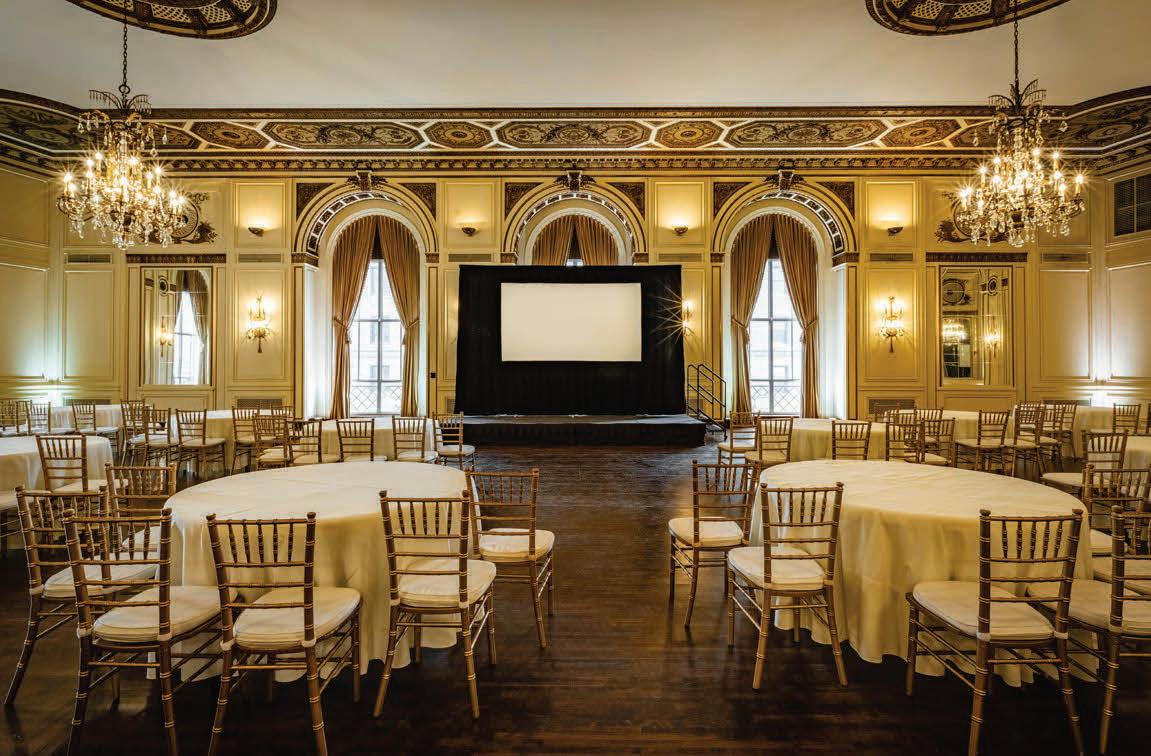

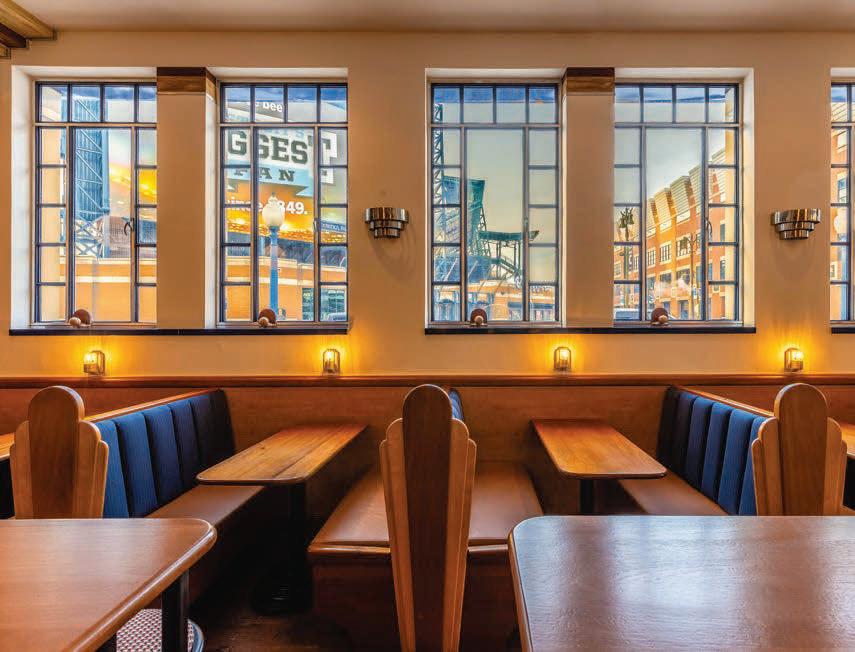





THE WALL STREET JOURNAL MARCH 19, 2025
BY ISABELLE BOUSQUETTE
Bryan Goodman, Ford Motor’s director of artificial intelligence, said he’s pushing forward a number of use cases for artificial intelligence at the company, as part of an effort to design and engineer new cars as quickly as its competitors.
“I personally think that Ford engineers as good of products as anyone in the world in automotive. But I think we have to speed up to be competitive. I look at the Chinese (original equipment manufacturers) and their engineering cycle times are quite fast,” he said.
Ford in recent months has grappled with timid demand for electric vehicles, rising competition, and more recently, new U.S. tariffs. Last month, the company posted higher revenue for the fourth quarter, but the outlook for 2025 was a big disappointment, causing shares to fall.
Goodman, who’s been at Ford in various roles since 1999, said AI agents, which are technologies that can independently perform tasks on behalf of humans, have the critical ability to help bring new car models to market faster.
Today, Ford’s designers
sculpt each new model out of clay before passing the design on to engineers who run lengthy simulations and stress tests. “It’s very time consuming,” he said. Physical clay, which is still useful, won’t totally go away, he said, but AI can be used to automate and speed up parts of the process.
To bring that vision to reality, Ford is relying on a range of AI models, including those from OpenAI, Anthropic, and Chinese company DeepSeek. And it’s readying its data centers for the next generation of Nvidia chips, a process that comes with its own set of challenges.
Goodman sat down Tuesday with The Wall Street Journal at Nvidia GTC in San Jose, Calif., an event he’s attended for the last 10 years, to discuss his vision for implementing AI, his concerns about upcoming types of GPUs and why he sees similarities between Nvidia CEO Jensen Huang and the Pied Piper. ...
THE INDEPENDENT FEB. 27, 2025
BY ELENOR J. BADER
When law professor
Bernadette Atuahene moved to Detroit in 2017, she intended to study the city’s then-burgeoning squatter movement. A National Science
“Restrictive federal immigration legislation passed in 1921 and 1924 drastically reduced European migration, further expanding opportunities for Black workers,” she explains. In 1925, Grandpa Brown was hired to work in Ford’s River Rouge facility.
Foundation grant funded what she expected to be an exhaustive examination into the approximately 5,000 publicly owned buildings that were squatter-occupied. But like many well-laid plans, Atuahene’s ideas shifted when she realized that one in four Detroit homes had been confiscated for non-payment of property taxes, the largest group of foreclosures in U.S. history, and she quickly changed her focus to unravel how and why this massive housing crisis had happened.
The result, “Plundered: How Racist Policies Undermine Black Homeownership in America,” is an infuriating and sobering read.
Atuahene focuses on personal stories, and the book includes the voices of dozens of people: those who’ve lost their homes, speculators, government officials, and community housing activists, among them. The text centers on two working-class families, one Black and one white, to illustrate what unfolded.
Tommie Brown Jr., affectionately known as Grandpa Brown, was born into a sharecropping North Carolina family in 1901. “Exploitative sharecropping arrangements would not compete with the salaries offered by industrialist Henry Ford,” Atuahene writes, and like many other Black southerners, Brown moved to the Motor City.
Although the Depression temporarily limited his job prospects, Brown eventually did well for himself and in 1973 purchased a 6,000-square-foot home that sheltered him and his extended family for decades. Even though “urban renewal” had fractured the neighborhood and the 1967 riots had catapulted most of the city’s white residents into segregated suburbs, the Browns thrived. However, as Atuahene notes, although “lucrative blue-collar jobs allowed Grandpa Brown and his contemporaries to flourish, their children and grandchildren floundered when deindustrialization snatched these jobs away.” …
The electric KIA Niro pulls out from its parking space in the Corktown neighborhood of Detroit, enters the road, pauses for traffic, its steering wheel spins and the car makes a left turn.
It’s not an autonomous vehicle, but yet there’s no on-board driver operating it. The person who is driving the car is doing so from behind a console and a bank of monitors about four hours away in Pittsburgh, Pa.
The vehicle is part of a pilot program in Detroit called Corktown Carshare that launched March 4. It’s aimed at providing the neighborhood’s roughly 4,000 residents with access to clean, low-cost transportation, especially for those who can’t afford a personal vehicle.
Under the program jointly operated by Sway Mobility and remote driving technology company Mapless AI, someone needing some wheels for a few hours can arrange for a vehicle via the Corktown Carshare website or mobile app.
Using Mapless AI’s technology, the remotely-operated EV is driven to the customer — a process called teleoperation.
Indeed, teleoperation is a key to reducing costs by eliminating the need for multiple lots and charging stations
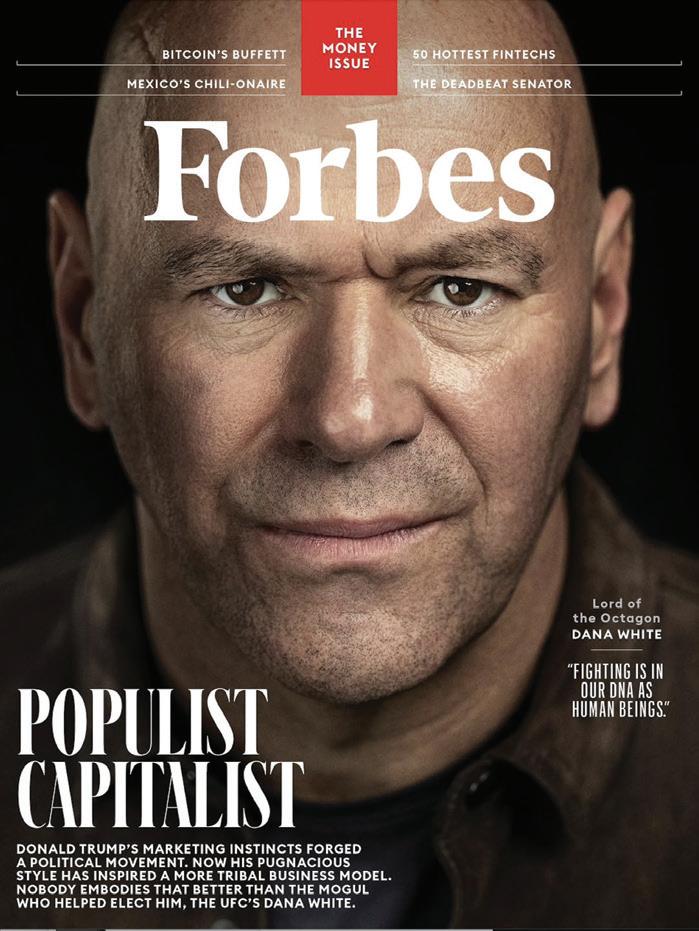
spread across the city.
“Our mission is to increase accessibility to transportation for people if we can continue to lower those costs, but increase value and convenience,” said Michael Peters, CEO (and) co-founder (of) Sway Mobility, in an interview.
“Because we don’t have to worry about dispatching runners, let’s say, or people in Detroit, getting them to the car, moving the car, getting them back from the car, this is the first time where a model like moving these vehicles around can actually be done cost-effectively,” added Mapless AI co-founder and CEO Philipp Robbel.
Once purchased, the cost of ownership is also becoming more onerous.
The latest Your Drive Cost study by the Automobile Club of Southern California reveals that the total cost to own and operate a new vehicle is $12,297, or $1,024.71 monthly, an increase of $115 from 2023.
The introductory rate for a Corktown Carshare is $5 plus tax per hour, with a minimum one-hour rental.
“We were doing kind of smart cities consulting and things like that prior to this and one of our clients said, hey, we have this real issue around mobility,” explained Peters. “When we dug into it, we discovered that in cities like Cleveland and Detroit, residents, on average, pay a higher percentage of their income on transportation-related costs than they do in housing. So that was a real eye opener to us, and kind of what got us started down this pathway.”
The Detroit pilot program is set to run three to six months, according to Robbel, and is starting with one teleoperated vehicle, but the intention is to grow the operation. …

COUGAR
SMITHSONIAN MAGAZINE • MARCH 18, 2025 • BY SARAH KUTA
Cougars once roamed throughout Michigan. But, around the turn of the century, hunters wiped out the state’s population.
Now, wildlife biologists are cautiously optimistic that the big cats have returned to Michigan. Two cougar cubs were recently spotted in the Upper Peninsula, marking the first time the species’ youngsters have been discovered in the state in more than 100 years, according to a statement from the Michigan Department of Natural Resources.
On March 6, a man was driving on private land in the western Upper Peninsula when he saw two kittens running along the road. When he stopped to get a closer look, one of the kittens ran under his truck.
The man, who was in Ontonagon County at the time, snapped a few photos of the kittens, which he initially thought were bobcats. Another motorist also pulled up for a look at the young animals.
“They both talked about them, like, ‘Oh, neat kittens.’ And then they went along their day, not thinking anything of it,” says Brian Roell, a wildlife biologist with the Michigan Department of Natural Resources, to MLive.com’s Sheri McWhirter.
But, as it turns out, the two drivers had witnessed something remarkable. State wildlife biologists looked at the photos and realized the kittens were not bobcats, but endangered cougars. They suspect the kittens are between 7 and 9 weeks old.
The motorists did not see the kittens’ mother, but biologists suspect she was somewhere nearby. Cougars are “highly dependent” on their mothers and typically spend the first two years of their lives with her, according to the statement.
The kittens have not been seen since March 6. The young creatures are “very vulnerable right now,” Roell says in the statement.
“We don’t know where they are or if they’re even alive,” he adds. “Mother Nature can be very cruel.”
Wildlife biologists are hopeful they’ll catch sight of the kittens on one of the many trail cameras set up near where they were spotted. Those same trail cameras have been capturing images of an adult cougar since January, and now wildlife biologists believe that adult is likely the kittens’ mother.
“We’re hopeful that they’ve reunited (with their mother),” Roell tells Bridge Michigan’s Kelly House and Laura Herberg. “But we don’t know.”
Cougars (Puma concolor), also known as mountain lions or pumas, are large, wild cats that can weigh up to 180 pounds in adulthood. Their bodies measure 5 to 6 feet long, with their tails adding another 2.5 to 3.5 feet to their overall length. Young cougars have spotted fur, while adults usually have solid coats that range from yellowish-tan to reddish-brown. The tips of their ears and tails are usually black.
Cougars were hunted to extinction in Michigan in the early 1900s. …
SURVIVED ITS BIG-NAME COMPETITORS
DAILY MEAL
the Motor City for generations, and like Detroit-style pizza, the chips have a story behind them. In 1930, two Sicilian immigrants, Cross Moceri and Peter Cipriano, started a business selling potato chips in Detroit. Initially called Cross and Peters Company, the name was changed in 1934 to the one known by every Detroiter: Better Made. Unlike the big players competing against them, the family-owned brand is a source of pride to the people of Detroit, with a legacy of community involvement that spans decades. Better Made earns the loyalty of its customers by getting involved in causes close to the hearts of the people of Detroit through fundraisers and other events.
Potato chips haven’t always been on store shelves. When Better Made first started frying tubers, the best way to get them into the hands of customers was to sell the chips door-to-door in waxed paper bags. Seeing an opportunity, Better Made looked for ways to reach movie-goers in the days before there were concession stands at the cinema. The solution was to open Better Made stores strategically placed next to theaters.
unlike Lay’s failed attempt to succeed with the same combination. …
DEREK PARKER
For years, the Detroit Pistons occupied the bottom of the standings, with that eventually becoming top NBA Draft picks.
In a five-year stretch from 2019 to 2024, the team won just 94 games in total, averaging just under an abysmal 19 wins per season. Even just last year, the squad saw 14 wins, finishing as the worst team in the league again via a historic losing streak.
Now, after having landed prospect after prospect at the draft for the last half-decade, the team is finally starting to figure things out.
For the first time since 2008, the team has won eight straight games (as of Feb. 27) by five or more points and is cruising as one of the hottest teams in the league. The team had previously beat up on teams like the 76ers, Hornets and Bulls earlier in the streak, but put an exclamation point on it with a win over the Boston Celtics on Feb. 26.
Former No. 1 pick Cade Cunningham continued his All-Star ways, going for 21 points, 11 assists and four rebounds. Defensive-minded wing Ausar Thompson nabbed five steals in a do-it-all performance, and Jalen Duran added a double-double in the 20-point win.
Most simply, the team’s young core is beginning to figure it out.
Cunningham has been at the epicenter, putting together a legitimate All-NBA-level season with white-hot scoring, facilitating and more. Duren, a 2022 draftee, has taken a massive jump to 70 percent shooting overall, adding 10.3 rebounds, 2.6 assists and 1.1 blocks.
Thompson missed a good chunk of the season but has begun to find his niche on the team, as has rookie Ron Holland.
The team’s core of draftees are finally beginning to put things together. And it’s made even more exciting for Pistons fans given how much internal development has yet to happen, and how good they look without former No. 5 pick Jaden Ivey in the lineup, too. …
FEB. 27, 2025 BY
CHRIS DAY
When you think about potato chip brands, your mind may go to Lay’s, Ruffles, or Pringles. But, if you’re from the Detroit area, you may automatically think of a certain underdog that has survived despite its big-name competitors. It’s an iconic chip brand that’s had a dedicated fanbase in Detroit since 1930.
Better Made Potato Chips have been enjoyed in
The key to longevity in business is changing with the times, and that’s exactly what Better Made did. The 1950s saw Better Made introducing wavy chips aptly called Wavetts. In 1961, when other chip brands started selling flavored varieties of their products, the company introduced barbeque-flavored chips, followed by a sour cream and onion variety. In 2008, sweet and salty enthusiasts were treated to chocolatecovered potato chips that are still being sold today,











Keep employees engaged with tailored benefits that meet their needs. Our experts partner with your HR team, advising on everything from cost control to compliance. We create customized solutions that boost well-being and participation so you can focus on growing your business.
Ready to see the difference? Contact us today for a complimentary review of your current benefits program. Let’s build a plan that’s all about you.

















History America, in the Upper Peninsula, is igniting memories and preserving the nation’s heritage.
BY TIM KEENAN






















They say a picture is worth a thousand words. e prints from History America in Negaunee, west of Marquette in the Upper Peninsula, are a testament to that, as they tell the stories of entire institutions — and, by extension, the nation.
e prints, which come in either 6 x 24 or 11.75 x 36 inches (framed and unframed), highlight the evolution and history of sports like baseball and football, as well as the armed services, including the U.S. Navy and U.S. Marines. Other heroic subjects include women in the military, aviators, and soldiers in general. Still others relate the history of Old Glory, the Constitution, police and re ghters, the Civil War, and World War II, with more in production.
“I have ancestors who fought in the American Revolution and the Civil War, so American history has always been near and dear to me,” says Mark Waterman, owner and president of History America.
LaFontaine Automotive Group
Opens Mitsubishi Dealerships
LaFontaine Automotive Group in Highland Township opened new Mitsubishi Motors North America (MMNA) dealerships in Ann Arbor and Lansing in April.
Other facilities are slated to open across Michigan by mid-2026.
History America, which creates and produces original prints in the Upper Peninsula, is on a roll following an appearance last November on the “Fox & Friends” morning show.
Community Unity Bank to be Acquired by British Bank
Community Unity Bank in Birmingham has agreed to be acquired by OakNorth, a U.K.-based institution focused on entrepreneurs. The amount of the stock-for-stock transaction has not been identified.




Born in Canada and raised in Kentucky and British Columbia, Waterman played football at the University of Utah before embarking on a six-year career playing defensive back in the Canadian Football League between 1988 and 1992. He moved to Michigan in 1994. He took a job running a print shop that produced U.P. maps and various magazines. His son now runs that operation.
After the tragic events on Sept. 11, 2001, he was inspired to create something to celebrate rst responders. In 2004, the “History of the American Fire ghter” was published. It was 24 x 36 inches, and was sold directly to re departments and reghting museums.
“When I realized that they really liked it, I said, What are we going to do next?” Waterman says. e answer was “ e History of the American Soldier.”
“ e original Fire ghter was too big,” he says of his original print. “I realized 11.75 x 36 inches was a standard frame size, so we recon gured Fire ghter when we printed the American Soldier.”
As the years progressed, more subjects were added. Waterman says 40 percent of his annual sales come from e-commerce sites like Amazon, Etsy, and Made in the U.S.A., and 60 percent of his prints are sold at retail outlets, with most sales coming from gift stores and museums.
e company’s big break came last fall when the “Fox & Friends” morning show invited Waterman to display his wares as part of a holiday gift segment the Saturday after anksgiving. e result was overwhelming.
“Every time I got a sale on a website, I got an email,” Waterman says. “My phone was pinging and vibrating like crazy after that. I had 1,100 emails by the end of that day. We ran out of inventory in three days. It was a good problem to have.”
Corewell Health in Royal Oak Receives $5M Gift for Research
Dr. Peter Chen, radiation oncologist at Corewell Health
William Beaumont University Hospital, has pledged $5 million to create the Dr. Peter Y. Chen and Family Endowed Chair in Radiation Oncology and the Dr. Peter Y. Chen and Family Fund.
Legendary Kronk Gym to Make Detroit Return
The legendary Kronk Gym is returning to Detroit under new ownership, with the continued involvement of Marie Steward and Sylvia Steward-Williams, along with several of Kronk’s original world champions like Detroiter Hilmer Kenty.
Vesco Oil Corp. Launches Clean Energy A liate
Vesco Oil Corp. in Southfield has created a new a liate, Vesco Clean Energy, which specializes in battery management services for companies nationwide, as well as EV-charging stations across the Midwest.

BAVARIAN INN LODGE
has opened the Bavarian Blast Waterpark, billed as “Michigan’s biggest indoor waterpark and family fun center.”
The 170,000-squarefoot attraction includes 16 water slides, a “not-solazy” river, a large wave pool, private cabanas, Michigan’s first swim-up bar, and more.
The Bavarian Inn also has opened the state’s first dual mat racing slides. The new park is available to overnight guests and limited day pass visitors.
Four new food and beverage experiences have been added at the Frankenmuth Bavarian Resort, including a quick service café, a smoothie bar, a bar serving snacks and alcoholic beverages, and the swim-up bar, where visitors will have the exclusive opportunity to lounge in a heated indoor-outdoor pool.
Beyond the Bavarian Blast Waterpark, the indoor Family Fun Center includes a three-story rope course, rock-climbing walls, mini-bowling, a Build-A-Bear Workshop, laser tag, and an expanded arcade with more than 180 arcade and redemption games.
“Throughout the four generations of leadership at Bavarian Inn, our mission has always been to create enjoyable experiences,” says Michael Keller Zehnder, president of Frankenmuth Bavarian Inn Lodge. “This expansion stands as a testament to our continuous dedication to this pursuit.”
— By R.J. King
Detroit Regional Partnership Attracts $9.4B Since 2020
The Detroit Regional Partnership reports that since 2020 it has helped attract 121 projects that created an estimated $9.4 billion in investment and more than 36,500 jobs with an average wage of $68,819 per year.
Brian Falther has launched a unique wellness club in Detroit
BY R.J. KING | NICK HAGEN
In what may be a first in Michigan, Brian Falther, a mechanical engineer, entrepreneur, and self-described dreamer, has opened BASK Detroit, a cold-plunge and sauna wellness club located east of Little Caesars Arena in the Brush Park neighborhood.
After being introduced to cold plunges — which can boost circulation, reduce muscle soreness, and lower stress — a few years ago, Falther developed a serviceable home system using a large plastic tub and plenty of ice.
“I would get the tub and sit in it for three to five minutes, and when I got out I felt really good,” Falther says. “I became hooked, and then I modified a chest freezer and filled it with ice. Throughout this phase I saw an opportunity for a cold-plunge studio, or club.”
Finding opportunities isn’t new to Falther. After graduating from Kettering University in Flint in 2010, Falther co-founded Future Tech Farm, which centered on developing sustainable organic farming systems. Small plants, typically different varieties of lettuce, were set close together on a series of shelves under grow lights.
In 2015, he moved to New York and joined Bowery Farming, which created a network of indoor vertical farms using a proprietary operating system. He moved to Detroit in 2021 to take part in the city’s renaissance, and founded HopTera, a holding company for aerospace and aviation intellectual property that has applied for a patent for a novel electric motor, in partnership with Kettering University.
“I was living in an apartment in the Scott building, and across (Erskine Street) was a ground-floor retail space that was part of a new parking deck,” Falther says. “In addition to the space inside, there was an area where I could have an outdoor patio.”
While serving as a board member of Detroit Ledger Technologies, which offers blockchain infrastructure support, Falther began to approach investors to bring his idea of a cold-plunge and sauna wellness club to life.
“Every time I left my apartment to go anywhere, I kept seeing the available retail space across the street, and that helped motivate me,” Falther says. “Certainly, the commute was ideal. To develop the cold-plunge tubs, I worked with another startup, Artic Carbon in Detroit, to produce a cold-plunge tub made of forged carbon fiber.”
Offering four hand-crafted tubs, BASK Detroit also includes a two-tiered, 40-person cedar sauna, men’s
Dodge Debuts Interactive Charger Virtual Experience
The Dodge brand of Stellantis has debuted the mobile Dodge Charger Virtual Experience, which was designed to make it easier for enthusiasts to take a deep dive into the nameplate and create their “dream vehicle.”
Champion Homes Debuts Manufactured Duplex Series Champion Homes Inc. in Troy has launched a new product in the manufactured housing sector — the Concord Duplex Series — in a move to provide solutions to the nationwide affordable housing shortage.
and women’s locker rooms, plenty of towels and robes, and a line of all-natural shampoos, conditioners, body washes, and fragrances developed in partnership with Ace High Co. in Ferndale and Sfumato Fragrances in Detroit.
Billed as a “premier place to chill,” BASK Detroit drives revenue via membership plans, the sale of bath and body products, and gift card sales.
THERMAL LAYER
“BASK Detroit was built as the first location of what is planned to be a franchise,” Falther says. “The company has four guiding principles — health, wellness, longevity, and community — and those principles will work anywhere in the world.”
Brian Falther and Donna Davila at BASK Detroit, a new cold-plunge and sauna wellness club in the city.
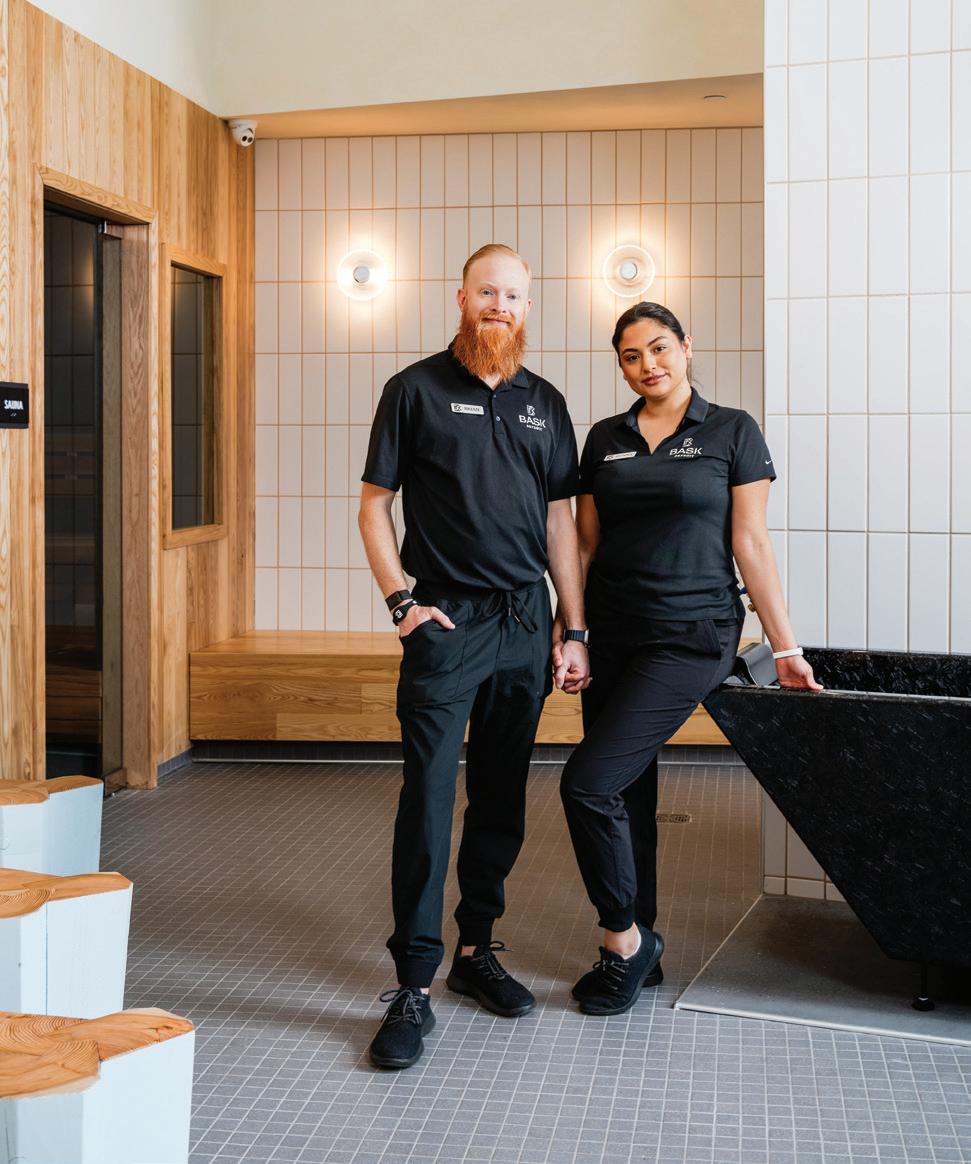
Dearborn Inn Reopens Following Major Restoration
The historic 135-room Dearborn Inn has reopened its doors following an extensive restoration and renovation. Part of Marriott Bonvoy’s Autograph Collection, the hotel was restored by Ford Land’s design team, among others.
ChoiceOne Financial Services Consolidates State Bank
ChoiceOne Financial Services Inc. in Sparta, north of Grand Rapids, and parent company to ChoiceOne Bank, has announced the consolidation of The State Bank with and into ChoiceOne Bank. The new name is ChoiceOne Bank.
The Cadillac House, a restored 165-yearold hotel in Lexington, aligns with Hilton to expand its client base.
BY TIM KEENAN
On July 4, 2018, a band played, a choir sang patriotic songs from the exterior balcony, and a large boat delivered guests to e Cadillac House on Main Street in Lexington, recreating the establishment’s original grand opening on July 4, 1860.
e 2018 event was the culmination of a project started two years earlier by Stacy Fox, co-founder and principal of e Roxbury Group, a Detroit-based developer, when she bought the closed, rundown, three-story hotel and an adjacent two-story structure for about $400,000.
Since the 1960s, only e Cadillac House Tavern & Bar had been in operation.
“It was beloved by the locals, so we thought we’d just clean it up and reopen it,” Fox recalls of the building that a previous owner had converted in the 1970s to look like a Swiss chalet. “As we started to look behind the curtain, and compared what was there to the hundreds of historic photos available, we found that there were a lot of original features still there.
“From that point, the project became a proper and full historic restoration, and we decided to make it a hotel again.”
Although she chooses not to disclose the total cost of the restoration, Fox says it was “more expensive to do the historic restoration compared to just cleaning it up and opening the bar and restaurant.”

Historic tax credits and a state community development block grant helped
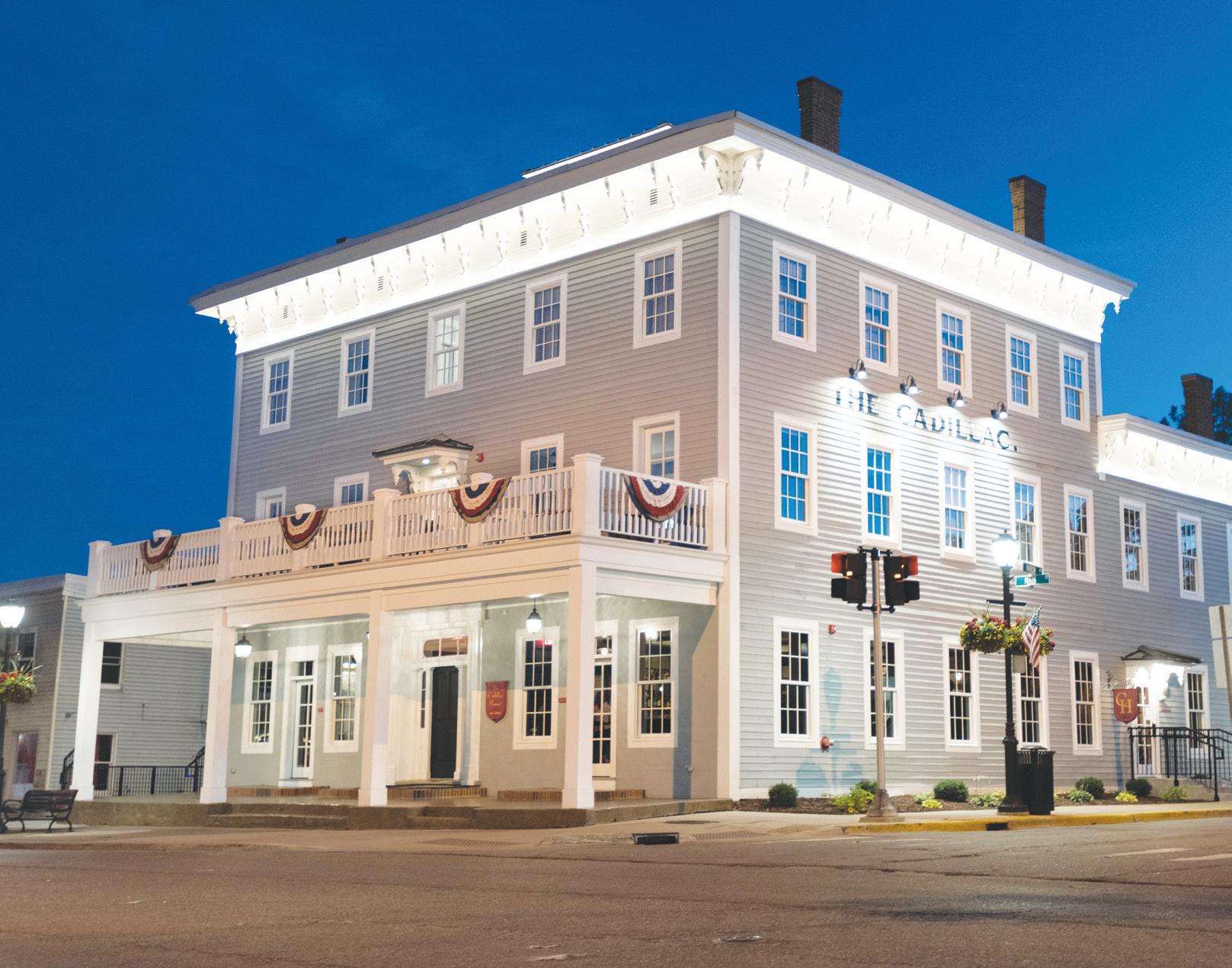
make Fox’s investment manageable.
“ e whole building was in pretty rough shape,” she says. “It was a bit of a mess, but from the trim that was still there you could see that it was a gorgeous Italianate building.”
e restoration included basement waterproo ng, adding modern mechanical systems, installing the rst elevator in the Village of Lexington, and replacing brick chimneys and the cupola on the roof, where guests once watched ships coming in from the lake.
Other restoration e orts included laying a hardwood oor in a main hallway, and redoing the original staircase, front door, sidelights, and transoms. Custom woodwork was created to match what existed of the original features. “Every surface was touched, replaced, or refurbished,” Fox says.
DB: WHERE ARE YOU?
CC: At the Ritz-Carlton on Amelia Island for the Senior Living 100 conference.
DB: WHAT’S GOING ON?
CC: Executives in the senior living space get together for forecast and strategy leadership sessions, we look at future innovations in the senior living space, and there are a lot of leadership-building activities.
DB: HOW IS ENCORE DOING?
CC: We’re doing very well. We focus on large communities that are under one roof or part of a campus o ering assisted living, long-term care, independent living, and memory care. We have 14 centers and we’re working on adding more.
DB: WHAT TRENDS ARE COMING?
CC: One focus of the
conference is how AI is impacting senior living. A couple of areas stand out, (including) wearable technology, where you might have a pendant that not only tracks when someone has fallen, but also (keeps track of) sleep patterns or walking patterns. For example, why is someone suddenly waking up in the middle of
e popularity of the original 12-room hotel prompted Roxbury to renovate a neighboring building in 2020, which added 11 more guest rooms, two meeting rooms, and 1,629 square feet of event space. In December 2024, it became part of the Tapestry Collection by Hilton.
“Being part of a national registration system helps market the rooms, automatically putting it on the radar of millions of Hilton Rewards members who wouldn’t otherwise know about it,” Fox says.
e a liation with Hilton, according to Fox, has made a di erence attracting weekday business travelers, improving the prospects of a project that started as a labor of love. “It’s something that needed to be done for the community, and we’re making it make sense.”
the night? Or AI might notice someone isn’t walking as well as they used to.
DB: WHAT ELSE?
CC: The other trend is using AI to cut down on sta paperwork, so they have more time to spend with seniors. There also was an AI friend platform where seniors who may be lonely or want to learn about
something can call a bot and have a nice conversation.
DB: HOW ABOUT LIVING TRENDS?
CC: Think of senior communities today as cruise ships. That’s why we have things like bowling alleys, putting greens, pickleball courts, golf simulators, and on-site rehabilitation services. We want to be all-inclusive.

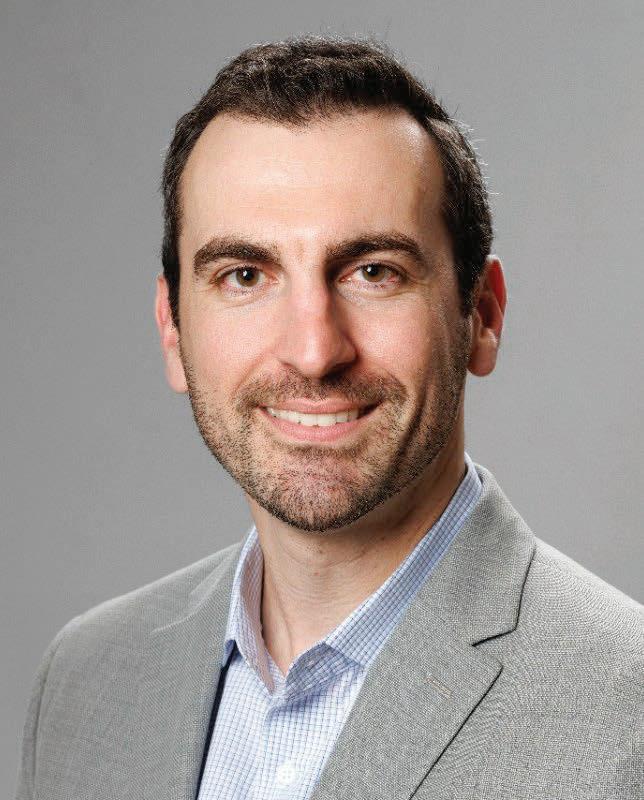

The Detroit Boat Club is poised for a major restoration that will make it a public destination.
BY R.J. KING
In the lead-up to being selected last year by the Michigan Department of Natural Resources as the preferred developer of what is planned as a $30-million restoration of the former Detroit Boat Club on Belle Isle, Dave Carleton and his team at Stuart-Pitman toured historic marinas across the country.
“We visited Boston, Philadelphia, Madison, Wis., and the Central Park Boathouse in New York City,” says Carleton, president of Stuart-Pitman in downtown Detroit. “We wanted to take the best ideas from the renovations of other historic boat clubs to bring forward the best plan for the Detroit Boat Club.”
While the club was private when it was originally founded in 1839 as a sport rowing club along the shores of the Detroit River, the members eventually moved to a new facility on Belle Isle in 1891. Following the loss of two successive boathouses to fires, in 1902 the current Venetian-style building was constructed with fire-resistant bricks and concrete, and built on pilings driven into bedrock.
A longtime developer in the city, Carleton, along with his brother, Tom, and a friend, Sean Emery, restored the vacant Library Lofts building starting in 1992.
Following a successful renovation into live/ work lofts, along with bringing in Vicente Cuban Cuisine on the first floor, the trio acquired the long vacant Grand Army of the Republic building at Cass and Grand River avenues and restored it into office lofts, two restaurants, and a banquet center. They have since sold both properties.
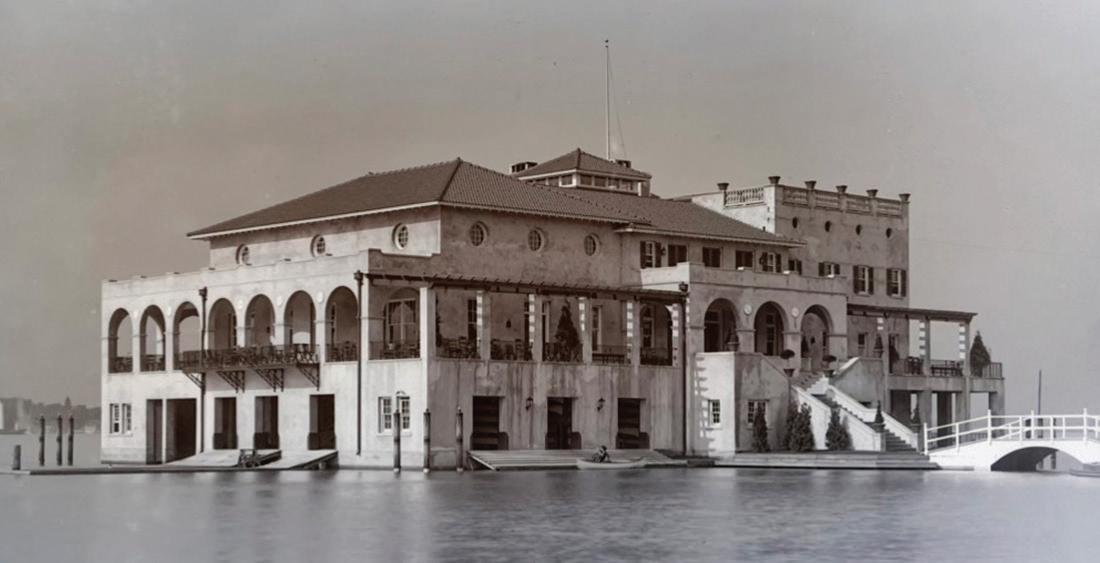
“We learned what it takes to restore historic structures, and all of that knowledge is going into what we’re calling The Belle Isle Gateway at the Detroit Boathouse,” Carleton says. “From the original RFP, five companies made bids, then it was down to three finalists, and from there we were selected. Now we’re working on getting a lease signed with the City.”
While the exterior hasn’t weathered the decades well, as its white stucco and red terracotta tiled roof have deteriorated, Carleton says the interior is largely intact, including a main ballroom, a cupola, verandas, dining spaces, carved wood figurines, and nautical-themed features.
Still, in 2022, a storage room used by the Detroit Rowing Club collapsed, which meant moving all of the boat racks outdoors. The City has owned the property since around 1996, when the remaining social club members left the building. In 2013, the City signed a 30-year lease with the Michigan Department of Resources to maintain and invest in the 982-acre island, including helping to oversee the boat club.

and meeting the two-year construction timeline, Carleton says the restored facility, along with a new, 80-slip marina, is expected to open in 2028.
In addition to being open to the public, the Detroit Boathouse will continue to be a home to the Detroit Community Sailing Center and the Friends of Detroit Rowing. Predicated on a lease being signed this year,
“We’ll have two restaurants, an ice cream parlor, the 140-seat ballroom, and a casual dock and dining outlet for boaters accessing the day rental slips,” Carleton says. “We see it as one more of the city’s treasures finding new life.”













































THURSDAY | JUNE 26,






BY R.J. KING | NIC ANTAYA
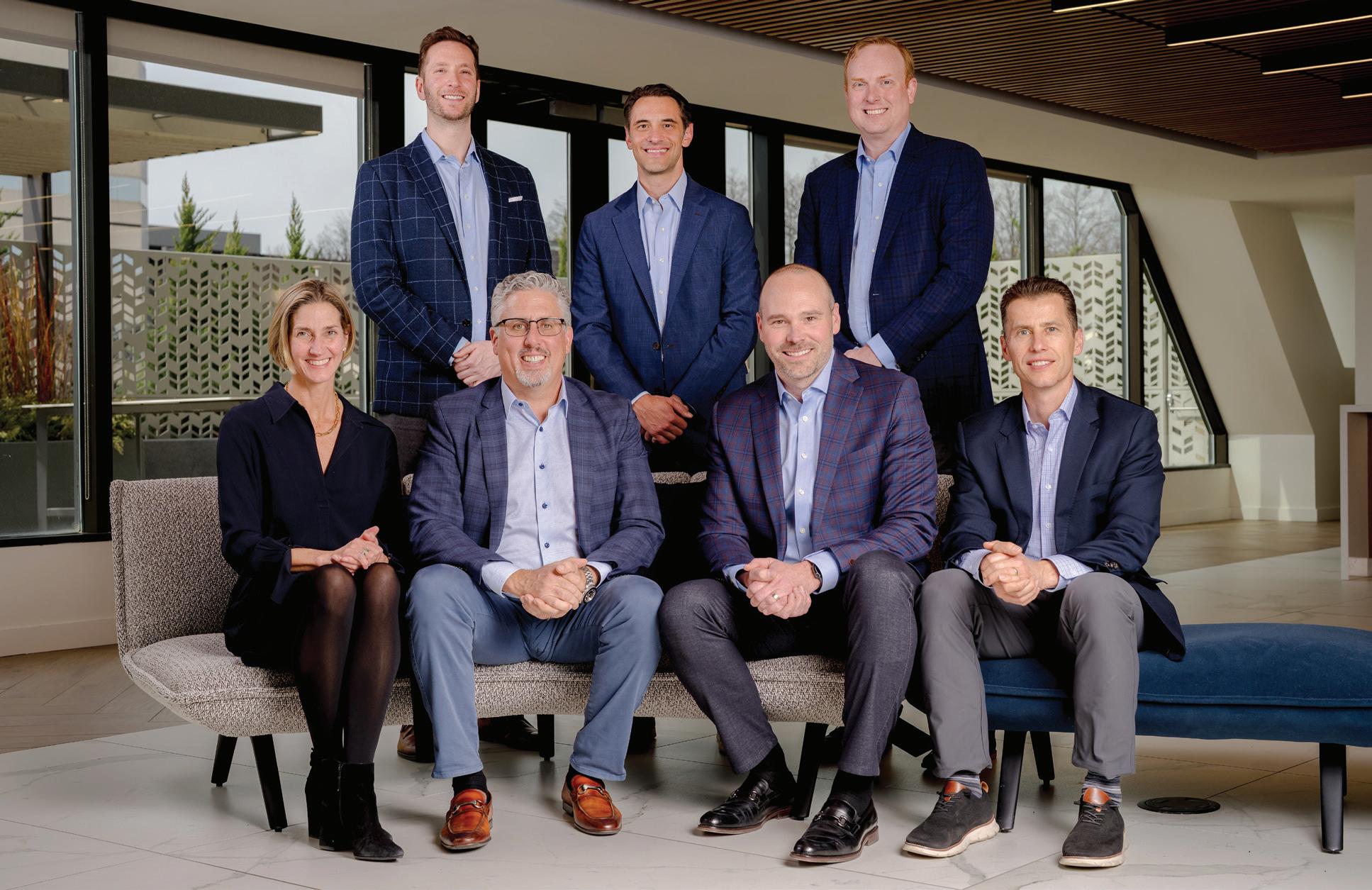
Despite high interest rates, economic uncertainty during a presidential election year, and the prospect of added tariffs, PMCF Investment Banking in Southfield reported multiple transactions in 2024. A U.S. registered broker/dealer, PMCF provides middle-market investment banking services to companies throughout the Americas, Europe, and Asia.
Since its founding 30 years ago, PMCF, an affiliate of Plante Moran in Southfield, reports it has successfully completed financial advisory engagements for a wide array of clients in virtually every business sector, including individual and family-owned businesses, large public companies, and private equity firms.
“Our growth highlights the strength and diversity of metro Detroit’s M&A market, given most of our local clients are global in reach,” says Joe Wagner, a managing director at PMCF, which also has offices in Chicago and Denver. “We advised on lots of headline deals in metro Detroit, but as a firm we’re unique. Yes, we’re investment bankers, but we love taking a longterm approach and working closely with our clients, some of whom we may be outside advisers to or provide advice to their board.”
Last year, PMCF, which has more than 40 employees, advised on five transactions in Michigan, including the strategic acquisition of RPM Freight Systems in Birmingham by Trive Capital and Bluejay Capital. The deal not only saw the new partners align with RPM’s
core values, brand leadership, and growth potential in the transportation and logistics sectors, it allowed the freight company to further facilitate more than 500,000 shipped vehicles across various segments within the finished vehicle logistics sub-segment.
“The deal was extremely impactful for the local auto market, given RPM is a critical supply chain services company to many OEMs that ship vehicles from our region,” Wagner says. “We brought in investors to supercharge RPM’s technology to better meet its overall presence, (which includes) operating in more than 20 countries with nearly 400 employees in the U.S., Mexico, Canada, The Netherlands, and Poland.”
In another transaction, PMCF advised Young Supply Co. in Chesterfield Township in its sale to Atlanta’s Heritage Distribution Holdings, a subsidiary of Beijer Ref in Sweden, a global wholesaler of cooling technology and HVAC and refrigeration systems. As part of the negotiations, PMCF worked to ensure there was fair market value for Young Supply’s 15-plus locations, as well as a more than 230,000-square-foot distribution center the company was building (and has now completed) across 17 acres in Warren.
“The Young Supply transaction was a case of our long-term relationships in the market and the middle-market investment community coming together,” says Matt Jamison, managing director and
president of PMCF. “We brought multiple touchpoints to a multigenerational company that allowed the family ownership to continue as a major distributor was brought in, and without impacting its culture, structure, or legacy.”
In addition, PMCF advised Oakley Industries in Flint, a large provider of tire and wheel sequencing services to the automotive industry, on a management buyout. It also worked on the sale of Besse Forest Products Group in Escanaba to The Hoffman Family of Cos. The deal allowed Besse to expand its reach for sought-after species of hardwoods sourced from northern Michigan and the upper Midwest.
For Pro-Vision in Grand Rapids, a provider of integrated video surveillance and asset tracking technology that was sold to Vance Street Capital, PMCF highlighted its client’s wide range of public safety, commercial, and transit customers around the world.
“There’s a lot of new tech coming in AI automation data-tracking, and Pro-Vision is at the forefront of transitioning from a hardware company to a software company,” Wagner says. “The outcome of the transaction was so successful, Pro-Vision now looks more like a software technology company than a hardware company. Plus, the transaction gave the management team the opportunity to invest in the deal and reap the benefits.”

Following up on a tip from David Alexander, who was on the board of 1-800-Hansons in Troy — a portfolio company of Huron Capital, a middle-market private equity firm in Detroit — Brian Rassel began to research the potential acquisition of an upstart lawncare provider in Mishawaka, Ind.
A partner at Huron Capital, in 2022 Rassel quickly learned ExperiGreen Lawn Care, which offers customized lawn care services and treatments for residential clients, had a dedicated management team that, with a strong partner, could scale the operation. Alexander knew the company well, as he was CEO of TruGreen, a competitor in the lawn care sector.
“Given David was in the space, he saw ExperiGreen had strong recurring revenue, and if we were ever going to get into that industry, it would be a great way to start,” Rassel says. “As it turned out, we methodically put everything in place to acquire and scale the business out of the gate.”
The family owners of Mans Lumber & Home in Trenton, founded in 1900, had been looking at expanding via an acquisition or new construction — but either the timing, the economic conditions, or the logistics never seemed to come together.
“We started looking for a company to buy around 10 years ago, and along the way we bought some property that could have worked for an expansion,” says Doug Mans, president of Mans Lumber. “From there, we did a study that looked at how quickly we could get going with a new facility and when it would be profitable, and we looked at different acquisitions.”
Looking to expand north and west, in 2018 the company reached out to Tom VanEvery, owner of Michigan Timber & Truss Inc. in Flint, to see if he was open to a sale, but for a variety of reasons the deal never came together. Mans Lumber also looked south into Ohio, but quickly determined those growth prospects were limited.
“We researched a couple of acquisitions, but we didn’t hear a lot back — and we never chase a deal,” Mans says.
“But we knew we had to do something, because more and more national competitors were coming into our market and looking to grow. We had to do something or we would lag behind.”
Maintaining a relationship with Mans Lumber, in 2022 VanEvery reached out to Pete Mans, vice president of operations at Mans Lumber.
Founded in 1956, Michigan Timber offers custom-made roof and floor trusses, engineered wood products, timber trusses, laminated beams, wall panels, and other specialty products.
“After going through COVID-19 and supply chain disruptions, everyone in our industry was a little cautious,” Pete says. “We all were seeing rising prices for materials, and the economy was still in recovery mode. When Michigan Timber reached back out to us, the timing was much better on a number of fronts.”
The deal, negotiated over several months, was closed last December. Some of the factors that worked in Mans Lumber’s favor were that Michigan Timber had equipment, a steady supply of customers, and a seasoned team — all of which provided for a
And scale they did. Over a roughly two-year span, Huron Capital closed 19 acquisitions that drove a greater than tenfold increase to EDITDA. ExperiGreen went from a one-stopshop to a juggernaut spanning the upper Midwest, parts of the East Coast, and Canada. The plan, over two years, was to integrate all of the addons into a cohesive unit to be sold.
“Before we started, we wrote down what we wanted to build, and then we stuck to it,” says Rassel, Huron Capital’s investment lead. “There was good buy-in between the management team, the board, and us. That allowed us to run quickly and scale. It was a chaotic two years.”
To speed the evaluation of hundreds of investment opportunities, Huron Capital used a proprietary “M&A attractiveness tool” to quickly review and rank the best prospects based on a geographic area bounded roughly by Minneapolis, Boston, Charlotte, N.C., St. Louis, and Ontario.

“If an opportunity was in Texas, it wouldn’t work based on our plan,” Rassel says. “Once you get out of our target area, there are different grass species that change the equipment component. It also impacts the ability to recruit technicians; we can’t stretch things that far without a lot of extra work.”
Making other changes, ExperiGreen saw its service trucks averaging 16 trips a day, up from 14 trips, while better scheduling and a coordinated marketing plan allowed for crews to service multiple homes in a given area, cutting down on “windshield time.”
Using Huron Capital’s ExecFactor program, Rassel saw growth potential for do-it-for-me outsourcing of home services, and the opportunity to drive better business outcomes with the integration of technology to enhance customer satisfaction, marketing effectiveness, and routing efficiency.
Late last year, Wind Point Partners in Chicago acquired a majority interest in ExperiGreen, while Huron Capital maintained a minority stake.
“There was no intermediary (in the deal); this is a business we were building,” Rassel says. “We knew the sale would likely get a lot of PE interest. We were growing at a rate so fast that we couldn’t keep up with it, so eventually we needed to bring on a partner and get deeper pockets behind it.”

Ashley Gray, managing director of Aquila Equity Partners in Rochester Hills, has always operated in the world of transactions — but not necessarily in a straight line.

turnkey transition that limited risk and added investment capital.
“After the (2008-09) recession, things got tough for Michigan Timber, and they ran a mean and lean ship,” Pete says. “They didn’t make a lot of investments, including technology, so when it came time to share (financial) information, it was a bit tough. But they were a well-known brand like us, and their team and their customers received the (acquisition) news positively.”
He adds Michigan Timber’s skilled workforce and state-of-the-art facilities complement Mans Lumber’s extensive distribution network, allowing for faster lead times and a seamless integration of services. Under the deal, Michigan Timber will continue to operate under its existing name, while expanding its reach through Mans Lumber’s markets across southeast Michigan.
Going forward, Mans Lumber will be able to offer more building solutions, services, and products for builders, contractors, developers, tradespeople, and homeowners.
“It’s taking a little time to get our arms around everything, which was expected, but there were no huge surprises,” Doug says. “It was a very strategic move for us, and it sets us up for the next 20 to 30 years. We may have overpaid a bit, but when you look at the entire picture, we’re in a very solid position.”
With more than a decade of experience across investment banking, advisory, corporate finance, and operations that included stints in metro Detroit and Grand Rapids, Gray, who returned to private equity last year, supports lower-middle market companies across a diverse range of sectors including technology, building products, industrial and field services, manufacturing, business services, and health care.
“Overall, what excites and drives me is helping company founders, and consulting and advising businesses on various growth strategies,” says Gray, who’s a member of ACG Detroit and ACG Western Michigan. “By nature I’m a very curious person, and I like the variety of the deals I work on. What I’ve learned is how important a company’s culture and its people are to success.”
Prior to joining Aquila, Gray was finance director at ArtiFlex Manufacturing, a privately held Tier 1 automotive supplier in Grand Rapids, where she led the company’s acquisition activity, developed and managed business analytics, and managed the firm’s banking relationship and compliance.
“On behalf of ArtiFlex, we acquired an automation company in Spain in the automotive space, and it was my first deal for a company overseas,” Gray says. “There were definitely cultural dynamics. Europe is more slow and is about relationship-building more so than the transaction itself. The deal went smoothly because we brought in counsel who had experience with overseas transactions.”
Prior to ArtiFlex Manufacturing, Gray held a variety of roles in investment banking and corporate development with Cascade Partners, Charter Capital Partners, DTE Energy, and Great Expressions Dental Centers.
Gaining experience working with a large corporation, Gray was hired as a senior strategist at DTE Energy, where she worked with corporate development to find potential acquisitions and helped manage the natural gas company’s decarbonization supply. At Great Expressions, she took on a business development role, and worked on acquiring additional dental offices.
A native of Clarkston, Gray earned both her Master of Business Administration and Bachelor of Business Administration in finance and accounting, with honors, from Grand Valley State University’s Seidman College of Business in Grand Rapids.
While she was working on her master’s degree, Gray participated in the ACG Cup in West Michigan, which served as her introduction to the M&A world. Her all-female team won the intercollegiate competition among business school students from colleges and universities across the nation.
Over the course of her career, she has been involved in more than 35 transactions that, combined, have an approximate value of more than $500 million.
“Earlier in my life, I wasn’t as focused on balancing my professional career and my personal life,” says Gray, who is bringing up two boys with her husband. “As you raise a family, you make time for them. What I’ve learned throughout my career is to focus on what you’re working on and who you’re surrounding yourself with. That’s important to me.”
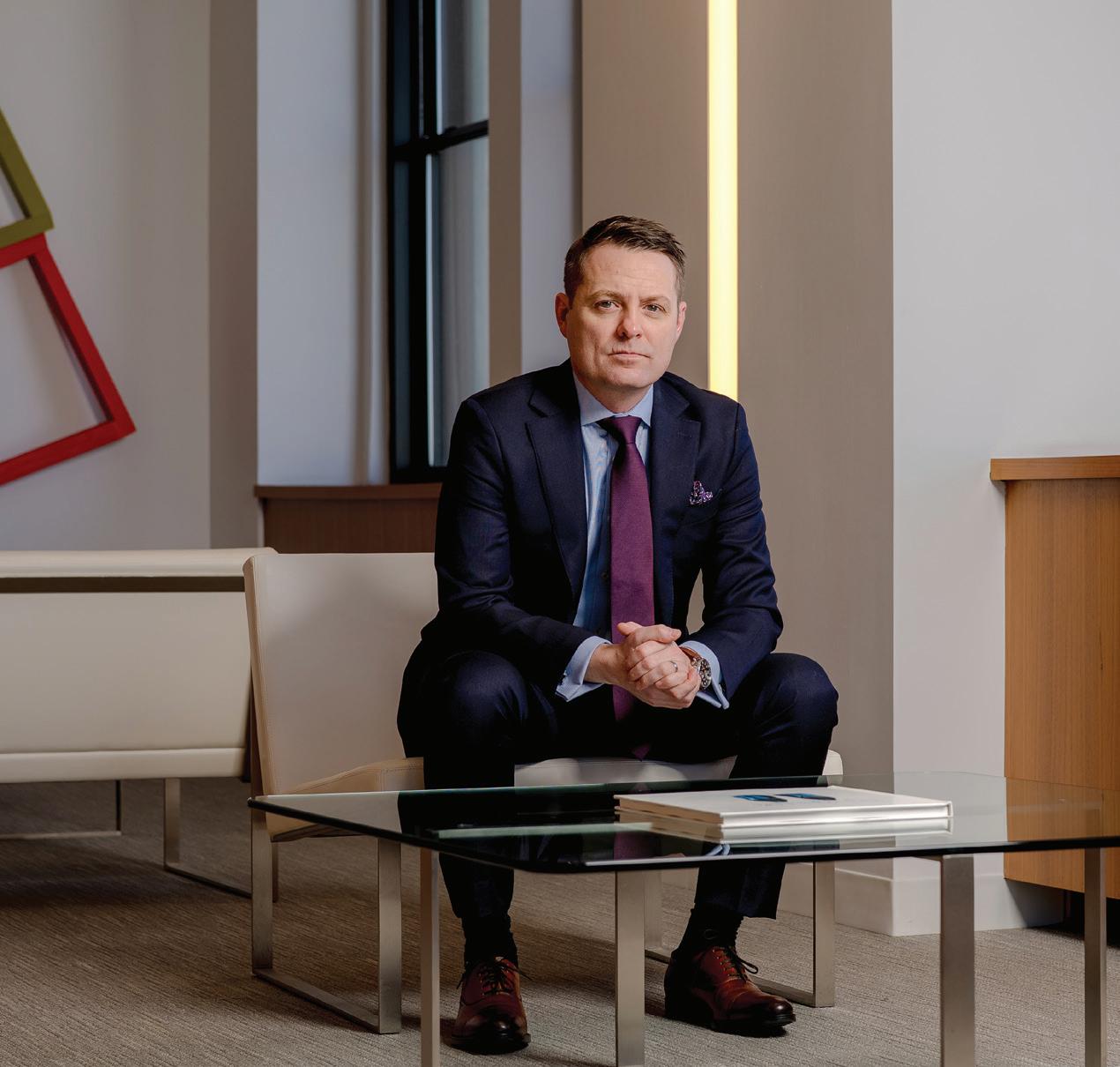
As OneStream Inc. in Birmingham, which developed a custom nance management platform that combines nance and operational data with AI, was preparing for what became a $490-million IPO last July, Matthew R. VanWasshnova, a partner at Honigman in Detroit, worked to close a potential acquisition target prior to the public o ering.
DataSense Software in Rochester, which was founded by four friends who were attending the University of Michigan in Ann Arbor, specializes in bridging the gap between large-scale businesses and data science. In closing the sale, it helped that Data Sense was already working with One Stream on developing AI-enabled solutions in the nance sector.
“ ese four friends at U-M, literally working in their dorm rooms, built up an exciting AI business,” says VanWasshnova, who has represented multiple clients, including many listed on NASDAQ, over a 17-year career at Honigman. “We worked diligently to close the deal on time (last May) — which was pre-equity IPO — with KKR (a majority shareholder of One Stream) and Jones Day (counsel to KKR).”
A 20-year member of ACG Detroit, Michael T. Kulka, CEO of PM Environmental Inc. in Berkley, often said his passion for business spanned two careers. As a co-founder and principal engineer, along with Peter Bosanic, the entrepreneurs turned a two-man operation into a leading environmental risk management rm.
Growing to 12 o ces spanning lower Michigan, Alabama, Mississippi, Tennessee, and Ontario, Canada, PM Environmental was incorporated in 1992. Since that time, it has been ranked No. 1 among its peers in Michigan, while nationally it has been consistently ranked in the top 20 environmental consulting and engineering services companies by EDR ScoreKeeper.
In 2022, a panel of ACG Detroit judges selected PM Environmental’s partnership with Keystone Capital Management for the Deal of the Year Under $50 Million.
For a long time, Kulka and Bosanic, in a bid to expand the business, searched for an investment partner or a strategic merger, and found both.
Two months after closing the deal with Keystone, in February 2023, Pinchin Ltd. in Ontario came into the fold. Today, the expanded enterprise, renamed Pinchin, o ers everything from environmental site assessments to underground storage tank management services.
“Mike was the best business development person you could ever nd, and we’re still trying to ll his shoes,” says Steve Price, vice president and principal of Pinchin. “He was great to work with, he was larger than life, and he was always moving forward. He loved the company, he loved the employees, and he would do anything for them.”
Kulka’s other professional career was serving ACG Detroit. A longtime board member and committee chair, he was, at different periods, part of the membership, sponsorship, or program committees. Last October, Kulka, who had three sons, unexpectedly passed away. He was 56 years old.
“At nearly every ACG Detroit program, and at times on the national and
What made the deal stand out was the fact that Andrew Shea, co-founder and now former CEO of DataSense, is the son of omas Shea, co-founder and CEO of One Stream.
“I’ve never seen that before, so it added a nice family element to the overall transaction,” VanWasshnova says. “ e deal was signi cant because it highlighted two Michigan-based companies that were active in the nance, AI, and technology space. We need to see more of that in Michigan.”
Among multiple deals last year, VanWasshnova and his team provided counsel to Stryker, a large medical technology company in Kalamazoo, on its acquisition of mjPHD’s Fortress product line. As part of the deal, Stryker is now the provider of Fortress, a modular wall system that consolidates construction timelines, allowing for faster operating room utilization as well as expeditated room repairs or modi cations.
In turn, VanWasshnova also worked closely with Huron Capital, a middle-market private equity rm in Detroit, via its Criticore platform, and Albireo Energy on the purchase of Control Engineering, part of Jenco Inc.
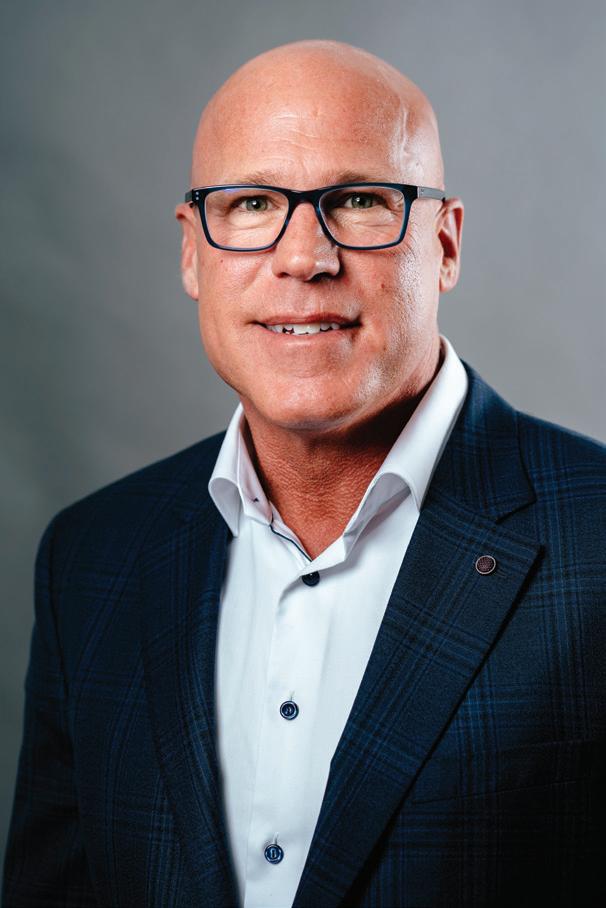
e successful carve-out provided Albireo Energy with two service locations in Arizona, where it already had a presence in the building controls and energy services sectors.
“If one of Huron Capital’s portfolio companies has a transaction, we work on it,” says VanWasshnova, who represents public and private enterprises on a broad range of corporate and securities law matters. “It’s been great working with them, given they’re often ahead of the curve.
“ ey focus more on the human element than other PE rms. ey do a lot of background reports and assessments to help make sure a potential transaction is a good t, and the respective personalities and cultures match up. It was unique at the time they started it, and a lot of PE rms have since copied them.”
In addition to Albireo Energy, last year VanWasshnova led Honigman’s representation of eight other active Huron Capital portfolio companies: Direct Connect Logistix, 1-800 Hansons, Horsepower Automotive Group, InterVision, Ronnoco Co ee, Sunland Asphalt and Construction, TriStruX, and TCK (Twin City Knitting).
“Today, everyone in deal sourcing is focused on nding a great company to acquire, but the deals are harder to come by for various reasons,” VanWasshnova says. “ at means you have to get more creative, perhaps acquire assets that are less known, and look for ways to add value to all the stakeholders.”
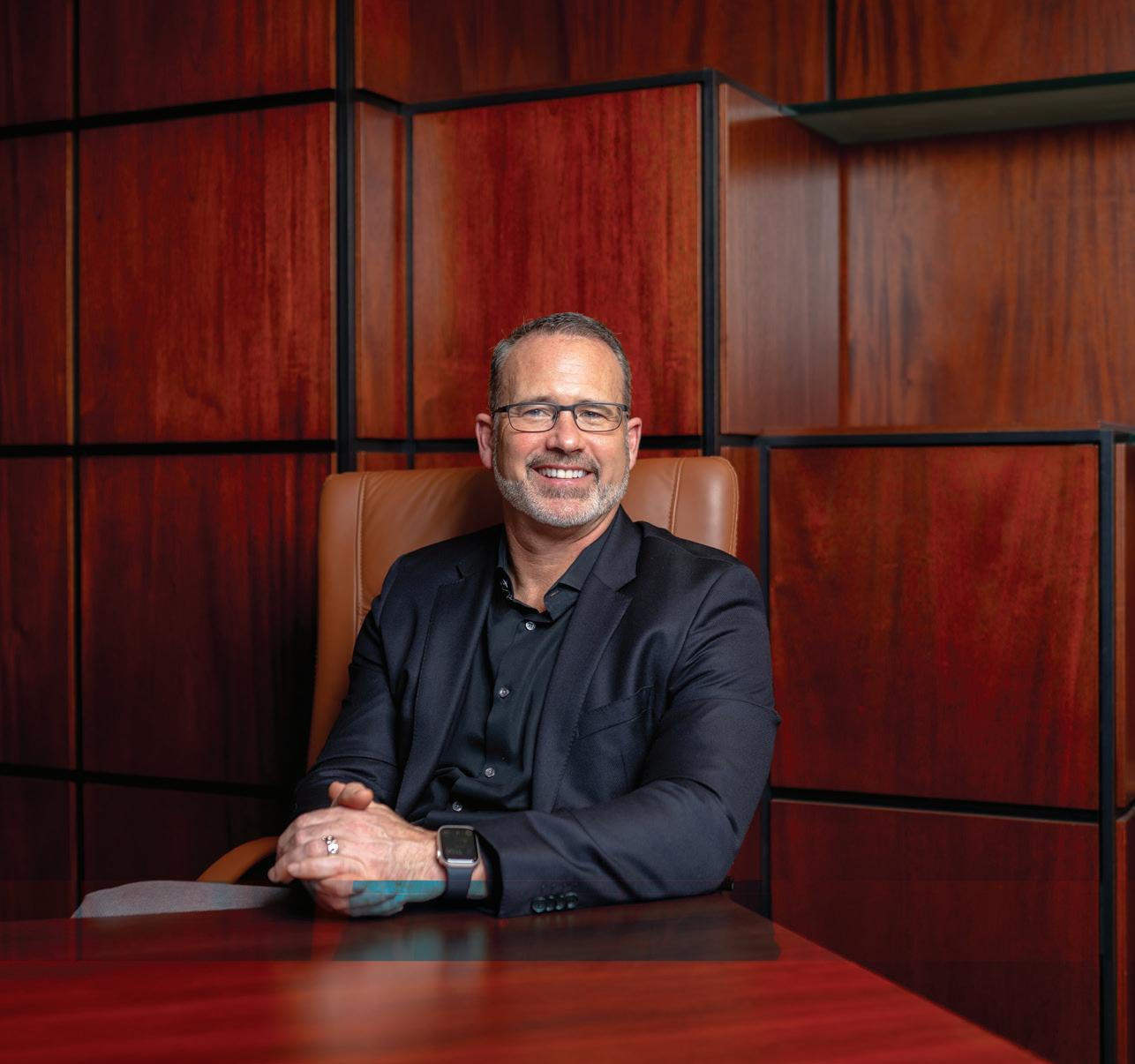
Building and enhancing business relationships are paramount to Christopher Caron, managing director of Blue River Financial Group, a middle-market M&A advisory rm in Bloom eld Township. With more than 20 years of nance and operational experience, especially within the industrial and manufacturing sectors, Caron says everyone, no matter their professional career, is in the “people business.”
international scale, Mike was at nearly every event,” says Christopher Letts, senior vice president and co-founder of e Pine Harbor Group at Morgan Stanley Wealth Management in Bloom eld Hills, and a former president of ACG Detroit.
“He was passionate about growing the middle market in Michigan, and he was passionate about helping entrepreneurs, because he was one himself. Two of his three sons are doing internships in middle-market lending, and his other son is attending Brother Rice High School. He was very proud of his family and their accomplishments.”
Tom Reidy, president of Brother Rice High School in Bloom eld Township, saw Kulka elevate the school’s facilities committee, the rst phase of which was recently completed. With a focus on learning excellence, the project saw the addition of a Center for Learning and Achievement, added faculty spaces, a new locker room, and a new executive boardroom. e next phase is focused on championship athletics.
“Mike truly gave his time, talent, and treasure to Brother Rice,” Reidy says. “He didn’t attend Brother Rice, but he was rooted to his Catholic upbringing, and he loved his three boys and was very proud they were enrolled here. He was very in uential. I wish Mike was here to accept the Lifetime Achievement Award, but I’m sure he knows about it.”
Consider one deal last year where the family that owned AllClear Underground Solutions near Tampa, Fla., personally requested Caron to help facilitate the company’s acquisition of Engineered Spray Solutions in Lakeland, Fla. While the deal was attempted several years ago, it never closed. When circumstances changed, Caron received a call from the owners.
“I tell the people I work with, as well as potential buyers and sellers, that it doesn’t matter the industry you work in, we’re all in the people business, and relationships are so important,” Caron says. “To have the family owners of AllClear call back after rst working with them a few years back was largely due to putting our best foot forward and doing our research.”
Last September, AllClear, a provider of underground water and wastewater infrastructure repair and rehabilitation services, announced its purchase of Engineered Spray Solutions. e deal allowed AllClear, formed in 2022 with the acquisition of Rowland Inc. in Florida, to enhance its capabilities, improve eciency, and broaden its service o erings.
“ e acquisition not only enhances AllClear’s capabilities in providing high-quality underground rehabilitation services, but also strengthens their investment in Rowland, enabling them to o er a broader suite of solutions across key markets,” Caron says.
“With ESS’s expertise in specialized coatings, AllClear is well-positioned to deliver even greater value to municipalities in the Southeast, expanding on its mission to improve essential infrastructure.”
Among other transactions Caron helped consummate last year, Blue River advised Specialty Products and Insulation in Charlotte, N.C., a distributor and fabricator of mechanical and building insulation products and a portfolio company of Incline Equity Partners, on the acquisition of Florida Spray Foam.
Founded in 1982, Specialty Products and Insulation (SPI) supplies 35,000 di erent products across commercial, industrial, residential, marine, and OEM markets that are used in thermal, acoustic, and re protection applications. Florida Spray Foam, a source for insulation material and equipment, o ers spray foam products and a full stock of common berglass, mineral wool, and blown-in material.
“ e transaction represents a strong strategic t, enhancing SPI’s presence and capabilities in the insulation market, particularly in Central and South Florida,” Caron says. “We look forward to seeing the combined entity continue to deliver high-quality products and solutions across a wide range of industries.”
roughout a given year, Caron works with an array of advisers for buyers and sellers including investment bankers, attorneys, accountants, valuation rms, banks, mezzanine lenders, insurance agents, consultants, and more.
“We cover most of North America and primarily the U.S., and (have) a few ventures in Europe,” Caron says. “When we build good relationships with our clients and develop a level of trust, we’re more likely to have fruitful conversations that lead to good outcomes.”
Superlap Drive Studio in Berkley was designed as a franchisor of simulated racing.
BY TOM MURRAY

It’s only fitting that Superlap Drive Studio is located along Woodward Avenue in Berkley, comfortably tucked into historic and familiar surroundings.
The most hallowed — and some say sacred — stretch of road in America has served since its inception in the early 1800s as the epicenter of racing and cruising, first with men on horseback, followed by every manner of mechanized wonder.
Today, the pastime of racing for pink slips is in the rearview mirror due to safety concerns, but cruising has never gone out of style.
From early May, when enthusiasts begin setting up their lawn chairs on both sides of the thoroughfare, to mid-August, when the Woodward Dream Cruise marks the culmination of a summer of cruising, millions of people will have come to pay homage to the main drag of a nation.
“The car culture around here is very much, you know, build your hot rod, cruise Woodward, and drag,” says Dan Cycholl, a Royal Oak native and co-founder, with Jim Hayosh, of Superlap Drive Studio, located on Woodward south of 12 Mile Road.
“My dad was always drag racing and cruising Woodward, so I always loved cars and I grew up around the Dream Cruise, but there’s not as big a culture in motorsports. That’s one of the reasons I was motivated to create a place like this,” Cycholl says.
Hayosh, 50, who is from Grosse Pointe, is a dozen years older than his business partner, but he cherishes the same childhood memories that triggered a lifelong passion for cars and racing.
Two local entrepreneurs and business owners, Dan Cycholl and Jim Hayosh, launched Superlap Drive Studio in Berkley, believed to be the only destination in Michigan for sim (simulated) racing.
“My grandfather worked for General Motors and all family discussions around the table were always about cars,” Hayosh recalls. “My dad always had some pretty cool cars, and he had a lead foot, and he loved every second of it, so I just had it in my blood. I loved it every time we went go-karting at C.J. Barrymore’s. I was only 8 years old, but I took it very seriously.”
What Cycholl and Hayosh have created with Superlap is the only destination in Michigan for enthusiasts of what is known as sim (simulated) racing, a virtual, no-holds-barred experience featuring eight racing modules with software that can be utilized to drive any of 160 different racing cars, from Mustangs and Corvettes to Porsches and Ferraris.
Each driving unit is equipped with wrap-around screens and advanced motion technology that puts beginners as well as seasoned drivers behind the wheel for life-like racing on the most famous tracks in the world.
“The sims retail for around $25,000 each, but they can be a lot more,” Cycholl says. “You can easily spend $50,000 to a hundred grand on them, but as far as the bang for the buck on the experience, immersion, and cost, we think what we produced here is right on the money for our market.”
Both Cycholl and Hayosh have some experience in the cockpit of a real race car. While attending Michigan State University and earning a bachelor’s degree in biosystems engineering, Cycholl cut his racing teeth on tracks like Waterford Hills in Clarkston.
“Waterford Hills is definitely considered a club racing track, just local guys going out on the weekend to their nearest track and racing each other for fun, for a little bit of competition,” Cycholl explains.
As for Hayosh, while he enjoyed those childhood spins around C.J. Barrymore’s go-kart track, he “never really thought to get into racing per se, but as time went on and I had the wherewithal, I started doing some different racing schools around the country, just for fun, and I think I was doing pretty well.”
Perhaps that was because he wasn’t distracted by the serious pursuit of a college degree.
“Name a community college,” Hayosh laughs, when asked which institution of higher learning he attended. “I don’t know why I kept going. I kind of did a little back
and forth in my young years, mostly going to Arizona and running out of money, coming back home and saving money, going back out, coming back, you know. I struggled in school, immensely.”
Then came a brief stint at Arizona State University.
“It was entertaining and fun to some degree, and then I got a job through a friend at a sushi restaurant,” he says. “The owner had an idea of doing a sushi bar that had more atmosphere, play some music, make it fun. So I was serving and we were just crazy busy, and I had no idea what I was doing.”
But Hayosh knew this much: He wanted a piece of the action.
“So I called up my grandpa, and I think I got five grand, and I might even have done a cash advance on my credit card, and next thing you know, I owned a piece of a restaurant. It was wildly successful, and we opened up three more restaurants over the next three years, and then we sold the company to Benihana, and I was still only 26 years old. It was just crazy. It all happened very fast.”
Overall, Hayosh spent 10 years in Arizona, but the latter time became a period of diminishing returns.
“I couldn’t wait to get out of there,” he says. “Those hot summers got really old, and after we sold the company, I had a non-compete clause, and for three years I couldn’t really do anything in the restaurant world, which is all I knew. Then I came back home to Michigan and began looking at spaces for a restaurant.”
That’s when Hayosh met a landlord who had a struggling tenant in downtown Royal Oak. He pitched him on the sushi restaurant concept that had worked well in Arizona, and two years later, in 2007, Ronin Sushi — next to the Royal Oak Music Theatre — was open for business.
“It wasn’t easy, but it was very successful from day one,” Hayosh says. “Michigan had a lot of demand for sushi, and there just wasn’t a lot of supply. I think we hit the right note with what people were looking for.”

I TOOK MY PASSION FOR DRIVING FAST AND STARTED BUYING AND ASSEMBLING SIM EQUIPMENT.”
— JIM HAYOSH
SCREEN TIME
The global racing simulator market is growing as more sophisticated equipment is introduced and social media connects professional racers, gamers, and fans.
Hayosh made what soon became another home run once he opened Commonwealth, a bistro-type eatery in downtown Birmingham, in 2010. As his career as a successful restauranteur blossomed over the ensuing years, he began reflecting more on his racing days of yore, the boyhood spins on a go-kart track, and the promise he showed at various driving schools.
A decade later, in 2020, when COVID-19 spread from China to the rest of the world, he, like everyone else, had plenty of time to reflect.
“I took my passion for driving fast and started buying and assembling sim equipment,” he says. “I’m getting these boxes from England and Germany with all this high-end equipment, and I’m assembling this thing down in my basement, thinking this is the coolest thing in the world.
“And my friends are doing the same thing, and we’re online, racing and talking to each other, and we’re having a blast. Every night, my kids are going to bed and I’m downstairs for hours at a time looking at the clock and thinking I have to go to bed, and knowing I have to stop, but I can’t, like I’m a gamer.”
At some point, Hayosh experienced an epiphany of sorts when he realized life was short. He decided to take his sim driving and casual track days to the next level, and bought a race car.
Hayosh began driving in the Mazda MX5 Cup Series, which is sanctioned in the United States by the International Motor Sports Association (IMSA).
“The series I jumped into is full of insanely talented young kids,” he says, smiling as he shakes his head. “There’s me and a handful of other guys, and we’re all called gentlemen racers, basically because we’re older, right? It is what it is, and I accept it.
“But for a part-time hobby, I’ve been driving successfully for three years and it’s a ton of fun. Had the clock been 30 years prior, this would have been my focus in life.”
In the early days of the pandemic, Cycholl says he also retreated to his basement — but for a different reason than Hayosh.
“My personal motivation to get back into racing had me researching what the latest technology was for steering wheels,” Cycholl explains. “You could buy one for your Xbox, but I knew there was higher-end equipment out there. It’s just hard to find. I started doing the research, and through that I realized a lot of people didn’t have access to this equipment, and I became a dealer for it.”

EVEN WHEN THEY WERE IN THE MIDST of taking all the necessary steps to set up Superlap Drive Studio in Berkley, Jim Hayosh and Dan Cycholl were thinking about the possibilities for the concept far beyond Woodward Avenue.
“Expansion and franchising were immediately discussed between Dan and me,” Hayosh confirms. “My position was, let’s treat this from day one as if we were a franchisee, have a system and answer for anything that could come up, and just make it bomb-proof to operate.
“The idea was for a potential operating partner or franchisee to focus all their energy on the customer experience. It’s how I’ve set up all of my restaurants, and simply how I view all business in my life.”
For such a small footprint, and considering their minimalistic approach, the details were painstakingly obsessed over before opening the doors, Cycholl says. “The customers may not realize it, but all the time and consideration that went into the concept was designed to be felt by them in every way.”
To that end, creating a strong brand for the studio was absolutely essential. In turn, the space itself couldn’t look like a startup — rather, it
had to appear to be a place that was part of something much bigger.
Enter Hayosh, who was very familiar with creating a vibe, thanks to his background in the dining sector.
“Success in the restaurant business depends on the hours you’re open, how many chairs and tables, dealing with carryout — there’s a million moving parts,” he says. “Superlap is such a different animal, but it was the simplicity of the operations, size, and finances that made the idea so intriguing. I said to myself, if we can get this to make financial sense, the operations side is going to be easily manageable in comparison.”
Yet Hayosh offers a word of caution.
“What we’re doing is being done across the country, so, no, it’s not imitation-proof,” he notes. “The goal was always to make a brand that stood above the rest, with better customer service and a better vibe than all the competition, and that’s not unlike my experience with the restaurants.
“No one likes a corporate feel, but there needs to be a sense of confidence in the brand and staff, so everyone can tell they’re in the right spot. Hopefully we’ve done that here, and it’s amazing to have so much room to grow.”
— By Tom Murray
In between racing, friends often gather at small tables to strategize what went right and where there’s room for improvement. Around 25 percent of sim users are in the 10-20 age range.
Cycholl also began trying out the sophisticated equipment himself, and found it actually feels like real racing. “I talked to people about this hobby and invited them over to try it, and then started meeting more people who were also doing it, and it became a stars-align type of thing.”
One of the people Cycholl met was the owner of a local race team.
“I was helping him build a sim for his home, and he asked me to manage and operate the sim for his launch party, which was at the Out of Office Garage in Birmingham,” he says.
“He wanted the people at the party to be able to drive the car, so I set up that whole experience for them. And Jim happened to be at that same party. He’d stopped in to use the simulator, and we chatted a little bit and exchanged business cards.”
That meeting led to Hayosh extending an invitation to Cycholl to check out the sim in his basement.
“In the first few minutes, we started talking about how it would be kinda cool to have a sim center, a place where people could come and compete, and Dan and I saw eye to eye on that right away. I told him I owned a building on Woodward, next to Vinsetta Garage (two blocks south of Catalpa Drive), so we met up there and it was kind of a no-brainer. It just made so much sense, and we put it together.”
Hayosh and Cycholl launched their Superlap Drive Studio in April 2024 with a minimal flourish of advance notice.
“If we could go back, we probably should have done a press release the day we opened the doors,” Hayosh admits sheepishly. “But we also didn’t want to be overwhelmed. I’ve never really opened what I’d call a retail business, per se, so I didn’t know what to anticipate.
“What we’re seeing is similar to what happens with restaurants: Somebody comes in and experiences it, and they show back up with their friend. So there’s a natural growth, but there’s not a restaurant rhythm, where it’s always busy on Friday and Saturday nights. We’ve been open less than a year, and we’re on a great trajectory and happy with the sales.”
Superlap is open daily, and it costs $50 for every hour behind the wheel of one of the facility’s eight sims.
“It’s kinda like a bowling league, right?” Hayosh says. “We’re definitely seeing more men coming in, but we get the typical date nights, which are always fun to see,
and there are a handful of women who want to learn and are excited about getting into motorsports and figuring it out.”
To keep beginners coming back, the entrepreneurs created a progression path that starts with an easier car and track. Over time, more difficult racers and driving courses are added, followed by racing against other people.
Overseeing that process is Jake Rupert, who recently joined the Superlap team. Born and raised in Indiana, the 40-year-old began his career as a driver, “but I took every odd motorsports job I could get while I was racing, and I started to have more fun setting cars up for other people and got more interested in helping them.
“I’d already been building simulation things — software, hardware, racing rigs, and sims — long before COVID-19, and when the trend took off after that, all these racing companies just exploded on the scene, wanting to make Esports teams, or exploring the use of simulation in the training of their drivers.”
Last summer, Rupert was working for an autonomous car company in Ann Arbor when he heard about Superlap.
“I was thinking, OK, it’s another one of those simcade places with a bar and video games, like a Chuck E. Cheese for adults,” Rupert says, dismissively. “But I had nothing better to do, so I decided to check it out. I pull onto Woodward and I’m like, what the heck is going on? It was the same day as the Dream Cruise, which I knew nothing about. So that was an eye-opener.”
Rupert was in for another surprise as soon as he walked into the place. “I felt a completely different vibe. I checked out the simulators, and on that same day I left my resume. A few days later I met with Dan and Jim, and now I’m officially the driving coach.”
That means Rupert can share his driving knowledge with anyone who sits in the cockpit of a sim at Superlap.
“In the simulator, the three screens take up your entire field of view, so it fully immerses you in the car. You’re wearing headphones, so the sound is high-definition, and very cacophonous, and a lot of people even get motion sick because they feel like they’re actually in the car,” he explains.
“If you want to be a good racer, you need to learn strategy — like the proper way to enter a corner, where you need to be looking. One of the things I train is how to look through a corner, not at it. And I can look at the telemetry, or raw data, on the sim graphs and then show someone, here’s how you’re braking, and here’s how a professional brakes.”
What if someone’s not a professional and they take the corner too aggressively, as a first-timer in the sim surely might?
“A major factor in performance driving is weight transfer and tire condition, along with maintaining grip on the contact patch, the part of the tire that touches the surface,” Rupert says.
“Understanding how to control the contact patch, among other factors, is one of the fundamental tools a driver uses to get the most out of a car. A misunderstanding of this mechanic in performance driving can lead to unwanted handling, and the next thing you know, you’re into the wall, and then it’s sky, dirt, sky, dirt.”
Rupert chuckles, but hastens to point out a side benefit for anyone who goes for a spin in a sim.
“They learn techniques on vehicle recovery when the car is getting loose, and you cannot help but to subconsciously use that skill set in a real-life environment, like on a slippery road when the car loses control. They’re able to recover it because they got that training in a performance environment, and were able to apply it in everyday use.”
And where better to apply those everyday skills than on the treacherous potholed and slippery roads that make Michigan winters notorious? That cross-training gets to the essence of what Cycholl, Hayosh, and Rupert are trying to accomplish at Superlap.
“The art of improvement is one of the biggest pieces of racing, and we show you exactly what your throttle and brake pedal and steering wheel are doing,” Hayosh says. “Then you look at your line on the track, and how close you are to the curves, and all those things that add up and can go wrong. But the fastest lap is always the most exciting.”
Hayosh pauses here, seeming to reflect for a bit, then continues, with a smile. “Everyone wants to be the best, so there’s always the hunt for the perfect lap. But you’ll never have the perfect lap. It’s elusive, because on every lap there’s always room to gain, right?”




























The 2025 class of 30 in Their Thirties is expanding businesses and opening new frontiers across multiple business sectors including real estate, health care, food and beverage, manufacturing, retail, and commercial real estate development. Join DBusiness magazine in honoring this year's class at a special breakfast at the International Banquet and Conference Center in downtown Detroit on May 14 from 8:30-10:30 a.m. The keynote speaker will be past 30s honoree Jason Raznick, CEO of Benzinga in Detroit. For tickets, email Maya Stevenson at mstevenson@hour-media.com.














Note: Due to space constraints, for each profile the college listed is the last school from which the honoree graduated.





Profiles by: Ronald Ahrens, Dan Calabrese, Tim Keenan, R.J. King, and Tom Murray










Co-founder and Managing Director
CFOx, Troy
Employees: 15 • Revenue: NA
College: Walsh College
As a senior on the 2009 Birmingham Brother Rice High School golf team, Matt Alessi looked to repeat with All-State honors, and he was a candidate for the Mr. Golf award — Michigan’s player of the year.
Yet he told a local newspaper at the time, “I’m not really sure I’m completely sold on playing college golf.”
It turned out Alessi, who attended the University of Michigan in Ann Arbor, was more interested in a business career. He wasn’t a varsity golfer as a freshman or a sophomore, but won Academic All-Big Ten honors the next two years.
Following graduation, Alessi spent the early part of his career in finance and investment, including positions at Magna International, Stout, Cascade Partners, and Lorient Capital. Along the way, he and his future business partner, Mike DeSantis, an accountant, identified an underserved market.
When, for example, a venture capital firm’s portfolio companies turned over their CFO, controller, or vice president of finance, replacing them was a challenge. “If we found someone good, they were expensive,” Alessi says.
Within that margin of opportunity lay the origins of their business. CFOx, located in Troy, describes its mission as providing CFO, transaction, and accounting services for the middle market. The expertise often comes into play in the skilled areas around a transaction process.
For companies being sold, CFOx gets the accounting and books in shape. For buyers, CFOx sets up finance and accounting systems and procedures, cleans up the books (as needed), and gets the reporting going.
Roughly 75 percent of its professional sta are CPAs who worked at Big Four accounting firms. Alessi says that level of experience helps boost the overall marketing e ort for the company’s services. Being defined “by the quality of our work” has led to slow and steady growth, he says.
“What’s been really cool is to see that network of people we’ve worked with — and people they know — just to see the company organically grow over time.”
After pondering for a while, he adds, “People enjoy working with us because we get the job done. And they trust what we do. We’re very transparent.”
In addition to Troy, there’s a Denver o ce, where DeSantis is the anchor. The partners built everything “from scratch,” Alessi says. With 15 employees, the plan is to double in size sometime next year.
Like playing collegiate golf, keeping “that camaraderie and culture alive” with his current team will be a focus, he says. “I just want people to feel like they’re really making an impact here and helping us.”
— Ronald Ahrens








Honigman, Detroit
Employees: 800 • Revenue: NA
College: University of Michigan Law School
She didn’t realize it at the time, but the career Danielle Bass chose to pursue may well have been launched on the day her mother was supposed to pick her up after school at the bus stop, but didn’t show up.
“My mother had 13 brain tumors, so she was very ill when I was growing up. On that day, I came home from kindergarten to find her having a seizure. I had the wherewithal, as a 5-year-old, to walk in, see something wrong, and call 911,” Bass recalls.
“So the ‘bystander e ect’ isn’t something that exists in my world,” she continues. “I’ve always had the sense of when you see something, you do something.”
That’s not all Bass gleaned from the experience. “It really exposed me to the complexities of navigating di cult systems and advocating for people in need, which instilled in me the deep sense of responsibility to be a problem-solver — which I now see, as a lawyer, with my niche in technology transactions.”
A partner at Honigman in downtown Detroit, Bass is a rapidly rising star at a law firm renowned for being a powerhouse in the private equity space.
“The work I do in technology transactions, and particularly media and entertainment, is atypical of a firm in metro Detroit,” she says. “I’ve helped elevate Honigman’s expertise here to a national level, making them and Detroit a destination to provide clients with the same sophisticated counsel they might expect from top firms on the coasts.”
Beyond her legal practice, Bass handles extensive pro bono work. She also serves as the 2025 president of the Detroit chapter of the Association for Corporate Growth, part of a global M&A community that works with middle-market firms.
In addition, Bass is a lecturer for two courses in technology transactions and transactional drafting at her alma mater, the University of Michigan Law School, as well as the University of Chicago. Her time at U-M is particularly ironic for Bass.
“It’s so funny. I teach at Michigan, but I was rejected from the law school three times,” she reveals. “I ended up going to Wayne State at night for my first year of law school, while I worked full time at a consumer protection law firm. Then I applied to U-M as a transfer student.”
The revelation prompts Bass to spin around from her desk and gesture toward the wall behind her.
“That’s my rejection letter from U-M right there, next to my Order of the Coif, which means I graduated in the top 5 percent of my class.”
Unfortunately, Bass lost her mother last year. “She ended up dying from cancer, which is a testament to just how resilient she was.”
It’s a quality her daughter clearly inherited. “Every day when I walk by my rejection letter, it’s a reminder that you don’t always win the first time, but you can try really hard to do really hard things. The idea of professional and personal resiliency really drives me.”
— Tom Murray










Assistant City Manager, Director of Economic Development, City of Wixom, Wixom
Employees: 80 • Budget: $15.7M
College: Oakland University
Drew Benson emerged from his undergraduate work at Western Michigan University in Kalamazoo with a double major in public relations and behavioral science, and was presented with an immediate opportunity.
He began providing public relations services for college sports teams, first at Oakland University in Rochester Hills and later at the College of Charleston in South Carolina.
There was only one problem.
“I liked the work, but it wasn’t really sustainable as a career,” Benson says. “I came back and Oakland University o ered me a graduate assistantship, because they didn’t want to give me actual money, but I had to get into a grad program.”
He chose to pursue a Master of Public Administration degree, which facilitated the assistantship and ultimately led to an internship with the City of Rochester. While Benson harbored no long-term designs on local government work, he was beginning to find a viable career path where he could actually use what he had learned at WMU.
“It really does come together,” Benson says. “Economic development is called a team sport, and it really is. You have to be able to communicate.”
After holding positions with the municipalities of Oxford, Troy, and Clawson, Benson secured the role of assistant city manager and director of economic development for the City of Wixom in 2021. This position presents a distinct challenge for an economic developer, as Wixom’s tax base relied for five decades on a massive Ford plant that closed in 2009.
Working on the redevelopment has been one of Benson’s top priorities, and he has achieved considerable success.
“Of that 325-acre property, two-thirds has been redeveloped and it’s fully occupied and fully leased out — 1.4 million square feet of light industrial distribution space,” Benson says.
As part of his work, Benson and the city’s Downtown Development Authority are recreating an urban core. It’s a vision rooted in history, as the city once had a downtown before it was lost to a fire in the 1920s.
“It takes time, and it takes compromise,” Benson says of the process.
“Economic development is really government’s closest intersection with the private business world, and there are often di erent outcomes, expectations, and understandings of the world.
“Every community says they want a nice, walkable area with all kinds of cute shops where people can buy things. But if you talk to any business owner, they’ll tell you retail is incredibly hard, and people don’t buy as many things in person anymore.”
Working with volunteer boards, commissions, and community members is critical to the success of every economic development e ort, Benson says.
For inspiration, he looks to Nik Banda, city manager and economic development director in the City of Rochester, where Benson had an internship. “I was inspired by the work he got to do, and my goal was to get a role like this.”
— Dan Calabrese








Principal
Beringea, Farmington Hills
Employees: 6
Assets under management: $700M
College: Princeton University
Ben Bernstein, principal at Beringea, a venture capital firm in Farmington Hills, endured a baptism by fire. He graduated from Princeton University in 2008 with a degree in economics and joined UBS Investment Bank in New York as an analyst right when the financial crisis hit and the banking and investment world, especially in the Big Apple, was crumbling.
“That experience was certainly scary, and I wondered if I chose the right industry,” Bernstein, a native of Los Angeles, recalls with a chuckle almost two decades later. “But it was helpful because I got to see what really makes these places work, and where we need to focus our e orts and cut costs. And those lessons gave me insight into what really matters. It wasn’t just about my job. It was about the health of my group, my business unit.”
Bernstein couldn’t have predicted how stressful the business world could be during a financial crisis when he first started getting interested in business while participating in monthly Saturday workshops at the UCLA Anderson Business School. It was a program funded by former Los Angeles Mayor Richard Reardon.
High School Reardon Scholars, as they were called, received a basic introduction to business concepts and listened to talks by mentors representing di erent areas of business including investing, banking, and other disciplines.
“That was my introduction to the world of business,” Bernstein says. “That’s what set me on the path. I came to believe I could be good at business, and it was interesting enough to try to make a career out of it.”
The path included five and a half years as an analyst at UBS, followed by a two-year stint at the Partnership Fund for New York City; its goal is to maintain New York as a hub of innovation. While in that position, he was involved in the early stages of Newlab, which began in Brooklyn and now has an outpost at Michigan Central in Detroit’s Corktown district.
Between 2016 and 2018, Bernstein worked for a couple of startups in New York before moving to Ann Arbor with his wife and young child.
He spent a year working on various investments before joining Invest Detroit Ventures as a principal. There, between 2020 and 2022, he managed the organization’s new investment pipeline and due diligence process, completing more than 20 new deals.
Now at Beringea, Bernstein is responsible for investment sourcing, financial modeling, industry research, deal execution, portfolio management, and fundraising due diligence.
In addition, he’s a board observer to three companies, and serves as a board director for TechTown Detroit as well as the Michigan Venture Capital Association. His future goals are to help Beringea grow, to invest in the next great Michigan software unicorn, and to continue working hard.
“My parents taught me work ethic more than anything else,” he says. “I know no other way.”
— Tim Keenan








Executive Vice President, Strategic Partnerships and Business Development
Charlton, St. Clair Shores
Employees: 100 • Revenue: NA
College: Mott Community College
Wayne Coulman began his career at Charlton in St. Clair Shores, a global outsource sales agent for automakers and suppliers, as a sales director. He made a positive impact almost immediately, bringing in one of the largest accounts in the history of the company — a Tier 1 auto supplier in Auburn Hills.
By his third year, he was the top sales performer globally, and earlier this year he was promoted to his current position, overseeing all of Charlton’s strategic customer growth initiatives. That’s pretty impressive stu , so it’s startling to hear Coulman reflect on his mindset right before he joined Charlton.
“Nobody should have hired me; I just didn’t have the resume that warranted (founder) Chris Charlton to bring me on,” he asserts.
But Coulman had something else that was far more important than what his resume reflected.
“One of my good friends and mentors would always talk about work ethic and creating your own luck, and also getting yourself in the room with people that you need to connect with, right? I’ve always had the ambition and the attitude that I can do whatever I set my mind to, and maybe that comes with my sports background.”
Coulman is modest. In his early 20s, he was a competitive bodybuilder, which requires far more determination and focus than most sports.
“The exercising is one thing, but it’s mostly what you do the other 22 hours, when you’re not in the gym. It’s the food and the sleep, and not going to a party and drinking. It’s that dedication and tunnel vision.
“I trained for four years to be in the best condition and shape and muscularity that I’d ever been. And you’re trying to peak just for those few minutes when you step on the stage.”
Coulman peaked at the right time, in his first show — one of the biggest in Michigan.
“There were about five weight classes with over 100 competitors. I won the light heavyweight class, and then I also won the show’s overall title. My passion was to become a professional, but then I decided to just really focus on my career and I got passionate about being successful in business.”
Coulman’s can-do attitude is very much an asset.
“I try to look at the glass as half full, right? We have companies in our portfolio that are going to be very a ected by these tari s, so how do we mitigate that risk? I told my team we need to be doubling down, and pushing extremely hard with North American manufacturers to make sure we're adding value.
“A lot of these OEMs and Tier 1s are now going to be scrambling to find local resources to make these parts, and they’re not going to be buying them from China, Korea, or India, so there’s going to be a lot of opportunity.”
— Tom Murray








Chief Public Spaces O cer
Downtown Detroit Partnership, Detroit
Employees: 52 • Budget: $42M
College: American University
Adozen years ago, David Cowan, a Detroit native, was living in Washington, D.C., and making wedding plans with his fiancee.
A graduate of Wayne State University in Detroit with a bachelor’s degree from the College of Fine and Performing Arts, Cowan moved to the nation’s capital, where he earned a master’s degree in arts management from the College of Arts and Sciences at American University.
“I grew up in Detroit between Seven and Eight Mile roads, and (my fiancee was) from Grosse Pointe, and we were like, OK, it’s too hard to manage what we want to do from D.C.,” Cowan says. So the couple decided to go back home for a couple of weeks and figure it out.
Back in his hometown, he squeezed in a meeting with Eric Larson, who’d only recently assumed the role as CEO of the Downtown Detroit Partnership, a nonprofit civic agency. Soon after, in 2016, Cowan was appointed director of public spaces/programming.
“The downtown that I knew as a kid has completely transformed from one of the most depressed in the country, through the underdog narrative we were pushing 15 to 20 years ago, to the fact that Detroit’s now a competitive city,” Cowan says.
To drive the point home, he reaches behind his desk for that memorably depressing issue of Time magazine from October 2009 with the cover headline: “The Tragedy of Detroit.”
Fast-forward to this year, when Time listed Detroit among 50 of the world’s greatest places. Soon after, The New York Times named the city one of the best places to go in 2025, while Travel + Leisure selected the Motor City as one of its “50 Best Places to Travel.”
It all presents a unique challenge for Cowan.
“How do we keep that going? Because we only have so much space, especially in the core downtown. It’s a good thing, but it’s filling in. Other than the Renaissance Center project, there’s very little left to transform and redevelop.
“So, how are we using that space? How are we growing to the point where we’re not boxing ourselves out? That’s something I think about a lot.”
It’s all part of the job for Cowan, who oversees a multimillion-dollar budget and more than 1 million square feet of public spaces.
Overall, Cowan has collaborated on more than 2,000 annual events, working with 40-plus corporate partners, sponsors, and 250 community organizations. He was named chief public spaces o cer in May 2021.
Of all the events he’s worked on, last year’s NFL Draft in downtown Detroit is among the most memorable.
“It was the busiest week of my life,” Cowan says. “After that, the City Council not only approved an extension of our longterm agreement of managing six parks, but added 12 additional spaces to our responsibility and management. Nothing tells you you’re doing a good job like (someone saying), Here, take some more work.”
— Tom Murray

Director of Business Development
Walbridge, Detroit
Employees: 1,500 • Revenue: $6.1B
College: Grand Valley State University
Chris Cryer, director of business development at Walbridge in Detroit, a construction management, engineering, and real estate services firm, says he wants to continue being a “piece of the puzzle” in a company that has seen quick growth over the past five years.
The general contractor, which has clients in manufacturing, hyperscale data centers, defense, higher education, health care, and government, increased its revenue to $6.1 billion in 2024 from $1.5 billion in 2019.
Cryer, a native of Fenton, focuses on the automotive sector, but his path to construction industry management was less than a direct road.
After studying hospitality business and management at Michigan State University, he transferred to Grand Valley State University and graduated in 2017 with a degree in marketing, sales, and management.
He had an accounting internship with PVS Chemicals, followed by an account management internship at Diplomat Rx before landing a program management internship at Magna Mechatronics, a division of auto supplier Magna International. That became a full-time job upon graduation, and he worked on automatic deploying sideboards for GM pickups
From there, Cryer transferred to Magna Exteriors as an account manager working with Nissan and electric vehicle startups. In February 2020, he decided to switch gears and joined Walbridge, the month before COVID-19 hit.
“I expected to get furloughed or laid off,” Cryer recalls. “Construction projects were on hold. Thankfully our work was deemed essential, and that allowed me to return to work after two months.”
In his current position, Cryer oversee new business development and manages key accounts, including General Motors and electric vehicle startups.
Projects he has been part of include GM Design West Studios in Warren, one of 36 projects at the GM Technical Center campus.
Walbridge also has supported the conversion of four GM assembly plants from internal combustion engine assembly to electric vehicles, including Factory Zero in Hamtramck, Orion Assembly in Lake Orion, and plants in Spring Hill, Tenn., and Mexico.
“For GM, I’m at the sites quite often,” Cryer says, citing his company’s philosophy. “We wear a lot of hats, and we stay with the job from beginning to end. (It’s) total ownership.”
Cryer sees a long future at Wallbridge in a leadership position. “I want to lead people,” he says. “I have a strong desire to do that, and it’s a challenge to manage people.
“I see myself with a long-standing career at Walbridge. I strive to make an impact, like those who have been here for 30, 40, 50 years, supporting the enterprise to diversify.”
— Tim Keenan
Partner Michigan Air Products, Troy Employees: 90 • Revenue: NA College: Michigan State University
As a third-generation member of Michigan Air Products in Troy, a manufacturer’s representative for commercial and industrial HVAC solutions, Jillian Joliat Dare was presumably destined for the executive suite.
But she’s quick to explain that wasn’t the case for the family-owned firm founded more than 50 years ago.
“Growing up I was always around the business, but I wanted to do my own thing, and I thought at one time I might want to be a teacher,” she says. “I always loved math and science, which led me to choose mechanical engineering as a career path. But then I moved out of state and worked at Accenture, in management consulting.”
The job was a great fit for Joliat Dare — but, she emphasizes, not as a career.
“I loved the challenge, I loved the pace, and I was surrounded by so many smart people, and I loved the idea of having new clients all the time,” she says. “But it got to the point where I really felt like everything was very theoretical, and I missed being part of a tangible product and building something.”
Which is when Joliat Dare reached out to her father.
“I asked if I could have an internship,” Joliat Dare recalls, “and he said, You’ve been working for five years, so I’ll hire you for an entry-level role. I started as an estimator, and absolutely fell in love with it.”
Nowadays, as a partner in the company, Joliat Dare is focused on providing more value and service for her customer base, all while playing a significant role at the forefront of business development.
“Our sales team is calling on engineers and trying to get equipment laid out and specified,” she says. “Our focus is anything from a small coffee shop to a hospital to a battery plant — any sort of commercial or multifamily space.
“I really feel like I’m a part of building our communities in Michigan, and when those projects come out to bid, I’m working or reviewing or helping, advising our estimators, and making sure our quotes are thorough and accurate.”
As to the question of family succession at the company, Joliat Dare smiles and shrugs at the mere notion.
“My children are 5 and 7. One wants to be a professional football player and one would like to be a dancer, so I have a long way to go,” she explains. “But I never felt any pressure at all, and I would never want to put that on my kids.
“A family business is incredibly important, and I’m very passionate about it. But you have to have the desire and love what you do. Otherwise, what’s the point, right?”
— Tom Murray
Partner, UHY, Detroit
Employees: 1,612 • Revenue: $349.7M College: Western Michigan University – Haworth College of Business
In 2020, following nearly six years at PwC, Alex DiBartolomeo joined UHY in Farmington Hills as manager of a new opportunity akin to a startup.
“I was moving up well at PwC, and then there was an (external) discussion of starting a quality of earnings practice at UHY,” DiBartolomeo says. “PwC was fantastic, and UHY was an opportunity to build something from scratch.
“It was the right time to make the move and build something new. It was challenging at first, but I stuck with it. Looking back, I’m happy I made the move.”
One memory of PwC is spending several months in India, where he helped develop an offshores team. Overall, DiBartolomeo has spent more than 10 years delivering buy-side and sell-side financial due diligence/quality of earnings services for public and private enterprises, as well as private equity funds.
“Building my career, I’ve really learned how to problem-solve, find the right answer, and also look at the wrong answer and understand everything,” says DiBartolomeo, today a partner of UHY’s transaction services practice. He’s also a licensed CPA in Michigan.
Growing up in Troy, DiBartolomeo attended Troy Athens High School and “pushed shopping carts and bagged groceries” at Nino Salvaggio International Marketplace in Rochester Hills.
During one summer as an undergraduate student at Western Michigan University’s Haworth College of Business, DiBartolomeo was part of the grounds crew at Oakland Hills Country Club in Bloomfield Township.
“I was starting at the bottom, and pushing carts and bagging groceries made me realize what to do and what not to do,” he says. “I knew when I was a junior in high school that I wanted to get into accounting.
“What I remember from Oakland Hills was that summer was a lot of fun. One thing that struck me was some of the grounds crew were the happiest people I met. They made a good living, and they moved back to their families in the off season. They enjoyed a simple life.”
During college, DiBartolomeo undertook two internships at Stryker and one at PwC, which led to being named an associate specializing in private company services in assurance.
“My dad (Rick) was a partner at Deloitte, and I remember coming downstairs when I was younger and having like multiple bowls of cereal, and my dad would come in dressed up in a nice, suit, a nice shirt, and a tie. That can’t help but inspire you to work hard and have the nice things in life.”
— R.J. King
Founder and CEO
Firefly Drones Shows, Firefly Drones Systems, and Aerial Imagery Works, Auburn Hills
Employees: 35 • Revenue: NA
Kyle Dorosz is one of the fortunate people who was able to turn his hobby into a successful business.
Dorosz’s father introduced him to remote-controlled cars and planes when the Troy native was a youngster. As a student at Brother Rice High School in Bloomfield Township, he affixed a camera to a quadcopter (now called a drone) and began posting aerial pictures and videos online.
Soon after, companies were paying him to film events, commercials, and other subjects. He used the proceeds to invest in bigger and better equipment.
Business really picked up when the Oakland County Sheriff’s Office stopped him from using his drone to film the 2013 Woodward Dream Cruise, and a short time later requested that he build them a drone for their SWAT team.
“That was kind of when it became a fulltime job for me,” Dorosz says.
That job became Aerial Imagery Works, which provides aerial photography and video services. Among his credits are the film “White Boy Rick” and several music videos.
Compared to his small quadcopter, the drones used for movie shoots have four, 3-footlong propellers, weigh 55-60 pounds, and can carry a 25-pound, $100,000 camera system.
But, according to Dorosz, that wasn’t scratching his creative itch.
“The aerial business was, and is, doing well, but I was buying drones and that’s not what I’m passionate about,” he says. “I like designing and building things, so I started looking for other things I could do with drones.”
Dorosz says he was inspired by the 200drone show Intel produced at the 2017 Super Bowl. A couple of months later, he did his first 20-drone show in a test field.
Last year, Firefly Drones Shows did more than 200 drone shows across the country. Most shows feature 300 to 500 drones, but he also does shows with as few as 100 drones and as many as 1,000 or more flying objects. Most shows start at $20,000, he says, and can go up into six figures for large productions.
That operation gave birth to Firefly Drones Systems, which sells complete drone show systems.
“Most of our systems customers are entrepreneurs who want to start their own drone show company in their region,” says Dorosz, who adds that the revenue mix between the shows and the systems is about 50-50 currently, although he expects the systems side to eclipse the show side in 2025.
“It’s growing bigger than I ever imagined when I started it, and I’m really excited about where it’s going,” Dorosz says. “I want to make our system even more entertaining, safe, reliable, and easier to use than it is today, to get it into the hands of more people.”
— Tim Keenan

CEO Ferlito Group, Detroit
Employees: 30 • Revenue: NA College: Wayne State University
“Ididn’t know anything about anything,” says Michael Ferlito, CEO of the Detroit-based Ferlito Group, about his knowledge of the family business when he was hired in 2010. “I learned a lot very quickly.”
The Ferlito Group consists of property management, construction, and development operations as well as a self-storage business. In addition, Ferlito is co-founder and CFO of Bamboo Detroit, which rents flexible work spaces.
Ferlito, who had just graduated from Northwood University in Midland with a degree in entrepreneurship and economics, joined the Ferlito property management part of the business on a part-time basis while pursuing his MBA at Wayne State University.
A product of De La Salle Collegiate High School in Warren who grew up in Clinton Township, he jumped into the family business full time on the construction side in 2013.
“I learned construction when my dad threw a set of plans on my desk and said, You’re going to be project manager for this 5,000-square-foot buildout for a school at a medical institution,” he recalls with a chuckle. “I tell my friends who studied this stuff in college that I learned about real estate development on the street.”
At the time, Detroit was emerging from the Great Recession and the Ferlito Group decided to focus its energy on development in the city. “Once development started heating up again, I fell in love with it,” he says.
The notable projects in which Ferlito has been involved include the Shewolf Pastificio and Bar in Midtown, Casa of Cadillac Square, the former Mannequin Building on Brush Street that was turned into loft-style office space, a mixed-use building called The Seldon, The Eleventh in Corktown, The Alexandrine in Detroit, and the former Cheli’s Chili across from Comerica Park. He also is working on the new Detroit PBS facility on Piquette Street in Detroit’s New Center.
Ferlito was named CEO of the company in 2019, when COVID-19 put a damper on the smaller developments going on in the city of Detroit. His father, Tony Ferlito, started the company in 1980.
“My dad loves putting on the boots and getting in the mud, and my strengths are in vision and leading what comes next,” Ferlito says. “We needed to pivot and go in a different direction after COVID-19, and he wanted to put that on me.”
With the younger Ferlito at the helm, the company started looking outside the city. Opportunities in Ferndale and Oak Park soon came to light.
“We’re developing a lot of multifamily workforce housing in Oakland and Macomb counties,” he says. “We’re focusing a lot on how we get heads in beds in new housing developments that don’t cost $4,000 a month. We’re working with municipalities that understand that their teachers and police need places to live.”
So what's next for Ferlito?
“The future is going to be in workforce housing and figuring out a way to build sustainability with housing projects,” he says. “Detroit will recover. Michigan will recover. But the future is getting people in affordable housing.”
— Tim Keenan
President
Foster Financial Co., Detroit
Employees: 35 • Revenue: NA
College: The Wharton School
When he was 10 years old, after running lemonade stands and cutting lawns, Brad Foster launched Brad’s Computer Service in Grosse Pointe.
“It started out as a hobby fixing computers for family, friends, and neighbors, and the nickname was BCS, which I didn’t like too much, so during class in middle school I thought of some cooler names and came up with Spark Force,” Foster says. “After (it) got going, I hired someone to run things.
“In those days, it was cheaper to repair computers than buy a new one. From there, I looked to take it national, and I partnered with robotics and computer classes in high schools. That’s how we franchised it.”
The business grew to include around 30 student operators. Using some of the profits, during his freshman year at The Wharton School, where he earned a degree in economics, Foster acquired a boutique hotel in Costa Rica called Castillo de Pavones. It offered eight suites and a bar/restaurant.
“I always liked the notion of getting into real estate, and my friend’s cousin and his girlfriend ran the place, but five months after I bought it, the place burned down. I spent two years rebuilding it, and in my senior year I sold it,” Foster says. “It was my crash course in business.”
Soon after, while still in college, the entrepreneur acquired a small office building in Grosse Pointe where he could hang a sign. There were nine office suites, and Foster quickly leased out the remaining space. At the same time, he looked at developing small condominium projects in the Grosse Pointe area, but he couldn't get the projects approved.
“After that experience, I decided we shouldn’t be chasing big developments, and I began to concentrate on cash flow,” he says. “I bought some more smaller office buildings in Grosse Pointe and started a construction company out of necessity.”
After leasing and building out the spaces, Foster acquired Central Park Plaza, a 130,000-square-foot office building in Southfield. He followed the same path — fixing up the property, securing tenants, and building out the office spaces. Along each step of the way, he found an investor, leased out the space, and took out a bank loan to pay off his capital partner.
In January 2020, he went big and submitted an offer for 211 W. Fort, a 28-story, 450,000-square-foot office building in downtown Detroit. Able to extend the due diligence phase due to COVID-19, he closed on the property that October. After filling most of the building, adding a restaurant, and redesigning the lobby, he sold it in 2023 for “a healthy profit.”
Last year, Foster acquired Lahser Center in Southfield, and quickly added more office tenants and a charter school, Crescent Academy.
“It’s been an amazing ride so far,” Foster says. “My next project is to launch a hospitality company and do entertainment and restaurants. I’m looking for something more fun.”
— R.J. King
Co-founder and Principal Piquette Partners, Detroit Employees: 46 • Revenue: NA College: University of Michigan
While working as a desk manager at the Days Inn in Ypsilanti during the time he was attending the Ross School of Business at the University of Michigan, Tarun Kajeepeta said the ebb and flow of guests foreshadowed an interest in brick-andmortar hospitality.
“I got to understand all the motivations people have to rent rooms, whether based on visiting with family, price, or a vacation,” says Kajeepeta, who’s now a co-founder and principal of Piquette Partners in Detroit. “Over time, I learned how to excel at delivering what guests needed at the right time.”
Following graduation, Kajeepeta was hired as an associate at Boston Consulting Group and moved to New York City. Over a four-year period when he was working with financial service clients, he spent eight months in Australia and three months in India.
“BCG helped shape me, and I learned how to think critically and break things down into components, all of which I lean on today as an entrepreneur,” he says. “At the end of 2014, I came back to Detroit and worked another three years at BCG’s Detroit office.
“I gained a lot of experience, and (in 2017) I was ready to try my own thing. I was passionate about contributing back to Detroit, whether launching a startup or doing brickand-mortar. That was on my bucket list. Rather than getting an MBA, I tried a bunch of things I was interested in.”
In 2017 he launched Condor in Detroit, a car subscription service where users could book a car and have it delivered to their door. A cross between leasing and rental, the service was available on a monthly basis.
“We got good traction, and I sold it a year later,” Kajeepeta says. “When I reflect on the experience, it was a customer-facing element that changed people’s lives, and that helped inform my pivot to hospitality. I also was passively investing in other deals.”
In early 2021, he and a group of partners opened Shelby, a cocktail bar, in what was a dilapidated bank vault in downtown Detroit. Last year he introduced Leña, a restaurant specializing in Spanish cuisine, in the Brush Park neighborhood, two blocks west of Little Caesars Arena.
Next up is the restoration and development of a 25,000-square-foot former loft warehouse at Bagley and 14th streets, just east of Michigan Central, Newlab, and the Southwest Greenway. It will offer 14 apartments and 10,000 square feet of retail space when it opens in the summer of 2026.
“We’re rebuilding portions of the façade with steel reinforcements, and with Tanner Waterstreet and Don Tappan (I’m) going to create a food-and-beverage hub on the ground floor,” Kajeepeta says. “I’m also in the early stages of working with Devon Caldwell on a cocktail bar along the West Vernor Corridor. That actually might open this year.”
— R.J. King
Principal, Oxford Capital Group/ Oxford Hotels and Resorts, Detroit Employees: 15/1,000+ • Revenue: NA College: University of Michigan
When Matthew Kalt graduated from U-M's Ross School of Business, he settled into a Chicago-based analyst job at Oxford Capital Group, where he learned about sourcing deals, bringing together partners, and helping to manage the company’s assets.
But the Franklin, Mich., native, who had attended Detroit Country Day followed by the University of Michigan, longed to return home
In 2021, as the challenges of COVID-19 began to shift in a more positive direction, he returned to metro Detroit while continuing to work with Oxford remotely. It was during this time that Kalt began assembling transformative deals, playing a key role in reshaping Detroit and its surrounding communities.
The most significant deal was the Westin Book Cadillac Hotel in Detroit, originally built in 1924 and a destination for business executives, sports teams, movie stars, and royalty. Due to changing economics, the hotel closed in 1984, but it reopened in 2008 following a $190-million restoration by Ferchill Group in Cleveland.
“We ended up buying that hotel opportunistically,” Kalt says. “After closing on the deal in December 2021, we spent 2022 planning a renovation, spent 2023 doing the renovation, and now it’s brand-new and beautiful, and performing off-the-charts better than our projections. It’s been a great investment for everybody.”
Oxford owns and operates the Westin Book Cadillac, in addition to three other major properties that Kalt oversaw.
One is the Godfrey Detroit Hotel along Michigan Avenue in Corktown, a joint deal between Oxford and Farmington Hills-based Hunter Pasteur Homes. The others are apartment developments — Perennial Corktown and Red Arrow Lofts, in which Oxford worked both with Hunter Pasteur and the Forbes Co. in Southfield.
Kalt divides his time between sourcing and negotiating deals, while managing the firm’s existing investments. Asked how he advanced so quickly from a junior analyst position to one of the firm’s principals, he points to his days at the Ross School of Business.
“I didn’t know anything about hotels when I started, but I knew about investments from my time at Ross, and I tried to learn all I could about the hotel business and how to raise money and put deals together,” Kalt says.
“I was fortunate because it’s such a small senior investment team that, from a very junior position, I was able to touch on all those things with the senior leaders on our team, and work closely with them.”
By the time he was in his late 20s, Kalt says the leaders of the firm had confidence he could source new deals and opportunities. And that’s made it possible for him to fulfill another vision of impacting his home community.
“I’ve always felt a deep connection and love for metro Detroit,” Kalt says. “I moved to Chicago after school because I had this great opportunity, but I always felt in the back of my mind I wanted to move back home and take the skills and experience I was gaining there and use them here.”
— Dan Calabrese

Managing Partner

Kas-Mikha Legal
Group, Southfield
Employees: 6
Revenue: NA
College: University of Detroit Mercy School of Law
If anyone was programmed to hit the ground running after law school, it was Sandra Kas-Mikha. Starting at age 16, she worked in a family-law o ce learning the fundamentals and developing a knack for the specialty.
“I was only a legal assistant, but I was very hands-on with the cases,” Kas-Mikha says from her Southfield o ce. She says she worked as a paralegal throughout college and law school at the University of Detroit Mercy, and “I always had a plan to open my own firm.”
She thought it might take five years after finishing her education, and was counting on her father, Talal N. Toma, to provide the necessary capital. Unfortunately, he passed away in February 2021, not long after Kas-Mikha was sworn in as an attorney.
“My plan felt like it crumbled. I didn’t really know where to go from there,” she says of working for a private-practice attorney. While there, she experienced a sense of discord. Her boss was nearly 50 years older, and she noted they had “di erent mindsets.”
“I noticed that I got along really well with the defense attorneys on the other end. Their sta members liked me. The insurance firms that I work with, like most of the insurance companies, we have a really good professional relationship.” When she left to launch her own practice, she drew some clients along with her. “And from there, it grew.”
Without the expected capital from her father, she was grateful her husband, Silvan S. Kas-Mikha, funded the payroll. “After the first six months, everything just started rolling in,” she says.
To hear Scott Kocienski tell it, any new administration in Washington, D.C., makes him and most other tax attorneys nervous. In the monthly tax group meetings at his firm, each member looks at aspects of new or changed policies and helps the others understand what’s next.
“With Trump back in o ce, the question is what’s going to happen now? A lot of the things that he put in place in 2017 are sunsetting in 2026,” Kocienski says. “We have all this uncertainty.”
Hanging on the wall behind him is a picture of the Augusta National Golf Club, where he would soon be heading for the Friday round at The Masters. Transposed against this idyllic scene is the nightmarish specter of tax-code simplification.
“It could be good for taxpayers, bad for tax attorneys,” he says. “Or they’re going to make it more complicated. We just don’t know.”
As much as he may worry about hypothetical changes, Kocienski was an early master of variability. He excelled at chemistry at Allen Park High School, and added physics and calculus to his list of conquests in college.
His father, Richard Kocienski, practices law in Allen Park, and Scott followed the family tradition. Soon after entering the Michigan State University College of Law, he passed the patent bar and pursued a certificate in intellectual property. After his second year of study, he was a summer associate in a patent attorney’s o ce.
“I quickly discovered that it wasn’t for me,” he says. Patent law interested him less than expected, and this finding left him somewhat
adrift as he entered year three of law school. Things straightened out after a series of conversations with his future father-in-law, the late Alan Valade, himself a tax attorney. Valade steered him toward a master’s degree in tax law at the Wayne State University Law School. Kocienski undertook the program while working for an estate planner in Troy. He joined Dykema Gossett in 2017.
A recent project he’s proud of is the new AC Hotel Detroit at the Bonstelle (next to the Bonstelle Theatre), which he describes as “a haul to get over the finish line.” It fit into the niche he has developed with incentives and federal tax credits.
“I don’t handle what we call the dirt work, the hard real estate stu ,” he says. “I have expert partners who are good at that.” He attributes his specialization in tax-credit deals to mentorship from a now-retired partner who “imparted that knowledge to me, and I’ve been able to take it and run.”
With his wife, Emily, a law clerk and attorney magistrate in Livingston County District Court, Kocienski likes to take their two daughters to lacrosse and soccer. At the family’s lakeside cottage near Cheboygan, they tow the girls on tubes behind the boat. For his own recreation, he plays hockey in winter and pursues club golf in the summer. A serious approach finds him working on aspects of his game, instead of drinking beers with the boys.
He plays golf to unwind, “but realistically, it probably costs me just as much stress as work,” he says.
— Ronald Ahrens
One distinction she’s able to claim is fluency in English, Arabic, and Aramaic. She reckons that about 20 percent of her clients speak only Arabic. “On a daily basis, I’m using my languages a lot. The Aramaic that I’m speaking is usually with my divorced clients, more of the family-law side.”
She says family law is “emotionally involving” and “dramatic.” As for personal-injury practice, the landscape has become “pretty crazy here in Michigan” ever since the no-fault reform of 2019 “changed the dynamic of personal injury.”
A recent $400,000 settlement in an injury case is a good example of the satisfaction she gains from her practice. More than the amount of the settlement — which was reached after a year and a half — the payo was a relief for the client, who had su ered a back injury in a motor-vehicle accident. “I will say that the client told me that I changed his life. I think he cried on the phone when he heard the settlement amount.”
In addition to mastering the technicalities of the law, the hardest thing about her practice is managing work-life balance, especially since she had a baby girl late in 2024. Kas-Mikha keeps in mind that both her parents were educated and had careers: “We (saw) our parents at night when they got home from work.”
She learned her own lessons from that experience and expresses the hope her daughter will, too. “I think she’ll appreciate it when she’s older, because she’ll pick up on that work ethic and see the life that I created for her was worth it.”
— Ronald Ahrens

Member
Dykema Gossett, Detroit
Employees: 349
Revenue: $224M
College: Wayne State University


Justin Lampman grew up in Midland, and from a very early age he was fascinated with computers.
“I was always into tinkering and that sort of thing. My first job out of high school was working at a small internet provider in my hometown, and I continued to work there for another four years,” he explains.
A dozen or so years ago, Lampman heard from some friends in the industry about a company called 123Net in Southfield, which owns and manages high-speed fiber lines across Michigan.
“I emailed them and said I was looking to work for a little bit bigger company,” Lampman recalls. “They weren’t looking to hire anyone, but I was very lucky and it turned out my experience sort of fit with what they were trying to do. So it’s worked out really well.”
Now the COO of a company managing well over 300 employees, Lampman began his career at 123Net as a field technician, when less than 20 employees were on board. His face lights up as he fondly recalls those early days.
“There’s something very viscerally satisfying about being in the field, doing an install,” he says. “Working directly with our customers obviously set me up really well to understand our product, and what we were trying to do at that base level. As we grew, I took on more elevated roles of managing people as we were building our team.”
Lampman made significant contributions at every step on the way up to his
Vice President and Private Banker
Personal finance has been an interest of Elyssa Kozak, a vice president at J.P. Morgan Private Bank in Birmingham, since she was a young girl counting the contents of her piggy bank on a weekly basis.
J.P. Morgan Private Bank, Birmingham Employees: 52
Revenue: NA
College: University of Michigan

“I’ve always loved personal finance,” Kozak says. “As I got older, I started saving money and investing. Those concepts were always very interesting to me. I never realized I could make a living talking to people about personal finances.”
Her first jobs while attending Novi High School and the University of Michigan were as a waitress at a Coney Island restaurant and as a sales associate at the Aerie clothing store in Twelve Oaks Mall, where she first got experience dealing with people in a retail environment.
Kozak’s first taste of high finance came during an internship in J.P. Morgan Chase’s Chicago o ce.
“My internship was in a corporate finance function,” she relates. “The group I was working with was responsible for J.P. Morgan Chase’s $50 million commitment to the City of Detroit. But I very quickly realized I didn’t want to do corporate finance. The more I talked to people in our private bank, the more I thought that was something I’d be interested in.”
Today, as a private banker, Kozak provides advice on investments, borrowing, planning, and philanthropy to families focused on building, preserving, and transferring their wealth.
“I’ve always been very interested in the psychology behind money,” she says. “A lot of what my job is as a private banker is helping clients navigate the psychology of money. The clients we work with are the wealthiest families in Michigan. There are implications across generations. There are psychology of money lessons, like the value of money, passed down from generation to generation. It’s helping clients think through those elements.”
In addition to her 9-to-5 responsibilities, Kozak is a member of the J.P. Morgan Chase & Co. Michigan Volunteer Leadership Group and the Humane Leaders Board at Michigan Humane in Detroit.
Kozak, who considers herself a runner in her free time — although she hasn’t had much time for that recently — also is an early career manager at J.P. Morgan, responsible for developing and coaching the next generation of talent for the Birmingham-Detroit Private Bank.
“It’s definitely di erent and a new skill set,” she says. “There’s a lot of mentoring and a lot of coaching. It’s pretty rewarding to help people.”
She says, however, that her future lies in client work rather than management.
“I really like working with clients,” she says. “I want to be an incredible adviser and an incredible banker first, trying to grow our client base.”
— Tim Keenan
current position, especially in 2021, when 123Net expanded from its commercial work and introduced high-speed fiber service to residential customers.
“That’s the big di erentiator for us,” he says. “Building pure fiber all the way into the house is the gold standard of connectivity, because that fiber is almost limitless in the speeds that we can o er.
“We have data plans where you can get six gigabytes per second for home internet, which is way more than anybody needs in their house.”
Lampman has a deliberate, stay-thecourse attitude when it comes to 123Net’s customer base.
“Now we have around 4,000 residential customers, with our current projections as high as 10,000 by the end of the year. Our mission statement is to build our network to make Michigan communities and businesses the best connected on the planet.”
While the Northwood University graduate has a sparsely decorated o ce, he notes it’s a sign he’s more obsessed with customers and employees.
To confirm his statement, Lampman notes the well-appointed room behind him, which serves as the customer care center.
“When you call in, you’re talking to somebody who’s local, which to most people is a relief,” he says. “I like to think local means we’re easy to work with.”
— Tom Murray


COO, Southeast Michigan Chamber of Commerce, Mount Clemens Employees: 4 • Revenue: $1.3M College: Central Michigan University
When John Long joined the Mount Clemens-based Southeast Michigan Chamber of Commerce in 2023 as its COO, he looked to upend tradition.
“My goal is to try to revolutionize the chamber industry,” Long says. “The chamber industry has had the same stigmas and the same operating procedures that have been part of the industry for a long time. (It’s been) the same old way of doing things.”
The Southeast Michigan Chamber is distinct from the Detroit Regional Chamber in that 70 percent of its members are based in Macomb County — although its growth of late has seen inroads into Oakland and St. Clair counties, as well as some membership in the city of Detroit.
While the leadership of the organization was already open to new ideas before Long came aboard, he’s been aggressive about redefining what members should expect from a civic organization.
Among these is the Chamber Connect program, in which Long will personally make introductions for chamber members who are looking to meet with other professionals to form business relationships.
“We ask them, ‘Who are you trying to reach? Who are you trying to get in front of?’ ” Long says. “And we work with our members to try to get them that meeting with those people. It’s me making the introduction instead of their sales guy doing it.”
The connections aren’t only between members, either, as Long will connect them to non-members he describes as “just outside the chamber’s sphere of influence.”
In addition, Long helps oversee the chamber’s philanthropic efforts, which have raised $650,000 for charitable causes since 2019.
“Part of what a chamber should be looking at is how does the community lift itself up together?” Long says. To that end, the chamber has recently produced events with Turning Point, which aids victims of domestic abuse and human trafficking, and MCREST, the Macomb County Rotating Emergency Shelter Team.
Long also is helping to spearhead the chamber’s Leaders of Tomorrow program, which is similar to young professional groups that are common within business organizations, and working to expand the Southeast Michigan Chamber’s efforts to bring about more local chambers, most recently in Sterling Heights.
Long joined the chamber after serving as director of the relocation department at Rocket Mortgage in Detroit, where he was attracted by the opportunity to work with business owners and decision-makers. He particularly likes helping to bridge the gap between private-sector businesses and those in the public sector.
“We have a lot of members who want to engage and provide services to the public sector, but there’s a real gap between how the public sector operates and how the private sector operates,” Long says. “We work to bridge that gap.”
— Dan Calabrese
Managing Partner
Franzese Wines, Rochester Hills Employees: 3 • Revenue: NA College: Macomb Community College
Afew days before his senior prom, Justin Marouf’s father, Terry, died unexpectedly. It was a bitter loss at an inopportune time.
“It was hard because my dad was such a great father, but also it was difficult for our family,” says Marouf, who had already been working in his father’s restaurant business for three years.
“I really miss him because he taught me so much about being disciplined, how to manage people and processes, and he gave me my first experience at what it takes to be an entrepreneur.”
The food and beverage sector was Marouf’s second passion. From the seventh grade through his junior year in high school, he played the leads in “Grease,” “West Side Story,” and a dozen or so other student productions.
“I found most of the school subjects were fairly boring, except history, and what really motivated me was theater class,” Marouf says. “I loved being there, and when I had that class, sometimes I was too excited to sleep. I’d like to get back to acting one day.”
Soon after Marouf turned 21, he visited the Red Wagon Wine Shoppe in Rochester Hills, which wasn’t far from where he grew up. He would spend what seemed like hours looking at the different wines, trying to figure out all the varietals, and learning what countries the wines were produced in.
“The owner noticed I was in the store a lot, and he asked if I would like to work there — which I did (want to do),” says Marouf, who today is a certified sommelier. “I also was doing property management for an investor who had a $30 million portfolio, and over time I built my own (commercial) portfolio. I had investments in real estate and stocks.”
In 2023, tapping some of his investments, Marouf was named managing partner for Franzese Wine, which is produced in Armenia — cited as the oldest wine-producing region in the world. Marouf landed a local distributor position with Franzese, and began calling on stores, restaurants, and entertainment venues.
“I’m also working to get Chazz Palminteri’s wine in Michigan, as well as a vodka from New York City,” Marouf says. “The wine business is pretty steady, but people’s tastes change, so it’s best to offer a wide variety of wines.”
An American actor, Palminteri has starred in such films as “The Usual Suspects,” “A Bronx Tale,” “Mulholland Falls,” and “Bullets Over Broadway,” for which he was nominated for an Academy Award for Best Supporting Actor.
“We’re getting traction on Chazz’s wine,” says Marouf, who also volunteers his time helping a friend with Steps2Change, a nonprofit youth empowerment club at Melvindale High School. “I also like doing wine events with celebrities. People really love those events. I always want to learn more, because knowledge is power.”
— R.J. King
CEO Haraz Coffee House, Dearborn Employees: 350 Revenue: $34M
The road to the Haraz Coffee House in Dearborn wasn’t an easy journey for Hamzah Nasser.
In 2014, Nasser was running a gas station. Unsatisfied, he sold that and bought a transportation company, but he found the enterprise took up too much time for his wife’s liking. So in 2019 he pivoted to coffee — a natural fit for a person of Yemini heritage whose culture revolves around coffee.
He was $120,000 into building out the former Stanley Insurance building in Dearborn when COVID-19 hit. The entire project came to a halt.
Haraz Coffee House finally opened in 2021 and was an instant hit in the heavily Middle Eastern Dearborn. The store’s popularity, according to Nasser, is due to its dedication to the traditional brewing methods of Yemen.
“We brew it in a pot on top of a stove from scratch, one cup at a time, unless we get really busy,” Nasser says. “The brewing methods (we use) are from Yemen.”
The most the store can make is eight cups at a time. The trick to speeding up the process is to utilize hot water dispensers that reach the boiling point in 30 seconds. It takes five minutes to make a standard cup of coffee.
“It’s still not as fast as Starbucks, but people saw and tasted the quality,” Nasser says. “We also have an espresso machine.”
Nasser, who says he’s been drinking coffee since the age of 8 or 9, came to the U.S. in 1993 at 6 years old when his family fled the civil war in their native Yemen. He grew up in Dearborn and attended Edsel Ford High School. The whole time, coffee was in the background. “It’s something in our culture. There is coffee brewing all day, every day.”
Haraz Coffee House became quite popular, Nasser says, and talk of franchising started in 2023. That year, contracts for nine locations were signed. Last year, contracts were signed for 167 future stores nationwide. There are currently 32 locations in 10 states.
“One of the fears that I had was maybe this is just attractive to Middle Easterners,” Nasser says. “Then we opened in Charlotte, N.C., where there are very few Middle Easterners, and it’s our most successful franchise. I knew there and then that I didn’t have to target specific demographics other than young professionals, who are our biggest customer base.”
To facilitate his company’s growth, Nasser acquired a 70,000-square-foot building in Dearborn from Ford Motor Co. that is slated to become the company’s headquarters and home to an Arabic coffee school.
Nasser says he expects to have 200 locations open by the end of 2025, and is shooting to be on the New York Stock Exchange by 2030.
“I like to know that I’m part of making a difference,” Nasser says. “There are farmers in Yemen and vendors in Taiwan who rely on my company. It drives me to success, not only knowing that I’m building futures for myself and my children, but for other people, too.”
— Tim Keenan
President and CEO
Carrera Capital Advisors, Troy Employees: 17 • Revenue: NA College: Michigan State University
Keith Nichol has known success since his years as a star quarterback at Lowell High School on the west side of Michigan, and it’s followed him through to his role today as president and CEO of Carrera Capital Advisors, a wealth management firm in Troy.
Between Lowell and Troy, Nichol played quarterback at the University of Oklahoma, then transferred to Michigan State University in 2008, where an elbow injury cause him to switch to wide receiver in the early days of Mark Dantonio’s run as the Spartans’ head football coach.
While at MSU, Nichol’s teams won multiple Big Ten Championships and played in bowl games, while he earned athletic and academic All-Big Ten honors studying finance and supply chain management.
When his NFL aspirations didn’t work out, Nichol was lured into the wealth management arena at Northwestern Mutual. His success there allowed him to branch off to start Carrera Capital three years ago.
“I grew up in a small town where money management and investing really wasn’t a thing,” Nichol says. “I was always very entrepreneurial and dreamed of owning a business. I love to lead.”
As president and CEO of Carrera Capital Advisors, Nichol sets the company’s mission, vision, and strategy, and helps handle business development. Due to his sports background, the firm attracts professional athletes, entertainers, business owners, and executives.
“You build a business with the people you enjoy being around most,” Nichol says. “For me, being around athletes was a natural thing. Entertainers kind of blend into that. I’m a business owner and an entrepreneur, and I like serving people.”
He’s quick to point out that his company has a diverse client list.
“In addition to the athletes and entertainers, we have advisers who only deal with physicians, other advisers who only deal with financial professionals, and another who deals with blue-collar people who are going to retire from GM and Ford someday. We have experts in each lane.”
Nichol credits his success in business to his sports career.
“I’m a firm believer, probably because of my athletic background, in creating a team environment,” he says. “If part of that team is other experts within the industry who put the client in the best position to win, we all win together.
“The biggest thing with these athletes is building trust and loyalty,” he says. “If you do a really good job and work with the right type of athlete, they come to you for everything. I’d rather it be like that than the other way around.”
Nichol currently has clients in 41 states who are served from the company’s Troy office.
“I want to continue to expand with brick-andmortar, a physical presence in other states and other major cities across the United States,” he says. “My goal is to continue to attract not only fantastic and hyper-successful clients and people we love being around, but to grow to become the gold standard platform.”
— Tim Keenan

Shareholder and Co-chair of Trade Secret and Non-Compete Group
Butzel, Detroit
Employees: 334 • Revenue: NA
College: Washington University School of Law, St. Louis
During the illustrious years that she spent as a varsity golfer at Michigan State University, Sarah Nirenberg joined her teammates in the gym at 5:30 a.m. for daily workouts. She endured practicing and playing in the cold, wind, and rain.
A swing coach sparked her philosophical outlook, saying that after weighing all factors, she should swing at the ball. “It’s just going to go where it goes,” the coach said. “You’re going to chase it, look at that next shot as an opportunity, and do it again.”
Few people know collegiate golf is a dual-season sport, with matches played in the fall and spring.
“It’s just go-time, all the time,” Nirenberg says of balancing classes, homework, training, golfing, and travel. She reflects on how she managed to do so much in a day. “By the time I got to law school, I thought, ‘Oh, my gosh, I have so much time.’ ”
After graduating from the Washington University School of Law in St. Louis in 2013, Nirenberg settled into the Oakland County prosecutor’s office, reading charges in the warrants division.
“My first assignment was: ‘Here’s your box of cases. Go to Pontiac District Court.’ ”
On misdemeanors, she engaged not only with witnesses, but also defendants who didn’t have representation. Above all, she learned to listen, to be empathetic, and to take a nuanced approach. Follow-up interviews were illuminating. “That’s what really started me on my path of being a detail-oriented attorney ... and understanding, quite frankly, how non-attorneys talk.”
Since moving to Butzel in 2020, Nirenberg practices employment law. “I do quite a bit of writing, particularly for client alerts” about non-compete agreements or trade secrets.
An upcoming engagement was to address an Institute of Continuing Legal Education symposium on labor and employment matters, navigating non-competes, and exploring the current sentiments among judges.
“I have some inside information about what the Michigan Legislature is doing, so I try to share those things and advise and educate,” she says.
When it comes to litigation, Nirenberg looks to social media to square up her cases.
“From unemployment disputes with discrimination-type claims to admissions that plaintiffs make in text messages and on social media, and Tik Tok videos they post about their case and their circumstances, those are really key,” she says.
“On the trade-secret side, it’s understanding and working closely with forensic analysts to look at the computer blueprint to see what (the defendant) did, what they downloaded, what they took, and what they accessed — particularly when a lot of employees work remotely.”
After surviving the rigors of collegiate golf, Nirenberg says her on-course work today is both a “hobby” and a handy business skill. “I play as much as I can with clients, especially in golf outings.”
Still, she’d rather not play in the rain or cold. “I got that out of the way,” she laughs.
— Ronald Ahrens
President
Roncelli, Sterling Heights Employees: 250-300 • Revenue: $512M College: Wayne State University Law School
Gino Roncelli, the third-generation CEO of the Roncelli construction company, based in Sterling Heights, thinks it’s advantageous for his company to be led by someone of his age.
“There’s nothing special about me, but there’s something about a company of this size with a CEO in his 30s — at the advent of AI, automation, and software (innovations) — that’s a distinct advantage for us,” he says.
“I’ve spent the better part of the last couple of years improving our data platforms. In the next two or three years, we’re going to be using those data platforms with an AI overlay to get more predictable, reduce risk, and avoid safety incidents before anyone knows they’re coming.
“We want to manage projects using automation software to deliver lower costs to the owners of projects.”
Roncelli got its start in 1966 as a small trenching company founded by Roncelli’s grandfather, Raymond. His father, Gary, built the business into a general contractor in the late 1980s, a bigger general contractor in the late 1990s, and made it bigger yet in the early 2000s, mostly in Michigan.
Under Gino Roncelli’s watchful eye, first as a vice president, when his father became ill, and since July as president and CEO, when his father passed away, the company has continued to grow. It’s now in seven states and Ontario, Canada.
“Nine months ago the company was dropped in my lap, and I haven’t run it into the ground yet,” Roncelli says, adding that revenue has doubled since he took over.
“We could have doubled that revenue again, but when you say yes to too many things, you don’t do a good job — and that’s not what we want to do.”
Born and raised in Armada, Roncelli attended De La Salle Collegiate High School and then the University of Michigan, where he earned a degree in finance. Throughout his youth and high school and college years, Roncelli worked in the family business.
“My first job in construction was pushing a broom at the LG Chem battery facility in Holland at age 12,” he recalls.
After graduating from U-M, he got a job at UBS on the wealth management team while going to law school at Wayne State University in Detroit at night.
Eventually the lure of returning to the family business was too much to resist, and he became a financial analyst for Roncelli’s out-ofcountry work, launching its Mexican division in Mexico City and overseeing the construction of a wastewater facility southwest of Mexico City for General Motors.
Now, after nine months at the Roncelli helm, Gino Roncelli says he’s starting to get the hang of it. “I’m still not a great builder compared to others in my company, but I’m getting there.”
—
Tim Keenan
Co-founder
Prime Dentistry, Birmingham Employees: 80 • Revenue: NA College: University of Michigan
Mohamed Saad boils down the last 50 years of dental care to three eras: whitening, implants, and cosmetic procedures. In other words, when people think of cutting-edge medical care, count dental out. Nothing much has changed.
“Dental is very archaic,” he says.
Prime Dentistry in Birmingham, the company he co-founded with his brother, Ali, is breaking free of traditions that have long ruled the world of friendly dentists in solo practices. The current push, still with affable dentists, is to introduce artificial intelligence into the company’s group of eight practices in southeast Michigan.
As Prime Dentistry looks to expand in Michigan, its owners are talking with specialized AI startups about the provision of services that address matters from patient billing to second opinions on X-rays.
“We’re far along with that to help move our group, to advance it, to make things more efficient and a better patient experience,” Saad says.
Although he’s now part of the ownership team, Saad started out practicing dentistry. He sees second opinions as a useful way of backing up the dentist’s authority as an educator.
“You put that white coat on, you’re educating your team, your patients,” he says. “The better you can elaborate and have that conversation with someone, the more likely they’re going to follow the treatment to a T.”
The Prime Dentistry formula, which includes no outside investors, is to buy dental practices and keep the staff in place, then introduce the company’s motto: “All in, all together.”
His entrepreneurial acumen comes from his father, Yehya Saad. The elder Saad started with a Saad Bros. Middle Eastern market in Dearborn. It was small at first, but expanded to a larger space. The next step was Five Star Distributors, serving retailers in a multistate area. Logistics came next. Yehya retired in his 50s.
“Growing up into that, you see leadership, you see employees, you see problems, you see logistics,” Saad says. He runs through the list: the financial arm, the inventory management. “You get to learn a lot.”
Prime Dentistry operates with a four-member leadership team that includes the two brothers. There also is a middle level of operational managers and individual leadership at each site. The idea is to scale up, and the staff adheres to the EOS platform (Entrepreneurial Operating System for Businesses), adapting the integration of those precepts through the layers of management.
“It just teaches you to stay focused,” Saad says. He compares the EOS emphasis on shortand long-term goal-setting to his fitness routine. “Just like when you go to the gym, you don’t work out every body part every day, right?”
Selective expansion is an ongoing process, but Saad is devoted to his family and likes to be home for his kids.
“Our goal has always been to design and build a group that we can continue to be proud of,” he says. He carries the thought further: “Yes, we want to expand, but we want to expand our way.”
— Ronald Ahrens
Founder and Executive Director
Detroit Horse Power, Detroit Employees: 6 • Budget: $900,000
College: Oakland University
David Silver is no one-trick pony.
As founder and executive director of the nonprofit Detroit Horse Power, based for now at the Marygrove Conservancy in Detroit, Silver plays the role of teacher, education administrator, fundraiser, construction manager, and just about anything else the 10-year-old organization needs.
Sliver’s mother introduced him to horses early in life, and he was competing at age 10. At 14, he entered his first three-day eventing competition, a form of equestrian sports involving dressage, cross-country, and stadium jumping.
After graduating from Dartmouth College in New Hampshire, Silver taught at Burns Elementary School on the west side of Detroit. While at Burns, he earned a master’s degree in teaching from Oakland University.
In 2015, a year after graduating from OU, Silver opened Detroit Horse Power with a mission to teach underserved children in Detroit life skills through horseback riding and equine care.
Programs are open to middle school and high school students who are Detroit residents. At DHP’s introductory summer camp program, kids learn how to ride and take care of horses, while guest speakers are brought in to discuss different equine professions.
“Everything we do comes down to how horses build important life skills that (students) can apply to do better in school and the rest of (their) lives,” Silver says. “For us, it boils down to five traits we call PERCS: Perseverance, Empathy, Responsible risk-taking, Confidence, and Self-control.”
A University of Michigan study shows a 50 percent improvement across all five of these traits after involvement with Detroit Horse Power, according to Silver.
“Horses are prey animals always looking for potential threats in their environment, so when you approach a horse, they’re immediately sizing you up as something to run from or someone they can trust and welcome into their herd,” Silver says, explaining some of the skills his students can take from the barn into the classroom.
“Self-awareness, energy, body language, and tone of voice are sending really powerful non-verbal signals to a horse. Horses really respond to calm, confidence, and steadiness.
“If you can control and work in harmony with this 1,200-pound animal, when it could easily do its own thing, it’s a feeling of being able to take on the world.”
Silver and DHP are in the process of building a $12.5 million riding facility on the west side of Detroit on a 14-acre field that used to be Paul Robeson School, one block south of the Lodge Freeway at Linwood and Fenkell avenues.
The organization already has $9 million in commitments for the project, which includes stalls for 17 horses, indoor and outdoor riding spaces, paddocks, classrooms, and community space. Construction continues through 2025, with a targeted grand opening in spring 2026.
“We see this as a hub for community activity as well as our youth programs,” Silver says.
— Tim Keenan
CEO/Medical Director
Plum Health DPC, Detroit
Employees: 22
Revenue: NA
College: Wayne State University School of Medicine

Imagine if you could hire a helicopter for just $100 and bypass the tra c and parking fees involved with going to a sporting event or a concert in downtown Detroit. That’s the goal of Sergio Troiani, founder of MyFlight Tours in Detroit.
“The vision is (for us) to be able to put you within walking distance of the big attractions downtown,” says Troiani, who’s negotiating with the owners of downtown parking decks for clearance to use their top levels as helipads.
Troiani’s MyFlight Tours already is a popular business based at the Coleman A. Young International Airport, the former Detroit City Airport on the city’s east side. The seed for the business was planted when Troiani, a native of Plymouth Township, was an 8-year-old who took a quick helicopter flight at a local fair. That led to flight lessons while a sophomore at Grand Valley State University.
He financed his flight training and the purchase of his first helicopter, a two-seater Robinson R22, by selling his crowdfunded Kloqe iPhone case business from his dorm room.
After college, flying, buying, and selling helicopters for profit was a sideline while working at his family’s construction business. On weekends, he’d return to his aviation roots by o ering $20 flights at small airports around the state, including trips around Mackinac Island during COVID-19. That experience convinced Troiani and his then girlfriend (and now wife) to embark on a full-time helicopter-based business venture.
MyFlight Tours started in 2019. Since then, it has expanded to a total of 10 locations with a
Dr. Paul Thomas was working a residency with what was known at the time as Beaumont Health when he started to feel the full frustration of the health care industry’s finance model and how it limited patient access to basic needs like primary care.
Around that time, he listened to a podcast featuring a doctor from Kansas who had established a direct primary care (DPC) practice. Thomas was intrigued, and he began spending time traveling to di erent markets around the country to talk with other physicians who had started such practices.
Direct Primary Care allows patients to become members through a monthly fee, which gives them access to visits, phone consultations, texting with doctors, labs, and medication purchases — all without involving insurance.
After months of research, Thomas was convinced the DPC model was right for his home market.
“I brought the best of what they were doing to Detroit and I launched Plum Health,” says Thomas, who opened his first practice in 2016.
Today, Plum Health DPC has 3,850 members including individuals, families, and businesses. Monthly membership costs are $85 for an individual, $160 for a member plus a spouse or a child, and $240 for a family.
Plum Health has a separate pricing sheet for medications and lab work.
“Most people visit their direct primary care doctor, on average, three-and-a-half times a year,” Thomas says. “But on top of
that, (my patients are) getting text messaging, emails, and phone visits that allow for greater communication with a doctor, and (that means) more value.
“We’re also helping them with their medications and lab work, so instead of going through a pharmacy or going to a lab, we’re doing the labs in our o ce. It’s more convenient to them and they’re getting more touchpoints in our o ce.”
Over the past nine years, Plum Health DPC has added o ces in Royal Oak, Van Buren Township, Lansing, and Corunna (west of Flint).
Thomas considered some hybrid models and more complex approaches, but he ultimately believes the health care industry needs more simplicity, and he wants to build a practice based on that principle.
“The only way you should work with patients is directly through individuals and families,” Thomas says. “I know taking care of individuals and families is the basis of what I built, but we also o er services to small businesses, medium businesses, and large businesses across the state of Michigan.
“It’s important to build flexibility into the delivery model, and to have some data reporting to give to employer groups to prove return on investment.”
In addition to leading Plum Health DPC, Thomas also serves on the board of the Cystic Fibrosis Foundation. “My primary focus in life is my family and my direct care practice,” he says — Dan Calabrese
fleet of 15 helicopters in Michigan, Wisconsin, Tennessee, Pennsylvania, and Maryland.
In Detroit alone, on a busy summer day, he’ll run 200 flights using four to five helicopters. MyFlight charges $55 for a trip from the east side to downtown and back, a trip of about seven minutes. Longer, more expensive tours are also available.
“It looks like a beehive here during the summer,” he says. “The city versions of our tours are focused on couples, date nights, and celebrating birthdays, anniversaries, and proposals.”
The first MyFlight Tours originated from Oakland/Troy airport. In 2021, the operation moved to Coleman A. Young International Airport and the business really took o .
“Detroit is what really launched MyFlight Tours from a side hustle to a legitimate business,” says Troiani, who broke ground in April for a new base of operations at the east-side airport.
When the building is complete, the company will fly out of a 12,000-square-foot facility that will include a full bar and a kitchen where customers can enjoy cocktails and appetizers before or after a flight. Troiani says one of the favorite parts of his business is watching the reactions of passengers as they cruise above downtown Detroit and the Detroit River.
“It’s so cool to see a local resident’s reaction when they see Detroit from the air, especially at night,” he says. “They’re so proud of how cool the city looks, and all the new stu that’s being built.”
— Tim Keenan
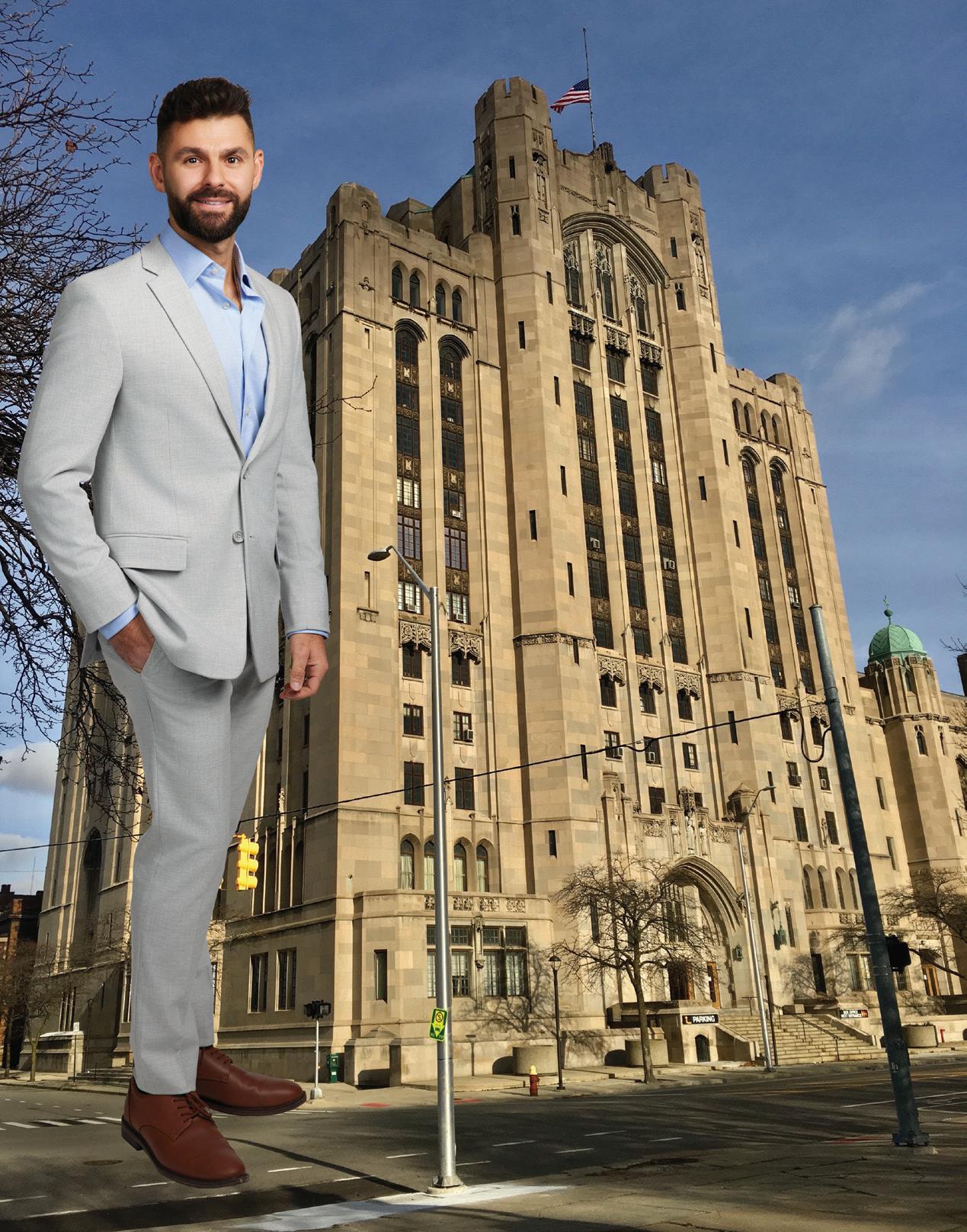
Founder MyFlight Tours, Detroit
Employees: 80
Revenue: NA
College: Grand Valley State University


Although Corbin Yaldoo launched three companies in 2022, including his signature commercial real estate company C3 CRE in Bloomfield Hills, it was one step in a much longer journey through the development and investment worlds.
“I was doing development and investment work under the radar, without a brand,” Yaldoo says. “I was doing brokerage, but working for Mid-America Real Estate.”
All told, Yaldoo had been doing brokerage work for 14 years, and conducted development and investment work about half that time.
Establishing C3 CRE (C3 stands for “connect, collaborate, care”) for his brokerage work, Corbco Ventures for his development and investment work, and the commercial lending firm Rair Capital gave Yaldoo the chance to build his own brokerage team and establish a longer-term vision.
struggle with the disease has only helped him develop insight and toughness that he has put to good use in business.
“There’s been adversity I’ve had to fight through during the last half of my life,” Yaldoo says. “(I have the) grit and perseverance to fight through any adversity that my health may go under, and to treat that adversity and correlate it to the obstacles of being an entrepreneur and getting transactions done,” he says.
Yaldoo describes himself as a “deal junkie broker,” noting juggling commercial clients is much more complex than selling homes. Even in that complexity, he says he’s found strength in his fight with Crohn’s. “I’ve never seen it as a setback,” he says. “I’ve always seen it as a fuel for growth.”
Other organizations the company supports include The Humane Society of the United States, the Michigan Nature Association, the Animal Welfare Institute, the Diabetes Research Institute, and the Lupus Foundation of America, among others.

“It kind of represents who I am with connect, collaborate, and care,” Yaldoo says. “I love to connect with people through networking and building relationships. I look at everything long-term instead of short-term.”
Founder and President
C3 CRE, Bloomfield Hills
Employees: 10

Revenue: NA
College: Oakland University
Spencer Young’s introduction into construction came during high school, when he and a group of students built and sold Adirondak chairs to cover a spring break trip to Mexico.
Following graduation, he took what would be two steps up the academic ladder, earning an associate degree in residential construction and design at Washtenaw Community College, and a bachelor’s degree (magna cum laude) in construction management at Eastern Michigan University.
During college, he was a general laborer and personal assistant at a construction company, where he got experience in basic carpentry, bid submittals, and ordering and delivering materials, prints, and permits. Following an internship at Ideal Steel in southwest Detroit, in 2011 he was hired as a fabricator working on major projects like hospitals and automotive conveyor systems.
“Pretty soon I was a production controller, and you learn very quickly that details matter,” says Young, now senior project manager at Ideal Contracting, a sister company to Ideal Steel, and together part of Ideal Group, a multifaceted construction, manufacturing, and material handling services enterprise.
“After two years I became a project engineer, where I helped submit proposals, made sure the drawings were all correct, and helped develop and manage internal tracking systems,” Young says. “One of the highlights was working on Little Caesars Arena and various
projects for General Motors and Ford.”
More recently, he spent several months in west Tennessee as part of the team erecting the steel for a large EV battery plant for Ford Motor Co., part of BlueOval City, a $5.6-billion campus that, in addition to battery production, includes vehicle assembly, a supplier park, a railroad connection, and a wastewater treatment plant.
“It was pretty exciting going to work every day and seeing all the other contractors, and the massive amount of coordination that was needed on the job site,” he says. “I’ve managed teams, but not 50 di erent trades. That takes a lot of coordination. Over time I’d like to learn how to manage hundreds, or thousands, of tradespeople. That’s a real skill set.”
Asked what he’s learned working professionally over the past 15 years, he says: “Not to burn bridges, and be patient with people. Don’t overreact to a given situation. You have to find that balance of holding people accountable and being gracious doing it.”
Early on, one of his mentors was Frank Venegas Jr., founder and now chairman of Ideal Group. “He’s on the shop floor, visiting the different o ce areas, and talking to the teams. He provides wisdom and encouragement, he has great stories, and likes to pass out snacks.
“He’s been very successful and he could be doing something else, but he likes being with everyone and taking care of us. That really means a lot.”
— R.J. King
The approach has worked well so far, with C3 experiencing a 300 percent increase in revenue since its inaugural year. Yaldoo lists an extensive array of nonprofits that C3 supports through philanthropic e orts. One of the nearest to his heart is the Crohn’s & Colitis Foundation.
Since Yaldoo was diagnosed with Crohn’s disease at the age of 21, he makes it clear the
Yaldoo also serves as Michigan membership chair for the International Council of Shopping Centers, and is on the board of the Michigan Commercial Real Estate Political Action Committee.
“Michigan is the heart of our mission, and where the majority of our focus is,” Yaldoo says. “But we do deals on a nationwide level, and continue to expand outside of Michigan.”
— Dan Calabrese

Senior Project Manager
Ideal Contracting, Detroit Employees: 750 Revenue: $650M College: Eastern Michigan University














FHenry Ford Health is planning the largest construction project in Michigan, a $3.3-billion campus in Detroit designed to improve patient outcomes, boost research, and further drive medical tourism.
BY R.J. KING
SAL RODRIGUEZ


ifteen years ago, the leadership team at Henry Ford Hospital in Detroit wasn’t con dent a major renovation and expansion of its main campus along West Grand Boulevard was a sound nancial decision.
No one argued the original hospital, built in 1915 by automotive pioneer Henry Ford, was anything other than an astonishing return on investment.
But nearly a century later, in 2010, with the city in the midst of a decades-long decline in population, and having yet to confront what would become the country’s largest municipal bankruptcy ($18 billion in debt), would anyone be left to provide care to?
Credit Henry Ford Hospital for staying the course throughout the last 110 years. Still, if it was to spend millions of dollars on new and redesigned facilities, the decision couldn’t be made in a vacuum.
Recall in 2010, as Henry Ford Health began to formulate a potential expansion, businessman and entrepreneur Dan Gilbert had yet to invest in the city, the Detroit Pistons were playing their games at the Palace of Auburn Hills, and the population had dropped by more than half, to some 711,000 residents (from a peak of 1.8 million people in 1950).






















“We had looked at di erent options, and it’s a big challenge getting new equipment for operating rooms retro tted into the current space,” says Bob Riney, president and CEO of Henry Ford Health. “ ere were some positive things happening in Detroit, which was encouraging, but it wasn’t enough to commit major dollars to our campus.”
Bob Riney, president and CEO of Henry Ford Health in Detroit, is leading the e ort to build two new medical and research campuses in the city at a combined cost of $3.3 billion.
As Henry Ford Health and every other business weathered the city’s continued decline and the Chapter 9 bankruptcy (2013-14), the rst spark of what today is a $3.3-billion reimagination of its main Detroit campus, called Destination: Grand, came about as the Detroit Pistons looked to return to the city decades after playing at Cobo Arena and, prior to that, Olympia Stadium on the west side.
In 1978, the team had moved to the Pontiac Silverdome, before making its home at the Palace of Auburn




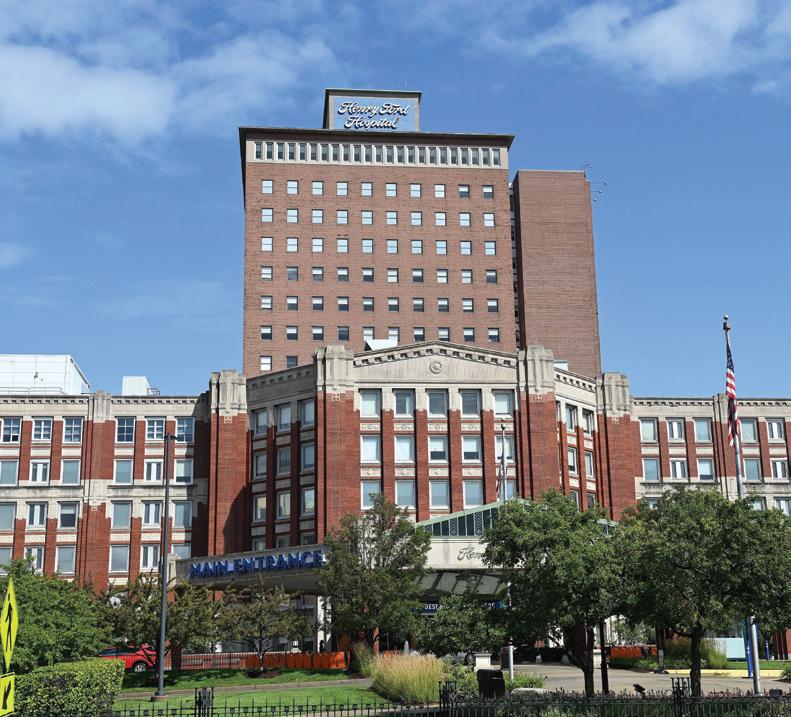


Services: 13 acute-care hospitals; three behavioral health facilities, including two world-class addiction treatment centers; a state-of-the-art orthopedics and sports medicine facility; and multiple cancer care destinations
Sites: 550 in Michigan
Merger: Ascension Michigan (2024)
President and CEO: Bob Riney
Employees: 50,000
Revenue: $7.8B (FY23)
Hills from 1988 to 2016. While negotiating a deal to have the team plays its games at Little Caesars Arena, which opened in 2017, the Pistons began looking for land to build a combined practice facility and corporate headquarters.
During 2016, as talks for the team’s possible return to the city were underway, the Pistons, after reviewing several options, approached Henry Ford Health about a parcel of land the hospital system owned at Second Avenue and Amsterdam Street in the New Center neighborhood, just north of Wayne State University.
“Over several months we brainstormed di erent ideas for the project, and we came up with linking the practice facility to what today is the William Clay Ford Center for Athletic Medicine,” says Riney, who was COO at the time. “We essentially established a partnership that would not only serve the Pistons’ needs, but also be a destination for patients seeking medical assistance, along with visitors.
“By building the practice facility in our neighborhood and connecting it to the new athletic facility (via a 125-foot skywalk), it o ered great e ciencies to the players and sta , because they could get treatment a few steps away, but (it was) also (good) for patients who came to get care. ey could go watch the Pistons practice or shop there before or after their care visit.”
In October 2019, the $90-million, four-story Henry Ford Detroit Pistons Performance Center opened its doors next to the $37-million William Clay Ford Center for Athletic Medicine. Under the novel partnership, the hospital system serves as the o cial health care provider for the team and holds naming rights to the performance center.


“ e partnership really demonstrated the power of having two brands working together, but it also set the template for how we were going to expand our main campus,” Riney says. “It taught us, going forward, partnerships were the way to go. It set the groundwork for Destination: Grand and everything you see today.”
In seeking a medical partner to complement playing its games at Little Caesars Arena, Arn Tellem, vice chairman of the Detroit Pistons, says he spent a year talking to all the di erent hospital systems in the city. From those conversations, he says it was clear Henry Ford Health was the right t for the team.
“Our most important partner is Henry Ford Health, and it’s a true partnership,” Tellem says. “We trust each other, we have each other’s backs, and we share common objectives. What impresses me most about Bob is his incredible humility.
“In every conversation we have had, it’s clear he values others. He puts the needs of his team rst, with the doctors, nurses, and everyone around him. ere’s no better friend than Bob Riney. He’s a fantastic leader, and the caring and values he creates translate throughout Henry Ford Health.”
On the sixth oor of the Brigitte Harris Cancer Pavilion, which is connected to the main hospital via a skywalk spanning West Grand Boulevard, Riney points to a construction site to the immediate east populated by scores of tradespeople, bulldozers, cranes, and earth-moving equipment.
A rendering of the west side campus expansion, called Destination: Grand, is shown on the south side of West Grand Boulevard (right side of image). It will open in 2029 and include a 20-story academic hospital and patient tower, a new emergency department, the Central Energy Hub, parks, and stores and restaurants.
e activity serves as the capstone of nearly two decades of land acquisitions and a major cleanup in the area. Consider in 2011, after Kirco, a commercial real estate development rm in Troy, won the bid to build a $30-million, 275,000-square-foot medical equipment, pharmaceutical distribution, and warehouse facility for Cardinal Health on a 17.5-acre site southwest of Henry Ford Hospital, the task of remediation, at rst glance, appeared overwhelming.
Over a period of 130 years, the land, located in an area northeast of Rosa Parks Boulevard and I-94, had been subdivided into multiple, separately-owned parcels made up of factories, fuel storage operations, a rail yard, paint shops, commercial structures, and dozens of mostly dilapidated single-family homes.
“When we started out in 2011, you had every imaginable obstacle a project can face,” says Dean Kiriluk, Kirco’s chief investment officer. “We had to assemble 98 parcels, there was no site control; we had to go through entitlements, zoning changes, abandon three streets and three alleys; (and) work with 14 different intergovernmental agencies in Detroit to get approvals, while environmental remediation was an open question.”
Along the way, the development team was attacked by pit bulls, spent months tracking down absentee land owners and relocating residents, uncovered a vehicle chop shop that the Detroit Police Department raided and closed, discovered 11 underground storage tanks (city records showed four tanks), tunnels, and pavers that dated back to 1900, and prepared and finalized more than 200 legal agreements.
Alan Kiriluk, founder and chairman of Kirco, has served on multiple boards and committees at Henry Ford Health, both in Detroit and the suburbs, for more than 30 years. He says what motivated him to contribute his time was the fact when he was 19 years old, his father passed away unexpectedly due to a medical error at another hospital. Then, when he was 10 years old, his mother was given several weeks to live, but wound up living until she was 94 years old.
“Quality of health care has always been on my mind, given my family experiences, and over the years I’ve worked extensively with Bob Riney,” Kiriluk says. “He listens to people; he’s always interested in helping patients, doctors, nurses, and the community at large. We worked two years straight on Cardinal Health. It was an amazing development.”
The project opened in 2014. It was followed in June 2020 by a $48-million shared laundry facility that was built south of West Grand Boulevard with Michigan Medicine and the St. Joseph Mercy Health System.
The eco-friendly, 115,000-square-foot facility has the capacity to service 78 million pounds of health care items that are life-saving must-haves for health care providers.
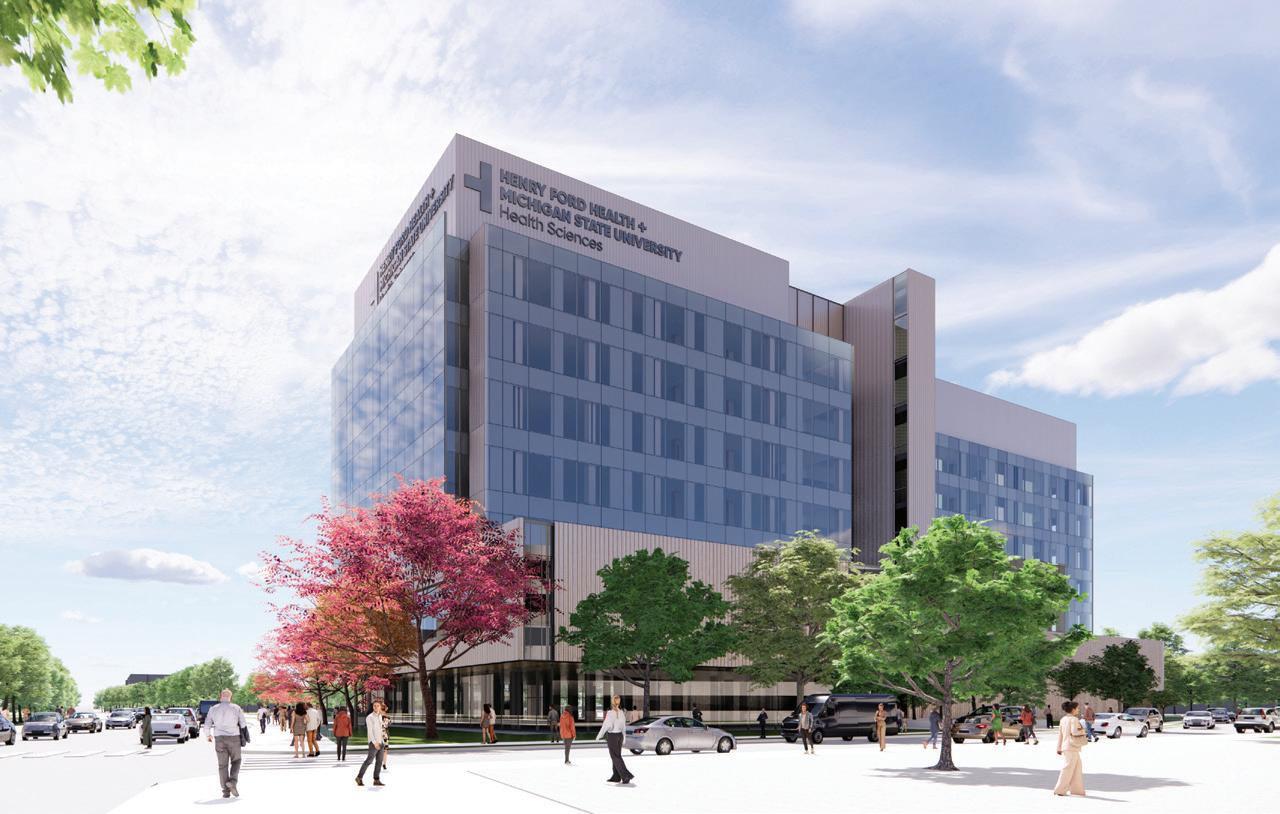
The highly automated facility cleans linens, bed sheets, blankets, pillowcases, scrubs, and towels for both inpatient and outpatient use. It’s also one of the largest shared medical laundry facilities in the country, and is more than double the size of a previous laundry plant.
Both its size and capabilities are saving significant amounts of money, and it better meets the needs of the three health care systems.
“Our collaboration was a true model for how health care institutions can work together to achieve efficiencies and spur economic renewal in our region,” Riney says. “Laundry service is critical to our everyday operations for our patients and team members, and the investment has not only worked, (but) it will have meaningful impact for years to come.”
With Cardinal Health and the laundry facility fully operational, Riney says the construction of a 20-story academic hospital and patient tower at the southwest corner of West Grand Boulevard and the Lodge Service Drive complements the vision of establishing a world-class health center.
A $48-million shared laundry facility at Henry Ford Health, bottom, opened in 2014.
Above, a rendering of the $335-million Henry Ford Health + Michigan State University Health Sciences Research Center now under construction along the east side of the Lodge Freeway, just north of I-94, which is set to open in 2027.
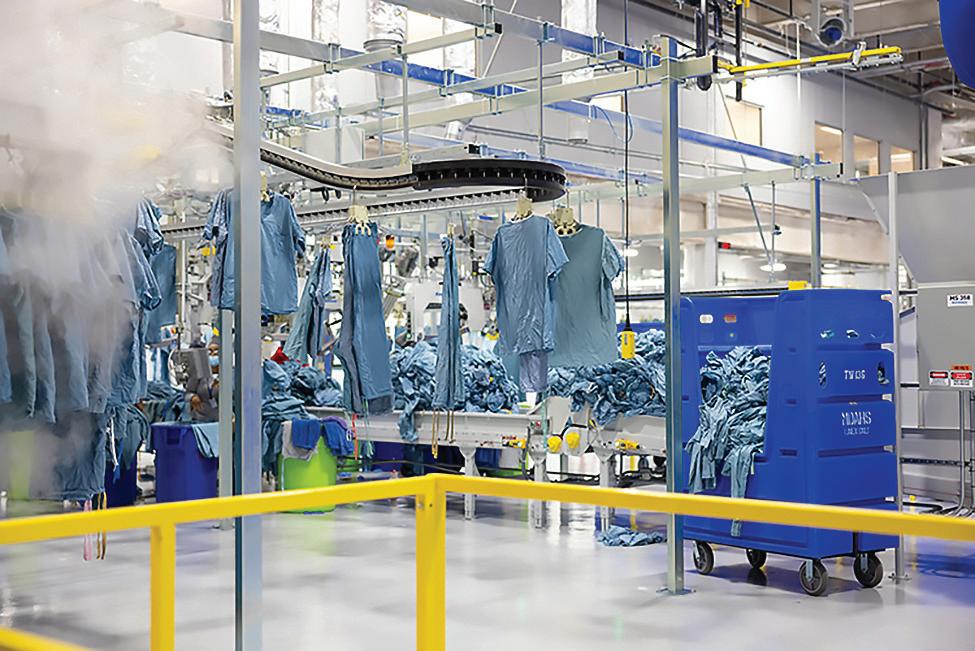
The 1.2-million-square-foot facility will offer 432 private rooms with technology upgrades and dedicated space for care teams, patients, and families; acute and intensive care units; operating suites; and a new inpatient rehabilitation hospital in partnership with Shirley Ryan AbilityLab in Chicago.
In addition, a new emergency department with 100 treatment spaces spread across 70,000 square feet of space will be accessible on the south side of a five-story “podium” structure under construction immediately west of the new tower. The building will include a lobby, valet services, a coffee shop, a gift shop, a pharmacy, a cafeteria, some surgical and procedure rooms, and pre- and post-op areas.
The entire campus west of the Lodge Freeway, connected by a series of skywalks, is scheduled to open in 2029. Following that, Henry Ford Health will look to renovate its historic campus and embark on making all patients rooms private.
Benchmarking the best in health care, from the Mayo Clinic to Johns Hopkins Medicine, Dr. John Deledda, chair of the Department of Emergency Medicine at Henry Ford Medical Group, says planners took the best components of health care facilities from around the country and brought them to Detroit.
“Let’s start first by thinking about the patients,” Deledda says of the new emergency department. “What are they going to need? Let’s then think about our staff that are going to care for those patients, and what they need.”
For those facilities that are “best in class, let’s take the best pieces of each of them and put them together in an environment that this community deserves — and, quite frankly, our staff deserves. We really believe we’re building the best emergency department in North America.”
Powering the Destination: Grand campus will be a $235-million Central Energy Hub, which will feature a hot and chilled water pump system that provides electric heating and cooling to the new hospital facilities. It is scheduled to be completed in 2027.
“We looked at building tunnels, but we wanted to avoid what would be a huge expense,” says Henry Ford Health’s CEO Riney. “We plan to have, once the

technology is ready, autonomous vehicles delivering supplies from the laundry and pharmaceutical facility, and Cardinal Health.”
Destination: Grand is one of two campuses under construction. The other is the Henry Ford Health + Michigan State University Health Sciences Research Center, which is being built at the northeast corner of the Lodge and I-94 freeways, just west of the Pistons practice facility and One Ford Place, Henry Ford Health’s current headquarters.
The seven-story, 335,000-square-foot research facility, which also is scheduled to also open in 2027, will include space for more than 80 principal investigator teams focused on joint research in cancer, neuroscience, cardiometabolic diseases, immunology, and precision health. In 2022, the two organizations were recognized as an aligned research organization by the National Institutes of Health.
The $335-million center also will be home to the Nick Gilbert Neurofibromatosis Research Institute, in partnership with the Gilbert Family Foundation. It’s the first brick-and-mortar institute solely dedicated to neurofibromatosis, and one of the first to leverage organoid technology and other novel models to address a single disease.
Dan and Jennifer Gilbert’s son, Nick, who was 26 years old when he passed away in 2023, had long battled neurofibromatosis, a rare genetic disorder that causes tumors to grow on nerve pathways throughout the body.
The entire $3.3-billion project, including both campuses, is called Future of Health: Detroit, and includes Destination: Grand. It is being built by Barton Malow, a large general contractor in Southfield.
Ryan Maibach, president and CEO of Barton Malow, says during the planning stages for the massive construction project, he came to appreciate how Riney “understands the many ways Henry Ford Health can positively impact people in metro Detroit. He is engaging, fun, and collaborative, with a passion for elevating the people around him.”
Riney says he and his team are creating “a whole new tipping point” in health care. Over a 45-year career at Henry Ford Health, he says he’s never been more passionate about the future direction of the heath system as it embraces economic development, community relations, and environmental stewardship.
“We had incinerators, and now we’re part of the green economy,” he says. “I’m also proud that we continue to reach out to the surrounding community so they feel this is their health home. It will be like one big campus for everyone, including international visitors looking for the best care.
“We also take great pride in the fact the hospital never left the city when it was easy to do so. Now we’re employing more people, we’re creating jobs, and we’re reaching out to provide opportunities. For example, we’re working with the Motown Museum, and we’re going to infuse the hallways with music and art.”
As a board member of the Motown Museum, located two blocks west of Henry Ford Hospital, Riney has played “a small role” in a major expansion that’s scheduled to open in the summer of 2026. Following major improvements to the main campus, known as Hitsville U.S.A., the museum is building a 40,000-square-foot
The 20-story academic hospital and patient tower will offer all private patient rooms. The five-story (red) structure will house a new emergency department, a pharmacy, a gift shop, and more amenities. The entire campus will be connected by skywalks.
HENRY FORD HEALTH’S $3.3 BILLION INFUSION OF capital investment in Detroit, made up of new campuses on either side of the Lodge Freeway just north of I-94 and spanning the years 2025 to 2029, has a likely potential of delivering a total economic impact of $5.3 billion.
This estimate considers the ripple effects of combined investment efforts by Henry Ford Health and three partners to provide financial, construction, retail, and educational gains in Detroit and the surrounding neighborhoods and communities.
The multiplier of an initial total investment of $3.3 billion is 1.60. The estimate reflects momentum associated with objective evidence of capital injections that launch successive waves of optimism, population growth, new buildings and retailing, and small business startups.
Such added investments, initiated by experienced entrepreneurs and planners, and anchored in sizeable geographic and appropriate regions, create greater employment, tax bases, health care improvement, better transport and communication services, and infrastructure in general, including upgrades in public safety as well as in educational and recreational options for both residents and commuters.
Concerning estimates of this kind, multiplier derivations are sensitive to variables that raise or lower the size and quality of overall economic impact resulting from initial capital investments.
In Detroit’s case, the multiplier is enhanced by the existing density of population in the immediate area and access to a network of East-West and North-South major roadways entering and exiting the targeted neighborhoods.
Moreover, these roads provide convenience, and the comparative cost advantages when linking with bus, rail, and airport services to other parts of metro Detroit, Michigan, other states, and Canada are even more profound.
Factors such as convenience and speed of commerce can raise the multiplier by reducing leaks (outflows of spending) caused by residents and businesses purchasing goods and services beyond the area impacted by original investments.
Likewise, a lower multiplier occurs if the targeted investments are hobbled or supplanted by politically motivated subsidies, counterproductive rules, regulations, bureaucratic interventions, and more burdensome fees and taxation.
Already, myriad taxes — be they imposed on goods and services, personal property, capital structures and equipment assets, or personnel, small businesses, and corporate incomes — repel incentives to work, employ, and expand, or be attracted to the targeted recipients of any new risk investments.
For the years envisioned by the proposed investments in the New Center Project, our national and local economies will expand at faster average growth rates than occurred in the prior five years.
— By David Littmann

expansion that will include immersive and interactive exhibits, the Ford Motor Company Theater, new retail offerings, and a Motown Café.
The project is part of a wider effort by the city and multiple stakeholders to a create a walkable, medical village in and around both Henry Ford Health campuses, where care facilities are complemented by new housing, senior living facilities, student dormitories, shopping, restaurants, places for small businesses, healthy food production, a hotel, convention space, and public parks.
For example, at a future date, the administration staff offices at One Ford Place will be vacated for newly renovated space, potentially in the Fisher Building in New Center, which is majority owned by MSU, or Cadillac Place, a state office building that was built as the world headquarters for General Motors Co. in 1922. One Ford Place will then be converted into apartments by Tom Gores, owner of the Detroit Pistons.
“I told our design team I was tired of parks being a wonderful place in the spring, summer, and fall, but not winter,” Riney says. “We’ll be adding evergreens to all of the (new) parks, with gas fire pits and warming stations, so the community and our employees can experience (the outdoors) 12 months of the year. We’re leaning into it.”
A harbinger of the changes in Detroit can be found at Henry Ford Hospital West Bloomfield, which opened in 2008 and was designed after a northern Michigan resort. A bank of shops, a teaching kitchen, and other amenities line an interior street leading to a large, enclosed atrium and a bustling cafeteria serving healthy food from a neighboring greenhouse.
All of the rooms are private, with space for a loved one to stay overnight. There are all kinds of technological connections in the rooms and the facility, to keep patients up to date on their progress, provides diet suggestions, and note any post-rehabilitation needs. What’s more, there’s no central intercom system, rather, soothing music plays in the background.
“Henry Ford Health West Bloomfield was built with partnerships, so we had a track record there that we tapped into when we were planning Destination: Grand,” Riney says. “Along the way, we took another long-standing partnership to a whole other level.”
$3.3B Henry Ford Health (2029)
$1.4B Hudson’s Detroit (2026)
$950M Michigan Central/Newlab (2024)
$862M Little Caesars Arena (2017)
$500M Ford Field (2002)
$400M Book Tower (2024)
$300M Comerica Park (2000)
$250M U-M Center for Innovation (2027)
Following its initial alignment with the Detroit Pistons and its owner, Gores, and vice chairman, Arn Tellem, Henry Ford also expanded its 31-year partnership with Michigan State University in East Lansing.
The health sciences research center on the east side of the Lodge is the first physical embodiment of the Henry Ford + MSU partnership, which was designed, in part, to improve health care outcomes for people based on race, ethnicity, gender, and socioeconomic status. In addition, it will be MSU’s largest research facility.
“When Michigan State and Henry Ford first embarked on this partnership, we knew and believed in what was possible,” says Kevin M. Guskiewicz, president of MSU. “Now, our health sciences research is unified under the partnership, we have the top-funded women’s health research program in the nation, and our researchers have the once-in-a-lifetime opportunity to make discoveries that will definitively improve the lives and health of countless individuals.”
Frank Venegas Jr., chairman of Ideal Group in southwest Detroit and a trustee of Henry Ford Health over the last 12 years, says the direction Riney and his team are taking the health care system gets down to “the nitty-gritty of things.”
“Bob is comfortable in the boardroom, but he also has conversations with the nursing team, the doctors, the janitors, everyone,” Venegas says. “He has common sense, and is just a regular guy with a great vision. He knows when to be the boss, and when to lead and find solutions to tough challenges.”
George W. Jackson Jr., principal of GWJ Co., a real estate development company in Detroit, and past president and CEO of Detroit Economic Growth Corp. from 2002 to 2014, who with his team began the revitalization of a tired, decaying city that today is the poster child for urban renewal, says Riney is a harbinger of “holistic” economic development.
“Think about what $3.3 billion is,” Jackson says. “That’s more than Comerica Park, Ford Field, and Little Caesars Arena combined. As Henry Ford Health’s development begins to take off, it gives the region a world-class medical system, and it will attract people from all over the world, whether for treatment or the support of a loved one.”
Looking ahead, Riney says the future of technology is being taken into account in the overall campus plans, including everything from computer vision to robotics, large language models, and avatars to guide patients upon their arrival.
“We’re planning for things that haven’t been perfected, and we’re assuming AI will work,” he says. “We’re also stepping up our executive health exams so people will have the same, if not better, experience than, say, Mayo Clinic or the Cleveland Clinic. That’s not a knock on them; a little competition makes us all better.”
LEANING IN
Work is underway on Destination: Grand, led by Barton Malow, a large general contractor in Southfield. The project follows nearly two decades of land acquisition by Henry Ford Health.
Laurie Sall, who serves on the board of Henry Ford Health’s Neuro Council, says it’s fitting Riney is leading the way on developing a word-class medical campus. She and Riney were in the same class together as children; from the first grade to accepting their high school diplomas.
“Bob was the guy the teachers called on to run the overhead projector or the film projector; he was a leader in AV before anyone knew what that terms was,” says Sall, president of Laurie Sall and Associates, a financial advisory firm in Farmington Hills. “The teachers knew they could depend on him, and today the entire hospital system knows they can depend on Bob to lead the way into the future.”

MCompanies can measure milestones in various ways — revenue, awards, product development, brand recognition, deliverables, and customer satisfaction — yet the anniversary of a company’s inception is one of the most significant. Whether it’s a small local business or one with an international sales force, its milestones are turning points that mark progress. An accomplishment for one company may be that first year of profitability. Another might measure growth through launching new products. Still another may consider a loyal customer base to be the ultimate achievement.
The companies in the following pages of DBusiness have all found a reason to celebrate a company milestone. For J.S. Vig Construction, its 60th anniversary is also occasion to highlight the next generation of this family-owned business. For 123NET, last year’s merger has broadened network infrastructure throughout the Midwest. The Westin Book Cadillac turned 100 last year, and with its historic makeover, it is every bit the jewel of the city. Founded in 1995, Peninsula Capital Partners is celebrating its 30th year of providing financial services and solutions to a wide range of companies. Since 1925, Mariners Inn has provided shelter and treatment to Detroiters in need and, this year, has a new addition in the heart of The District Detroit.
Companies gain strength and stability when there is support, recognition, and celebration of their success, and there’s no better time than an anniversary to reflect on past achievements with an eye toward the future. Congratulations to the following companies for their achievements.
Reaching 30 years in business is a remarkable milestone, but for 123NET, it is particularly unique: The company has been around for nearly as long as the internet industry itself.
Founded in 1995, 123NET emerged as the internet transitioned from a niche technology to a global necessity. At the time, the digital landscape was the Wild West; dial-up modems, coax cables, and unpredictable performance were the norm.
Three decades later, 123NET has played a pivotal role in transforming Michigan’s fiber connectivity firstly for businesses, and most recently for residents. Through continuous infrastructure investment and strong partnerships with communities, carriers, businesses, and residents, the company has built a faster, more reliable, and modern network.
“None of this would be possible without our dedicated team — now over 300 strong — or the incredible partners and customers who have trusted 123NET,” says 123NET’s CEO, Dan Irvin. “As a homegrown Michigan company, we take pride in partnering with our community and providing the backbone that empowers both Michigan businesses and residents to compete and thrive.”
Still, many communities remain underserved. That’s why 123NET continues to invest in fiber network expansion, leveraging public and grant funding alongside its own resources to bridge the digital divide and bring high-speed connectivity statewide.
While thousands of Allegan residents are now accessing high-speed fiber internet where they previously had minimal to no options, 123NET’s Broadband Projects in Allegan and Ottawa counties are just the starting point of what is needed in Michigan. The current Broadband Equity, Access, and Deployment (BEAD) program allocating $1.5 billion for Michigan’s broadband infrastructure will further close the digital divide in the state, and 123NET is actively working with municipalities to secure funding and drive lasting economic impact.
As 123NET celebrates 30 years, it remains committed to its mission. Here’s to the next 30 — building a network that makes Michigan the best connected on the planet.
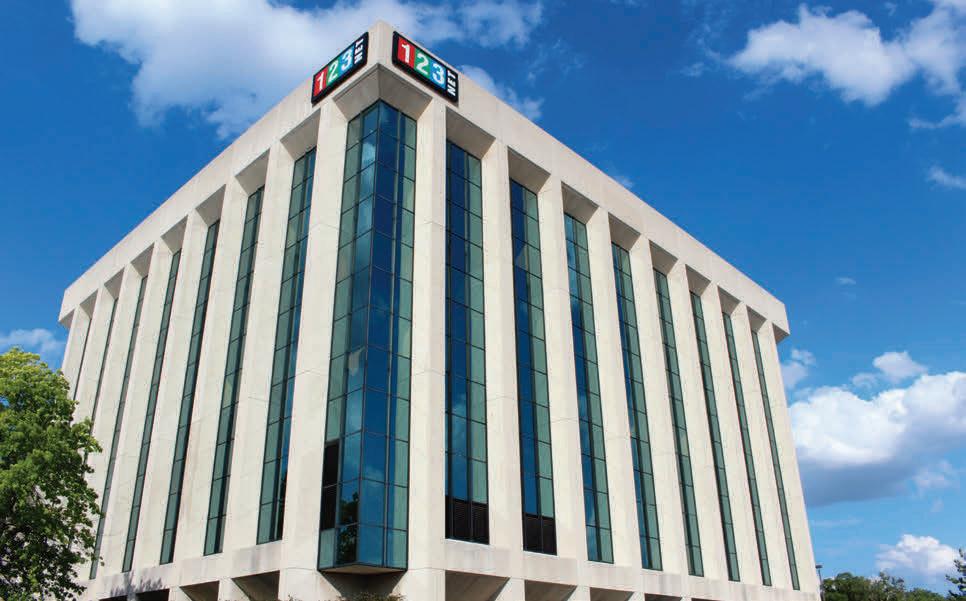
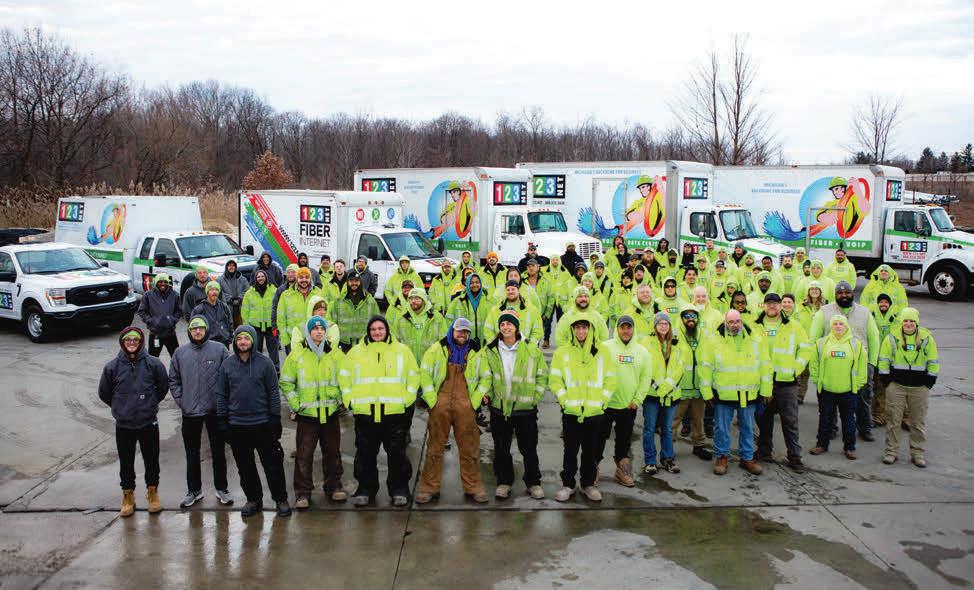
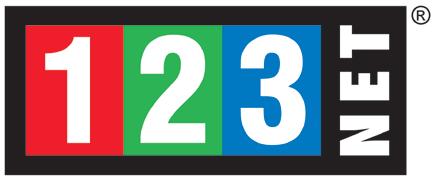
Dan
In September 1995, Peninsula Capital Partners was launched with a mission to reinvent middle-market private debt and equity markets. Its founders rejected the prevailing arbitrary restrictions of what a mezzanine lender could, or could not, do and sought to become the first one-stop provider of both subordinated debt and equity that invested directly in companies versus in transactions led by buyout funds. This investment strategy was unheard of at the time and would eventually come to be known as “unsponsored” mezzanine investing, due to the lack of a buyout fund sponsoring the transaction.
Like most new and disruptive ideas, this proposed investment approach was met with a healthy dose of skepticism as mezzanine investors were at the time universally relegated to supporting transactions led by buyout funds. Peninsula Capital’s view was that there were many transactions involving successful middle-market companies that required junior capital and corporate finance expertise but were not best addressed with a traditional buyout transaction. These transactions were in a capital “wilderness” as no committed pool of capital existed for such situations. Peninsula Capital changed this when it launched The Peninsula Fund in 1995.
Some three decades later, Peninsula Capital has greatly altered the landscape of its industry, with non-sponsored mezzanine now a well-established asset class in the private debt space. Peninsula Capital’s pioneering efforts have allowed its team to successfully raise eight investment funds totaling over $2.2 billion and earn for its investors nearly $2 billion to date. As it approaches its 30th anniversary this September, Pensinula Capital wishes to acknowledge its investors as well as the transaction partners and professional advisers who helped make its success story possible.

Established 1995 One Towne Square, Suite 1400 Southfield, MI 48076 peninsulafunds.com
Scott A. Reilly, CFA Managing Partner, Chief Investment Officer & Co-Founder
William Y. Campbell
Partner & Co-Founder
William F. McKinley Senior Partner & Co-Founder
Now celebrating its 60th year, J.S. Vig Construction is an industry leader offering a rare blend of attentive, hightouch service and expert construction management services.
When Joseph S. Vig founded J.S. Vig Construction in 1965, he envisioned an organization built on a bottom line measured not in dollars and cents but in people and relationships. Today, President Valerie Vig and CEO Joseph Vig continue to embrace and expand their father’s legacy. In fact, repeat customers account for 80% of J.S. Vig Construction’s project base, and the J.S. Vig team is 30% women — in the boardroom, in the office, and on job sites.
The next generation of Vigs also embraces paying it forward, with Valerie creating an internship program, now in its 12th year, and Joseph taking the helm as an adjunct professor teaching “Sustainable Construction and Design for the Real Estate Professional” at the University of Michigan.
As a leader in her field, Valerie has received awards from the Washtenaw Contractors Association and DBusiness, and last year, J.S. Vig won the CREW Detroit Impact Award for the Bridge Housing Campus at the Pope Francis Center and the Ann Arbor SPARK Project of the Year Award for the Sartorius AG Center of Excellence, a 130,000-square-foot LEED Gold, net-zero-carbon research and manufacturing campus.
“I think our father would be very proud of us, both for our revenue success and especially for our adherence to our core values: integrity, customer satisfaction, quality, and safety. These come before dollars,” Valerie says. “We continue to serve repeat clients because we are honest and live by our principles.”
At J.S. Vig, building a foundation on what matters most has long been a point of pride and a principled pillar of the business. J.S. Vig Construction understands what matters — and is working hard to help the industry take an important step forward.
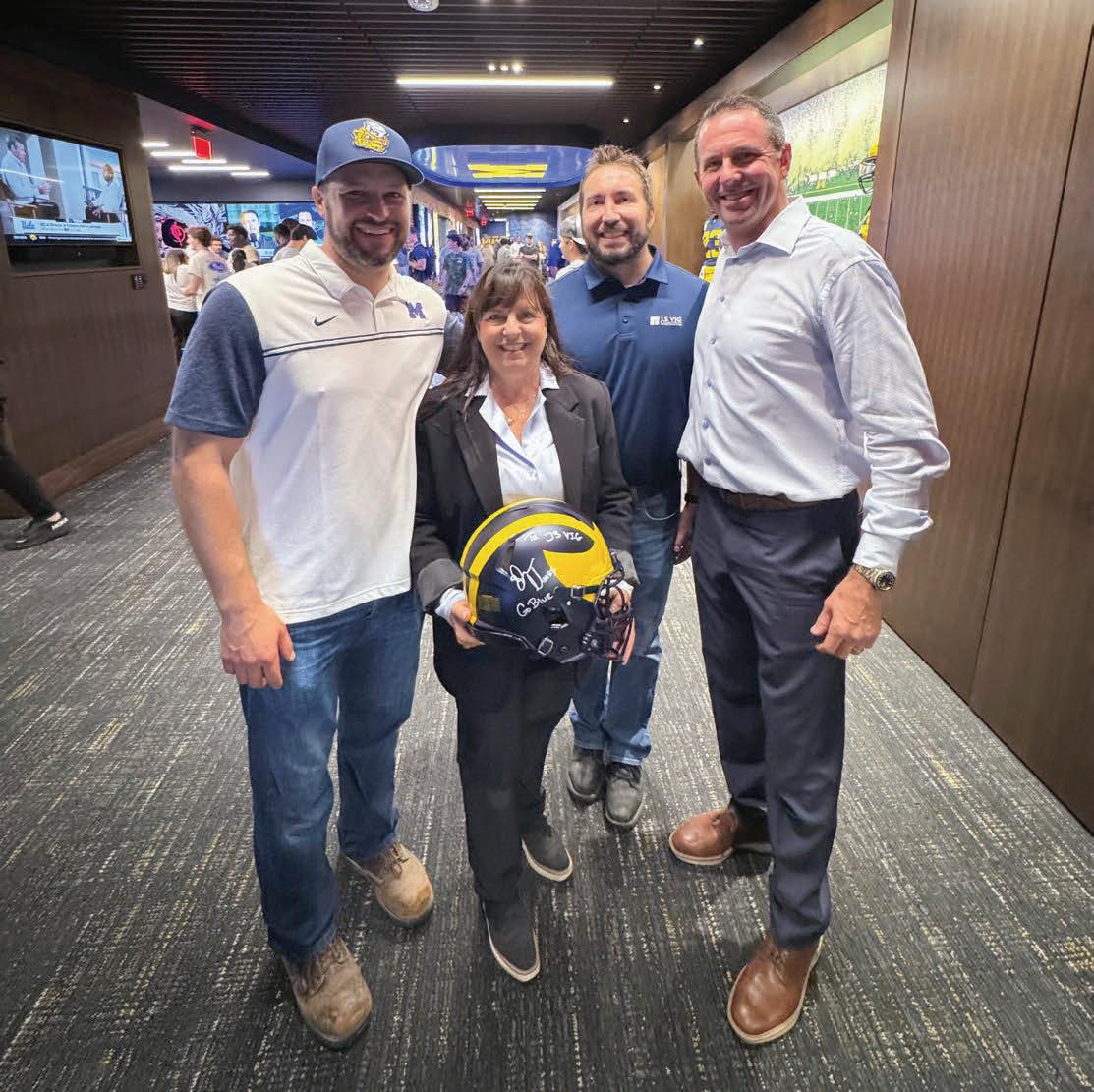

Valerie Vig President
Joseph Vig CEO
For 100 years, Mariners Inn has been providing shelter, substance abuse treatment, and transitional housing for homeless Detroiters. Founded in 1925, Mariners Inn moved to its current location on Cass and Ledyard in 1955.
CEO David Sampson says the location provides immediate access to transportation, employment, leisure activities, education, and other resources that help the people Mariners Inn serves thrive and lead productive lives. “Our presence here reflects the positive impact of community collaboration in improving lives and surroundings,” he says.
To coincide with its 100th year, Mariners Inn accomplished another major milestone. Together with Cinnaire Solutions, Mariners Inn celebrated the grand opening of The Anchor, a 65,500-square-foot, stateof-the-art residential substance-use disorder treatment facility in the heart of The District Detroit.
“The Anchor is more than just a building — it is a beacon of hope and opportunity,” said Sampson at the grand opening ceremony in March. “For nearly a century, Mariners Inn has helped individuals break the cycle of addiction and homelessness. With this new facility, we can extend our services to more people than ever before, helping them rebuild their lives with dignity and purpose.”
Featuring 40 furnished apartments for individuals undergoing treatment, and 44 permanent supportive housing units for those transitioning from homelessness, The Anchor is designed to provide individuals with safe, stable housing to support long-term recovery. In addition to the expanded services made possible by The Anchor, Mariners Inn also provides prevention programs, outpatient treatment programs, peer mentoring, and alumni programs.
Its comprehensive services also include residential treatment, job training, and case management. Annually, Mariners Inn helps nearly 2,000 clients regain their independence, health, and self-esteem. “We are fortunate to have such dedicated professionals who give their expertise, time, energy, and passion to the people we serve,” Sampson says. “We believe, with everything we do and say, that recovery is real and begins at Mariners Inn.”


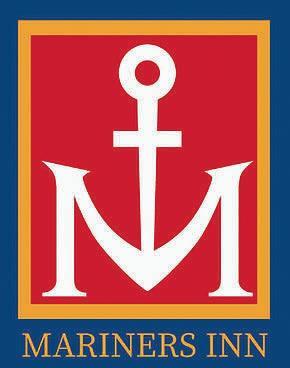
David Sampson CEO Carina Jackson COO
Director
For a century, The Westin Book Cadillac Detroit has stood as a symbol of grandeur, resilience, and renewal in the heart of downtown Detroit. Originally envisioned by the Book brothers — J. Burgess Jr., Herbert, and Frank — the hotel was designed to transform Washington Boulevard into the “Fifth Avenue of the Midwest.” Their dream materialized on Dec. 8, 1924, when the Book-Cadillac Hotel opened as the tallest building in the city and the tallest hotel in the world at the time.
Designed by renowned architect Louis Kamper, the hotel was a masterpiece of Italian Renaissance architecture, adorned with Venetian details and topped with ziggurats reflecting Mesopotamian and Egyptian influences. The Michigan Avenue entrance featured statues honoring key figures from Detroit’s early history, including Gen. Anthony Wayne, Chief Pontiac, and Antoine de la Mothe Cadillac.

Upon opening, the 33-story hotel boasted 1,136 guest rooms, each with a private bath — an extraordinary luxury for its time. It catered to the growing convention industry and housed WCX radio, the predecessor to Detroit’s iconic WJR. Among its elegant spaces, the Italian Garden Ballroom was an engineering marvel, with a glass ceiling and lighting effects that simulated sunshine, clouds, and thunderstorms, evoking the ambience of an Italian villa.
Despite early success, the Great Depression forced the Book brothers to relinquish ownership in 1931. Over the ensuing decades, the hotel changed hands multiple times but remained a pillar of Detroit’s hospitality scene. However, economic struggles led to its closure in 1984, leaving the once-glorious landmark vacant for nearly 20 years.
Listed on the National Register of Historic Places in 1982 as part of the Washington Boulevard Historic District, the hotel’s legacy endured. In June 2006, the Cleveland-based Ferchill Group announced a $200
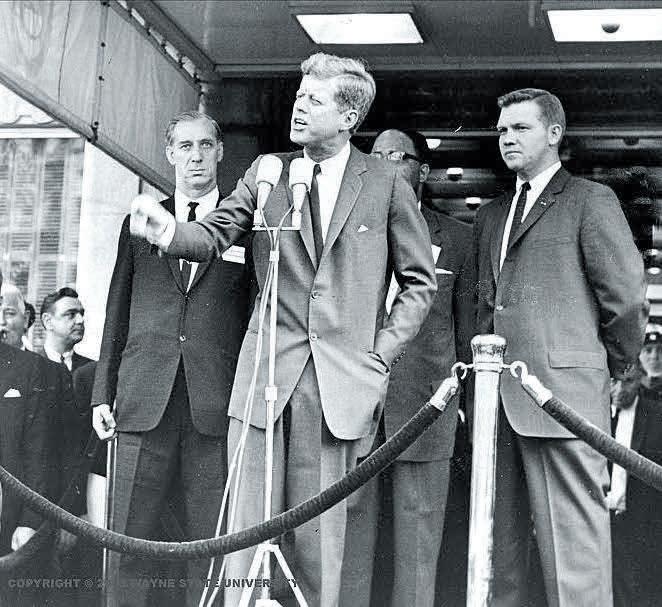
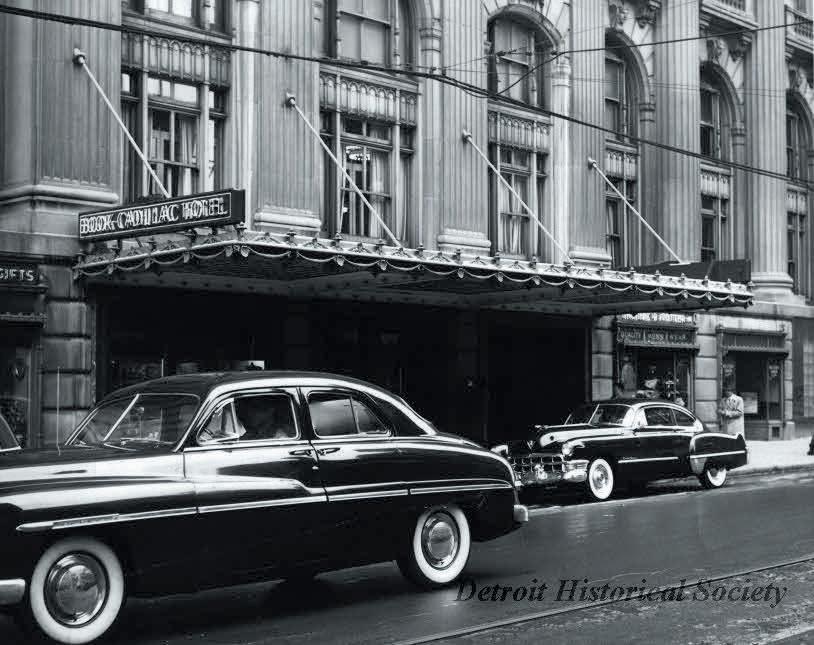
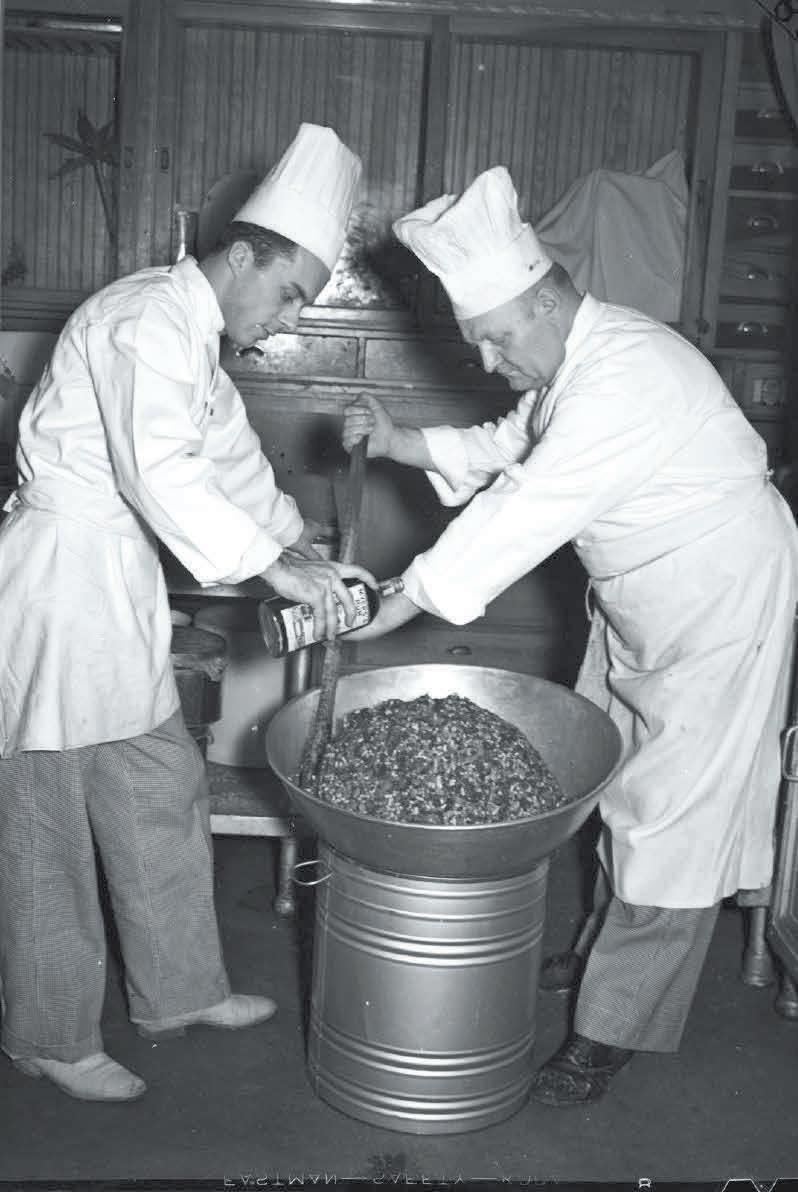




million restoration plan. The hotel reopened in October 2008 as The Westin Book Cadillac Detroit, featuring 453 luxurious guest rooms and 65 upscale condominiums. This transformation earned the Ferchill Group an Honor Award from the National Trust for Historic Preservation in 2009.
Under new ownership (Oxford Capital Group) since 2021, the hotel has continued to evolve while preserving its historic charm. A recent $23 million renovation reimagined all public spaces, guest rooms, suites, and meeting areas, ensuring The Westin Book Cadillac remains a premier destination in downtown Detroit.
As part of its centennial celebration, the hotel has partnered with the Detroit Historical Society to create an exhibit highlighting this milestone, featuring relics that tell the hotel’s remarkable story. The exhibit is open through late spring 2025.
As the hotel marks 100 years of history, it stands as a testament to the city’s enduring spirit. From its origins as a beacon of luxury to its renaissance as a modern icon, The Westin Book Cadillac Detroit continues to shape the city’s skyline and welcome guests from around the world with its signature blend of elegance and hospitality.
The hotel’s team extends its deepest gratitude to its 100th anniversary celebration partners — Cadillac, Detroit Historical Society, Moët &

Chandon, The Parade Co., and Oxford Capital Group — for their support in commemorating this incredible milestone.



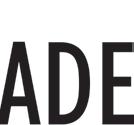

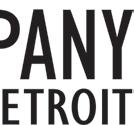





Established 1924
1114 Washington Blvd. Detroit, MI 48226 313-442-1600 westinbookcadillac.com
Debra Schultz General Manager
Scott Stinebaugh Director of Sales & Marketing

BY NORM SINCLAIR

Following a winter of record snowfall and ideal skiing conditions in northern Michigan, the 2025 travel, golf, and tourism season is primed for a banner year with major golf and development projects breaking ground or coming online.
By the rst week in March, Gaylord had already set a snowfall record of 187.7 inches, surpassing the previous mark of 185.6 inches.
“It’s been many, many years since we’ve seen this much snow, which had a great impact on our winter sports visitors, snowmobilers, and cross-country and downhill skiers,” says Paul Beachnau, executive director of the Gaylord Convention and Tourism Bureau. “ is should give us a nice boost for the summer season.”
Farther north, Mackinac Island tourism will likely rise with the revival of the Arnold Transit Co. name on ferries and docks, joining Shepler’s Ferry in providing expanded daily service to the island from St. Ignace and Mackinaw City.
After more than a decade of turbulent ownership and several name changes, the Arnold line, founded in 1878, was acquired last year by Ho man Marine, which brought back the original Arnold Transit name. e service, which o ers the lowest round-trip rates on its classic ferries, is scheduling more frequent crossings and expanding its evening schedules, with some trips planned for as late as 10:30 p.m.
In turn, Shepler’s Ferry is adding later departures from St. Ignace all season long, to match its schedule out of Mackinaw City. e company also has set up earlier morning departures from both mainland docks.
Travelers who visit Mackinac Island will be greeted by the restoration of the 1887 roo ine atop the Grand Hotel, and the original wood columns and agpoles along the world’s largest front porch. e hotel’s Gate House restaurant has been renovated, as well, and there’s new furniture and a new live entertainment area.


Across other island hospitality properties, the 205-year-old Harbour View Inn updated its dining room, lobby, and parlor, with remodeled guest rooms coming next year. Refurbished rooms also will debut this year at the Chippewa and Lilac Tree hotels, while the Island House Hotel and Pine Cottage B&B have undertaken other improvements.
At Mission Point Resort, the ne-dining restaurant Chianti is undergoing a transformation with the addition of the Lilac Lounge, an upscale setting for a before- or after-dinner respite.
Moving to other recreational destinations, new golf course construction is proceeding at a pace not seen since the 1980s, when Michigan emerged as a national leader in opening new courses. Headlining the revival is an 18-hole championship course, Sky Fall, that will break ground this summer at Forest Dunes in Roscommon.
Sky Fall will be the fourth course at the property, once a stop for golfers traveling up or down I-75, but now a burgeoning destination for golf enthusiasts from around the country. e course, projected to open in 2027, will be built on 350 acres of rolling, forested land. Elevation changes on that site are as high as 70 feet.
Architect Gil Hanse says the design will take its cues from great old courses built by legendary designers like A.W. Tillinghast and Donald Ross. Movie bu s might think the course’s name is a nod to the James Bond movie “Skyfall,” but the name re ects the starry nights and memorable sunsets in northern Michigan. e new course will join the original Tom Weiskopf layout and the Loop, Tom Doak’s remarkable reversable course that features 36 holes playing to the same 18 greens from opposite directions. Also on the


property is e Bootlegger, a 10-hole, par-3 course playing at 1,100 yards that opened last year.
Both the Weiskopf and Doak designs are listed among the Top 100 courses in the country. While Forest Dunes o ers public access, Sky Fall will have a private membership with limited play for resort guests. In addition to Hanse, a former Doak protégé, Sky Fall adds design partner Jim Wagner. Together, the pair undertook the recent $12-million renovation of the South Course at Oakland Hills Country Club in Bloom eld Township.
Another course under construction is a nine-hole layout at the Island Resort & Casino in Harris, in the Upper Peninsula, designed by Michigan-based architect Paul Albanese. e course, to be called Cedar, is slated to open next year. It’s part of a two-year, $19-million capital investment that includes a stateof-the-art golf shop and an expansion of the existing convention center.
Albanese designed the resort’s other two awardwinning courses, Sweetgrass and Sage Run, and has carved out a national niche as the go-to architect for courses on Native American-owned resorts and casinos nationwide.
“We’re very busy in the summer, and often booked on both of our other courses in the morning,” says Tony Mancilla, general manager of Island Resort & Casino. “We decided to add nine holes to accommodate our guests looking for early morning tee times before they head home. “We’re taking some great concepts from the golden age of course architecture in the early 1900s and incorporating them into the Cedar course.”
Garland Golf Resort in Lewiston is set to open its newest o ering, a reversible 10-hole, par-3 course. It’s

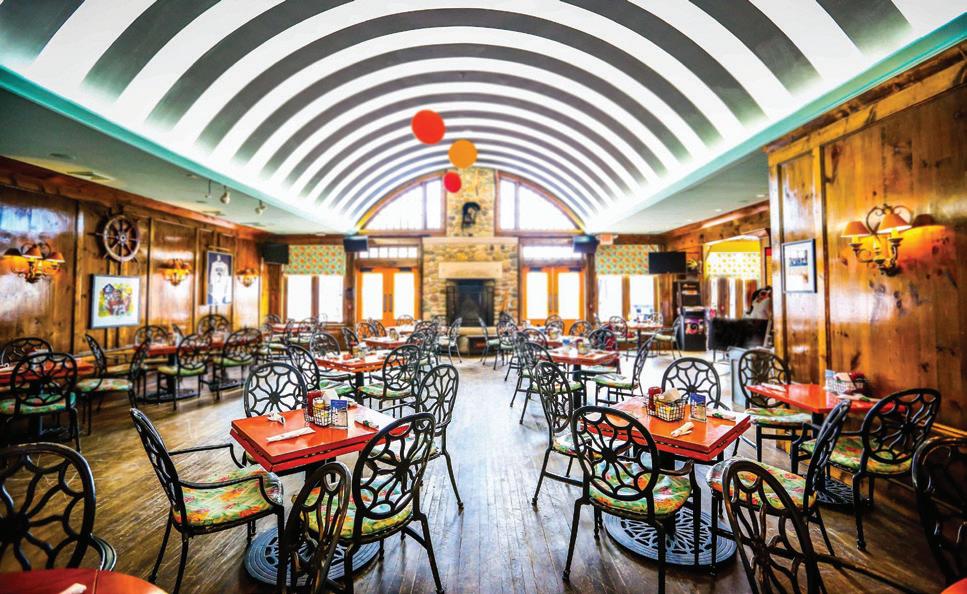
the first new course at Garland since the resort’s late founder, Ron Otto, designed and built its four established tracks — Fountains, Monarch, Reflections, and Swampfire — between 1987 and 1995.
In a similar vein as Doak’s Loop at Forest Dunes, Garland’s reversible par-3 course will allow golfers to play the nine holes in two different directions. The course is set on a 10-acre parcel next to the clubhouse.
General Manager David Sanderson is the impetus behind developing the new course and bringing in a former colleague, Kelly Shumate, to design it. The two previously worked at the five-star Greenbrier resort in West Virginia, when Shumate designed The Ashford Short Course.
Two of Michigan’s top golf resorts, Boyne’s Highlands complex in Harbor Springs and Arcadia Bluffs in the village of Arcadia, also are welcoming their own versions of short courses this season.
The Highlands’ Doon Brae par-3 course has holes ranging from 57 to 134 yards. Also new this summer is the “Back Yaird,” a nine-hole Himalayan-style putting course that covers 1.5 acres. Both tracks were designed by Holland-based architect Raymond Hearn, one of the state’s most notable golf course designers.
Doon means “down into a valley” in Scottish, while brae translates as “steep bank” or “hillside.” The name is an apt one, as the course is laid out on a ski slope at the back of the Highlands’ main lodge. The odd spelling of yaird also is of Scottish origin.
The ski hill location was tricky for Hearn. His petite design includes uphill, downhill, flat, and sidehill lies, moving horizontally back and forth across

The roofline atop the Grand Hotel, dating to 1887, was restored over the winter, while the Gate House was renovated, new furniture was added, and a live entertainment area is making its debut.
the slope. “I wanted to make sure we were creating something fun and unique without it being a difficult walk,” Hearn says.
The greens are scaled-down versions of famous green complexes on iconic courses like Royal County Down, which he studied during numerous trips to Ireland and Scotland. The putting course next to the par-3 loop is for practice and socializing, even after sunset, as it includes lights, music, food and drink service, and fire pits.
Another addition at the Highlands this summer is the Epson Tour, the feeder series for the LPGA Tour, which will stage the Great Lakes Championship June 19-25 on the Heather, the resort’s premier course (a Donald Ross-designed layout).
The Highlands tournament will be the third Epson qualifying event in the state for aspiring LPGA players. The other Epson stops are at the Firekeepers Casino Hotel Championship in Battle Creek and the Island Resort Championship in Harris. The Highlands event will offer a $250,000 purse and a $37,500 winner’s check.
At Arcadia Bluffs, The Dozen is the resort’s version of a short course, and it opens for play in July. The Dozen has two six-hole loops, The North and The South, each with three par-3 and three par-4 holes covering 3,063 yards. The lead architect on the design was Jason Straka of Fry/Straka Global Course Design in Dublin, Ohio.
The Dozen is the centerpiece of a new development on 160 acres, located 1.5 miles from the resort’s other two courses, along with a short-iron practice facility, a daystyle clubhouse, and four guest cottages.
Media golf consultant Kevin Frisch says short courses are the hottest phenomena sweeping across the golf industry.
“Everybody is building a short course,” Frisch says. “It’s popular with golfers and
non-golfers, and is great for families. You can play under lights, have a drink, and make a party out of it. It’s a good way to introduce golf to new players and grow the game.”
In that vein, the construction of a new short course designed by World Hall of Fame golfer Colin Montgomerie, of Scotland, is underway at Harbor Shores Resort in Benton Harbor.
The nine-hole pitch-and-putt course will be on 5 acres adjacent to the cottages along the first hole. The course will consist of holes measuring 60 yards or less in length, and will be modeled after the nine most iconic holes designed by Jack Nicklaus.
“We percolated the idea, focusing on families, kids, non-golfers, and golfers, wondering what we could do to make this an even more successful magnet for people in our community,” says Jeff Fettig, former chairman and CEO of Whirlpool Corp., who is the visionary behind the Harbor Shores expansion and financial backer through the Fettig Family Foundation. “This project will fit that need. It will be a fun pitch-and-putt course that anybody can play.”
The addition of new courses further burnishes the state’s standing on the national scene as a powerhouse in golf.
According to the latest study (2023) by the National Golf Foundation, Michigan is 10th in size in the U.S., and 11th in population, but it’s ranked third for the number of golf courses, with 859, and fourth in volume of rounds played annually, at 16.4 million rounds.


Overall, the golf industry contributes $6.1 billion annually to the state’s economy, supports 61,000 jobs with nearly $1.8 billion in wages and benefits, and has a charitable impact of $104.3 million annually. All told, Michigan’s golf courses represent 92,000 acres of professionally managed green space that also serve as wildlife sanctuaries.
Contributing to those totals is the Gaylord Golf Mecca, with 17 courses and 20 lodging partners. Last year, when there were 16 courses in the Mecca, 273,724 rounds were played, up 4 percent over the previous record. Revenue — counting green fees, cart revenue, pro shop, and food and beverage sales — totaled more than $23 million. The average price per round was $58.35.
“Golf is very, very healthy,” says Beachnau, the director of the Golf Mecca. “We’re seeing some changes in player profiles with huge growth among women, minorities, and younger players.
“Off-course experiences like Top Golf or golf simulators are translating into on-course rounds as people go to hit golf balls, have a couple of drinks, and say that was really fun — and then they want to play on a real golf course.”
Visitors to Treetops will immediately notice a radically new look on the Tradition and Jones masterpiece courses. Two years ago, management began thinning out trees on the Tradition. This past winter they removed 10,000 trees from the Jones, opening up the holes and improving air flow around the course.
While golf remains a big draw in the Traverse City area, 50 local wineries, the Cherry Festival, and a full summer of shows at the Flintfields Horse Park add to the city’s festive tourist season.
“The Fourth of July is the busiest day of the Cherry Festival — tens of thousands of people come down to be part of the fun and see the fireworks, because they’re the most spectacular display we have in northern Michigan,” says Trevor Tkach, president and CEO of Traverse City Tourism.
New this summer is the Food and Wine Event, which will feature a lineup of national celebrity chefs, cookbook authors, and sommeliers, all extolling the food and wine bounty of the area.
“We likely will have events throughout the region, at the wineries and restaurants and other spots, starting midweek leading up to the main event on Aug. 23,” Tkach says. “There will be local chefs and local talent involved, but we’ll also be bringing in well-known names in the culinary space to help draw attention to the event and to the region.”
A full summer of horse-jumping events is on tap at the Flintfields Horse Park in Williamsburg. This year’s schedule begins in June and goes through the first week in September. In 2023, the show drew 60,000 spectators over a 13-week run. Riders earned $7.1 million in prize money.
Tkach says first-time visitors to the shows might be intimidated because they’re not familiar with horse jumping.
“But when you get there, it’s very family friendly, very accessible, has great seating, and beautiful views,” he says. “It’s a very special event and it’s going on all
summer. It’s a great venue for the competitors and a wonderful area for visitors to come and enjoy something different.”
Another event gaining in popularity is the International Fireworks Championships in Traverse City, scheduled for Sept. 5-6. Artists from all over the world who have won at least one competition are eligible to participate in the two-day event.
“All the teams get the same number of fireworks, 50 shells, to work with, and they have to come up with their own show and choreograph it to music through a computer system,” Tkach says. “We produce the shows and put them on display over two nights. It’s a special event. I’ve never seen anything like it. It’s pretty awesome.”
In metro Detroit, the Rocket Classic, the city’s only annual PGA Tour event, takes place June 25-29 at the Detroit Golf Club. Its organizers have unveiled enhanced packages in the Heritage Club, and added a new Monday pro-am where amateur golfers will have the rare opportunity to tee it up alongside PGA Tour stars.
The Heritage Club offers two unique options — access to shared spaces or an elevated experience in a reserved table setting, allowing golf fans to have their own dedicated space to enjoy the tournament and entertain guests. Premium food and beverages are included in both packages, as are upgraded restrooms.
The Heritage Club overlooks holes 14-16 at the Detroit Golf Club — also known as “Area 313” — and is the epicenter of the action every year during the Rocket Classic. The organizers state the space is “the most charitable three holes in golf.”
In addition, Saint John’s Resort in Plymouth Township, which includes The Cardinal, an 18-hole championship golf course, has announced it will host the 2025 LIV Golf Michigan Team Championship from Aug. 22-24. The public, ticketed event will showcase three days of intense competition featuring both match play and stroke play, as teams vie for the 2025 championship title for LIV Golf.
The tournament will feature several major champions, including Jon Rahm (Legion XIII), Bryson DeChambeau (Crushers GC), Brooks Koepka (Smash GC), Phil Mickelson (HyFlyers GC), Dustin Johnson (4Aces GC), Sergio Garcia (Fireballs GC), and Cameron Smith (Ripper GC).
The LIV Golf League is the world’s only global golf league, with 13 teams, a 14-tournament schedule, and many of the world’s best golfers. Launched in 2022, it was designed to expand the sport on a global level.
No matter the place, people come from around the state and Great Lakes region to support everything from the Rocket Classic at the Detroit Golf Club (June 26-29) to an equestrian competition at Flintfields Horse Park.
“Hosting the LIV Golf Team Championship marks a defining moment for Saint John’s Resort,” says Kevin Doyle, COO of the Pulte Family Charitable Foundation. “Our transformation into a destination that blends timeless beauty with modern luxury has created an exceptional experience where guests can enjoy everything they need without ever leaving the grounds.”
Saint John’s Resort is owned by the Pulte Family Charitable Foundation and operates under the Humanitarian Hotels model, dedicating 100 percent of net profits to educational and humanitarian initiatives. This mission aligns with LIV Golf’s holistic approach to the sport, making the partnership a natural fit.
“Our foundation’s Humanitarian Hotel model … also uses our hotel properties as platforms for meaningful community impact,” Doyle says. “With LIV Golf’s ‘Potential Unleashed’ impact and sustainability strategy focused on improving the lives of millions of young people worldwide, we’re excited to partner with them to deliver tangible, positive change in the metro Detroit community throughout 2025.”
To top it off, in June Saint John’s Resort will open The Monarch, an event space for up to 1,500 people that spans 24,000 square feet, including 7,000 square feet of outdoor space. It joins the recently opened Doyles Irish Pub at the west end of the resort.




(CHECK
NOMAD
Located on the waterfront in Bay Harbor, NOMAD o ers a vibrant atmosphere that pairs well with its shareable plates, evolving wine list, and house cocktails.
795 Front St., Bay Harbor 231-881-9090 nomadbayharbor.com
D Mon.-Sun. 25-56
VINTAGE CHOPHOUSE & WINE BAR
Welcoming, stately, and rich in history, Vintage Chophouse & Wine Bar embodies the charm of the classic all-American steakhouse, complemented by elements of an upscale lounge.
3600 Village Harbor Dr., Bay Harbor 844-717-2072 innatbayharbor.com
L & D Mon.-Sun. 27-80
CORNER BISTRO
Enjoy lounging in the intimate bar area, the up-front Bistro seating, or on the front porch.
102 N. Bridge St., Bellaire 231-409-7088 cornerbistrobellaire.com
D; Open every day but Tue. 16-38
TOONIE’S FISH & STEAKHOUSE
A casual dining atmosphere where no one leaves hungry.
216 N. Bridge St., Bellaire 231-533-8513 tooniesfishandsteakhouse.com
B, L & D Mon.-Sat. 10-27
BELLA VITA
The goal at Bella Vita is to provide guests with a true dining experience, from exceptional service and delicious food to a friendly and relaxed atmosphere. 2911 Boyne City Rd., Boyne City 231-582-3341 bellavitaboyne.com
D, Seasonal 25-45
CAFE SANTÉ
A casual, European-style bistro serving “The Classics” simply and with flair.
1 Water St., Ste. 100, Boyne City 231-582-8800 magnumhospitality.com
L & D Mon.-Sun. 20-27
PROVISION LOUNGE
The Lounge is an adult-centric bar o ering curated wine by certified wine specialists.
123 Water St., Boyne City 231-582-2151 provisionsbc.com
D Tue.-Sat. 26-36
EVERETT’S
Everett’s is named after Everett Kircher, founder of Boyne Resorts. Choose from a menu of steaks, seafood, pasta, sandwiches, burgers, salads, and more.
1 Boyne Mountain Rd., Boyne Falls 231-549-7959 boynemountain.comdiningeveretts
D Mon.-Sun. 22-52
FORTY ACRES TAVERN
Guests are invited to stop in, quench their thirst, and stick around until they’ve had their fill of food, spirits, and 40-acres-worth of fun.
1 Boyne Mountain Rd., Boyne Falls 231-549-7270
boynemountain.comdiningforty-acres-tavern
L & D Mon.-Sun. 36-46
DAM SITE INN
One of the many charms of dining here is the spectacular view of the north country at its best. Sta strives to maintain the excellence and grace of fine dining.
6705 Woodland Rd., Brutus 231-539-8851 damsiteinn.com
D Tue.-Sun., Seasonal 21-70
TROVATO
Trovato is more than just a place to eat; it’s a destination for food lovers and anyone who appreciates a great dining experience.
7688 Maple River Rd., Brutus
231-529-4653 trovatohr.com
D, Seasonal 24-53
ARGONNE HOUSE
The Argonne House is a full-service restaurant where one can walk in a stranger and leave as a friend.
11929 Boyne City Rd., Charlevoix
231-547-9331 argonnehouse.com
D Wed.-Sat. 24-44
GREY GABLES
Sta is dedicated to making every experience guests have a memorable one, whether they’re dining in or enjoying a catered event.
308 Belvedere Ave., Charlevoix
231-547-9261 greygablesinn.com
D Tue.-Sat. 26-62
STAFFORD’S WEATHERVANE RESTAURANT
Sta ord’s Weathervane Restaurant o ers signature and regional cuisine in a relaxed atmosphere. It’s true waterfront dining, nestled along the busy Pine River Channel in downtown Charlevoix.
106 Pine River Lane, Charlevoix
231-547-4311 sta ordsweathervane.com
D Tue.-Sat. 21-50
TERRY’S
Terry’s o ers excellent full-course dinners in a warm, casual dining atmosphere.
101 Antrim St., Charlevoix 231-547-2799 terrysofcharlevoix.com
D, Closed Tue. 36-68
HACK-MA-TACK INN
The Hack-Ma-Tack Inn is a fine dining restaurant located on the Cheboygan River right at the mouth of beautiful

Mullett Lake. 8131 Beebe Rd., Cheboygan 231-625-2919 hackmatackinn.com
D Tue.-Sun. 29-60
LEGS INN
Housemade Polish cuisine is the specialty, but a variety of American dishes including fresh, locally caught Great Lakes whitefish also can be found on the menu. 6425 North Lake Shore Dr., Cross Village 231-526-2281 legsinn.com
L & D Mon.-Sun., Seasonal 20-40
PEARL’S NEW ORLEANS KITCHEN
Pearl’s o ers authentic and enduring Southern specialties like etou ée, jambalaya, and fried green tomatoes, alongside crawfish, shrimp, and other fresh seafood. 617 Ames St., Elk Rapids 231-264-0530 magnumhospitality.compearls L & D Mon.-Sun. 15-30
BENNETHUM’S NORTHERN INN
Rustic refined dining, featuring consistent quality and variety. From unique daily features to signature entrées and an upscale pub fare menu, there’s something for everyone. 3917 Old U.S. 27 South, Gaylord 989-732-9288 bennethums.com
D Tue.-Sat. 30-70
LEGENDS ON THE HILL
This cozy hilltop lodge with incredible views serves American classics in a relaxed atmosphere. The service is said to be impeccable.
625 Resort Blvd., Ste. A, Gaylord 855-337-3110 treetops.comlegends-on-the-hill B, L & D, Seasonal 15-26
BLU
European techniques fused with local ingredients and the finest from afar influence menus that change daily and emphasize the products, simplicity, and flavor. 5705 South Lake, Glen Arbor 231-334-2530 glenarborblu.com
D Tue.-Sat., Seasonal 44-63
LA BECASSE
La Becasse o ers French classics, an encyclopedic wine list, craft cocktails, locally sourced produce and provisions, and friendly and knowledgeable sta . 9001 S. Dunns Farm Rd., Maple City 231-334-3944 restaurantlabecasse.com
D Tue.-Sat. 32-55
THE MILL
Situated in the heart of Sleeping Bear Dunes National Lakeshore in Glen Arbor, The Mill is a contemporary take on a northern Michigan landmark. It serves as a riverside cafe, restaurant, and guest house, o ering seasonal and regionally sourced fare, and fresh baked bread and pastries using house-milled grains.
5440 W. Harbor Hwy., Glen Arbor 231-242-3399 themillglenarbor.com
B & L Sun.-Sat. 32-55 D Fri.-Tue. 12-63
GATES AU SABLE LODGE
The restaurant at Gates Lodge serves breakfast, lunch, and dinner in a casual setting beside the Au Sable River. 471 Stephan Bridge Rd., Grayling 989-348–8462 gateslodge.com
B, L & D Mon.-Sun. 24-32
CROW’S NEST
Locally sourced produce and the freshest ingredients means food that’s exceptional in taste.
4601 N. State Rd., Harbor Springs 231-526-6011 crowsnest-harborsprings.com
D Thu.-Sat. 24-48
NEW YORK RESTAURANT
The New York Restaurant in downtown Harbor Springs o ers eclectic cuisine in a comfortable setting, overlooking Little Traverse Bay’s waterfront. 101 State St., Harbor Springs 231-526-1904 thenewyork.com
D Wed.-Sun. 22-48
PAPER STATION BISTRO
Bistro dining in Harbor Springs, serving lunch and dinner. 145 E. Main St., Harbor Springs 231-242-4680 paperstationbistro.com
L & D Mon.-Sun. 25-41
STAFFORD’S PIER RESTAURANT
A tribute to the maritime heritage of Harbor Springs, Sta ord’s Pier Restaurant o ers true waterfront dining. 102 E. Bay St., Harbor Springs 231-526-6201 sta ordspier.com
D, Closed Wed. & Sun. 26-56
MICHAEL’S TAVERN & STEAKHOUSE
Michael’s Tavern & Steakhouse is a go-to destination for delicious food and a warm, welcoming atmosphere in Indian River.
4653 S Straits Hwy., Indian River 231-238-2137 michaelstavernandsteakhouse
D Tue.-Sat. 24-38
VIVIO’S
Vivio’s Northwoods Inn Restaurant is noted across northern Michigan for its pizza, pasta, and salads.
4531 S. Straits Hwy., Indian River 231-238-9471 viviosfood.com
D Thu.-Sun. 23-46
NITTOLO’S SEAFOOD AND PIZZA
Nittolo’s Seafood and Pizza is a proud family-owned and operated business with deep Italian roots and a dash of New York influence. It crafts a unique dining experience that captures the essence of its heritage.
104 Main St., Lake Leelanau 231-994-2400 nittolos.com
D Tue.-Sun. 4-8 p.m. 14-40

THE RIVERSIDE INN
Delicious seasonal fare, an eclectic wine list, and excellent service all overlooking the picturesque Leland River.
302 River St., Leland
231-256-9971 theriversideinn.com
D Thu.-Sun. 30-50
1852 GRILL ROOM
Enjoy fine dining on Mackinac Island at the 1852 Grill Room, a casually sophisticated restaurant with first-class selections and a romantic ambience. Inside Island House Hotel.
6966 Main St.,Mackinac Island
906-847-7222 1852grillroom.com
B, L & D, Seasonal 28-125
CARRIAGE HOUSE
Discover Mackinac Island’s “most exceptional” waterfront dining experience.
7485 Main St., Mackinac Island 906-847-3321 carriagehousemackinac.com
L & D, Seasonal 40-80
CHIANTI
A destination for foodies and wine lovers. O ers a one-of-akind culinary adventure on Mackinac Island.
One Lakeshore Dr., Mackinac Island
906-847-3007 missionpoint.com
D, Seasonal 2025 menus not posted
GRAND HOTEL (MAIN DINING ROOM)
The main dining room o ers one of the most picturesque dining experiences in an elegant setting for breakfasts, lunches, and formal dinners. Mackinac Island
906-847-3331 grandhotel.com
B, L & D, Seasonal 25-50
ICE HOUSE BBQ
Indulge in Ice House BBQ’s selection of classic home-style smoked barbecue favorites and stone-fired pizza, all while basking in the ambience of the beautiful hideaway garden. Behind Island House Hotel.
6966 Main St., Mackinac Island
906-847-7223 icehousemackinac.com
L & D Mon.-Sun., Seasonal 18-34
JOCKEY CLUB AT GRAND STAND
With welcoming and inclusive hospitality, the Jockey Club is a gathering place for all; families with kids can feel just as comfortable as a couple on a date or a group of colleagues gathering by the bar.
1 Grand Ave., Mackinac Island
906-847-9212 grandhotel.com
L & D, Seasonal 28-39
MARY’S BISTRO
Mary’s is a downtown favorite, featuring home-style cuisine and draft craft beer and cocktails. A go-to place to eat on Mackinac Island.
7463 Main St., Mackinac Island
906-847-9911 mackinacmarys.com
L & D, Seasonal 28-41
PINK PONY
The Pink Pony is said by some to be the best bar and restaurant on Mackinac Island. Thrillist has voted it Michigan’s most iconic bar and grill.
7221 Main St., Ste. 103, Mackinac Island
800-241-3341 pinkponymackinac.com
B, L & D Mon.-Sun., Seasonal 28-47
SEABISCUIT CAFÉ
Delicious food and creative cocktails. Seabiscuit Café is one of the most popular downtown restaurants on Mackinac Island. 7337 Main St., Mackinac Island 906-847-3611 seabiscuitcafe.com
B, L & D, Seasonal 26-37
WOODS RESTAURANT
Woods Restaurant o ers a “unique” Mackinac Island dining experience and is just a short, scenic horse-drawn carriage ride into the island’s wooded interior. 8655 Cudahy Circle, Mackinac Island 906-847-3699 grandhotel.com
L & D Mon.-Sun., Seasonal 42-75
TRATTORIA FUNISTRADA
Nestled in ‘Burdickville’ on the east side of Big Glen Lake, the building is over 90 years old and has enjoyed a history of being a popular neighborhood gathering place. 4566 W. MacFarlane Rd., Maple City 231-334-3900 trattoria-funistrada.com
D, Tue.-Sat. 28-43
FISCHER’S HAPPY HOUR TAVERN
Fischer’s Happy Hour Tavern, a third-generation restaurant, has been family-owned and operated since 1971.
7100 N. Manitou Trail, Northport 231-386-9923 fischershappyhour.com
L & D Mon.-Wed. 24-MKP
DOUGLAS LAKE BAR & STEAKHOUSE
The Douglas Lake Bar & Steakhouse, known to locals as the “DLB,” has a rich history of providing great food and service in a rustic log building overlooking Douglas Lake. 11001 Douglas Lake Rd., Pellston 231-539-8588
douglaslakebarandsteakhouse.com Seasonal 25-48
1911 RESTAURANT
From a quiet location atop a blu overlooking Little Traverse Bay in Petoskey, the 1911 Restaurant o ers casual fine dining to the public year-round. 1549 Glendale Ave., Petoskey 231-347-2410 1911restaurant.com
L& D Wed.-Sat. 30-49
BEACON BISTRO
Dinner consists of high-quality steaks, pasta, salads, proteins, and creative burgers.
319 Bay St., Petoskey
231-489-7999 beacon-petoskey.com
L & D Mon.-Sun. 31-50
CHANDLER’S
Chandler’s has three dining areas for guests to enjoy: the main dining room, which includes the bar; the patio, available in warmer months; and Symons wine cellar.
215 12 Howard St., Petoskey
231- 347-2981 chandlersarestaurant.com
L & D Mon.-Sun. 43-59
LETO’S OSTERIA
A Modern Italian restaurant focused on fresh hand-made




pasta and seasonal ingredients, featuring premier wine, craft cocktails, and beer.
422 East Mitchell St., Petoskey 231-881-9800 letososteria.com
D Mon.-Sat. 28-66
PALETTE BISTRO
A warm, double-decker cafe with bay views, serving gourmet-style Mediterranean fare and wine.
321 Bay St., Petoskey 231-348-3321 palettebistropetoskey.com
L & D Mon.-Sun. 24-49
POUR KITCHEN & BAR
An eclectic menu with worldly flavors, made from scratch daily.
422 E. Mitchell St., Petoskey 231-881-9800 pourpetoskey.com
D Mon.-Sun. 20-56
SPRING & PORTER
Indulge in a memorable dining experience at Spring & Porter, where the sta blends the artistry of new American cuisine with the warmth of its serene locale. 887 Spring St., Petoskey 231-347-1440 springandporter.com
B, L & D Mon.-Sun. 39-55
MARTHA’S LEELANAU TABLE
A charming spot serving scratch-made regional specialties with European accents, plus beer and wine.
413 N. St. Joseph, Suttons Bay 231-271-2344 marthasleelanautable.com
D Thu.-Mon. 32-45
WREN
Located in the heart of Suttons Bay, Wren o ers a small seasonal menu with a farm-to-table approach, served in a casual atmosphere.
303 N. St. Joseph St., Suttons Bay 231-271-1175 wrensuttonsbay.com
D Tue.-Sat. 30-50
AMICAL
Located in the heart of downtown Traverse City, Amical has been o ering eclectic European cuisine to patrons since 1994.
229 E. Front St., Traverse City 231-941-8888 amical.com Mon.-Sun. 32-59
ARTISAN RESTAURANT
Daily menus feature fresh and in-season ingredients sourced from local and regional vendors. 615 E. Front St., Traverse City 231-421-2150 artisantc.com
D Mon.-Sun. 25-95
BOATHOUSE RESTAURANT
Nestled on the shores of Bowers Harbor, the Boathouse takes full advantage of its view of the docks and bay with wideopen windows and a summer deck. 14039 Peninsula Dr., Traverse City 231-223-4030 boathouseonwestbay.com
D Tue.-Sun. 32-85
COOKS’ HOUSE
A Traverse City food destination, Cooks’ House is built on the bounty of locally grown and foraged foods, and o ers a quality experience.
115 Wellington St., Traverse City 231-946-8700 cookshousetc.com
L & D Tue.-Sun. 23-37
FARM CLUB
Farm Club is a farm, restaurant, brewery, and marketplace nestled in Leelanau County. 10051 Lake Leelanau Dr., Traverse City 231-252-3079 farmclubtc.com
L & D Wed.-Sun. 18-32
FRENCHIES FAMOUS
Frenchies provides Traverse City with fresh, flavorful food made from scratch with a whole lotta love.
619 Randolph St., Traverse City 231-944-1228 frenchiesfamous.weebly.com
B & L Mon.-Sun. 12-16
MODERN BIRD
Modern Bird is a seasonal American restaurant by Chefs Andy Elliott and Emily Stewart.
541 W. Front St., Traverse City 231-421-5046 modernbirdtc.com
D Tue.-Sat. 21-63
PEPE NERO
An upscale restaurant and lounge with swanky decor serving Southern Italian cuisine in a former chapel.
700 Cottageview Dr., Traverse City 231-929-1960 pepenerotc.com
D Tue.-Sat. 28-58
RED GINGER
This upscale, chef-owned spot o ers small plates of light PanAsian cuisine and signature cocktails.
237 E. Front St., Traverse City 231-944-1733 eatatginger.com
D Tue.-Sat. 32-55
SLATE
A relaxed choice spotlighting artful plates of traditional Italian fare, plus house-infused vodkas.
250 E. Front St., Traverse City 231-421-5912 slatetc.com
D Wed.-Sat. 24-52
TRATTORIA STELLA
Established in 2004 in The Village at Grand Traverse Commons, Trattoria Stella is a multi-award-winning Italian restaurant with an emphasis on authenticity. 830 Cottageview Dr., Ste. G01, Traverse City 231-929-8989 stellatc.com
D Wed.-Mon. 26-46
BARREL BACK
An airy, contemporary restaurant and bar featuring a new American menu and views of Walloon Lake. 4069 M-75, Walloon Lake 231-535-6000 barrel-back.com
B, L & D Mon.-Sun. 21-49
WALLOON LAKE INN
The Inn’s innovative menu borrows influence from local ingredients and the finest cuisines, then adds creative twists and distinct seasonal o erings. 4178 West St., Walloon Lake 231-535-2999 walloonlakeinn.com
D Mon.-Sun. 33-60
To suggest a restaurant in northern Michigan for our annual list, email rjking@dbusiness.com.
Chris Keefer (left) and his brother, Casey, filming “Dropped,” a documentary style TV show now entering its 10th season on the Outdoor Channel
Producer Chris Keefer and his two brothers have built a global media platform in Midland centered on environmental stewardship.
BY TOM MURRAY
Chris Keefer is co-founder and CEO of BeAlive Inc., which he emphasizes isn’t just a brand, but an ecosystem of adventure, creativity, and commerce.
“We believe in ideas that ignite, brands that leave a mark, and stories that demand to be remembered,” Keefer says.
The goal of BeAlive is to inspire people to explore and enjoy the outdoors, but with care and respect.
“I’ve always been a protector of the places where we play and always realized how much the outdoors means to me, and wildlife conservation has always been our heartbeat when it comes to who we are as a company. That’s No. 1,” he says.
“I was already in the conservation game, but to then take that and be able to create a brand that could bring additional awareness to others was something I couldn’t resist.”
Keefer grew up in Pittsburgh and is a self-professed “Steel City guy,” but moved to Michigan in 1997 to attend Ferris State University in Big Rapids and play hockey.
“I turned into a fourth-line fighter and realized there (weren’t) going to be any Stanley Cups in my future,” he admits. “I retired after my last game, with a full tilt at center ice against Ohio State, and said it’s time to stop.”
Although his hockey career was over, a love for the outdoors that had been there since very early in Keefer’s life still thrived within him.
“My grandfather and father introduced me to that, and hunting, too, and it was my chance to be out there with them,” he shares.
“Once college and hockey were done, I reconnected with the outdoors in a big way. Michigan grabbed hold of me, and I really found my connection when I was up in the Gaylord region — and I never left.”

Following graduation, Keefer began working as a guide and was enjoying taking groups on various hunting expeditions when an unlikely encounter changed his life.
“Around the early part of 2006, I was guiding a white-tail deer hunt, and a television show came in to film at the outfitter where I was working,” he says. “The show producer asked if I’d ever done anything in front of the camera.
“I told him no, but fast-forward to later that year, and this same producer asked if I was up for an adventure he wanted to shoot in Alaska. I said that would be amazing, as long as (he was) paying.”
It seemed too good to be true.
“I called up my brother, Casey, and he said, ‘I’m in.’ Then they sent us cameras, which we literally pulled out of the box, put them on auto focus, then hitched a ride on a Bering Sea crab boat and got dropped off at Adak, Alaska, in the Aleutian Islands (in the Bering Sea).
“We were out there for nine days, and we just documented each other. We had no idea what we were doing.”
Chris and Casey ended up living off the land the entire time, recording a hundred tapes of footage, while also managing, Chris proudly recalls, “to get two caribou down on the ground. And we sent this big case of tapes back to the producer, and he looked at the footage, and said, ‘We got something here, fellas, something incredible.’ And that’s when the idea of getting into the world of production started.”
The result was “Dropped,” a documentary-style TV show now entering its 10th season on the Outdoor Channel. It follows the Keefer brothers as they face 30-day survival challenges in a wide array of remote areas, none more terrifying than Chris’s unexpected encounter, also in Alaska, with a wolf.
“I had slung my rifle and was jumping through some willows, but I had my handgun, my Glock, and I saw this white blur coming at me and just pulled and shot three times,” he says.
“It was a fight or flight moment, you know? That’s very uncharacteristic for a wolf to attack, especially a lone one. I was lucky in that scenario, but my camera guy was rolling the whole time, and I have that wolf mounted right here in my studio.”
Keefer not only secured a trophy to commemorate the close call, but more to the point, he got the shot.
It was an exhilarating time in his life, but also highly stressful. In addition to appearing in other outdoor shows he was producing, Keefer was maintaining a demanding schedule as a guide on hunting expeditions.
“I was eating three meals a day and was just too comfortable with life — a lot of crab legs, steak, and butter,” he says. “I weighed 255 pounds. One day I was on I-80 in Joliet, Illinois, coming back from a turkey hunt. It was early morning, the sun was coming up and very bright, and traffic was at a full stop due to an accident.
“I was messing with the sunshade and swerved to miss a car full of young kids in front of me, and lost control. I shot back across the median and was going 62 mph when I hit a beer truck parked on the side of the road.”
Keefer pauses before sharing a stunning turn of events. “On April 17, 2007, I was actually killed in that car accident.”
Keefer’s father was in the truck, riding shotgun.
“He was perfectly safe, and he walked around the vehicle, and was met by people who’d stopped to help,” Keefer says. “They determined that I’d been killed. But at that moment, the grace of God brought me back. I started to cough up blood, and I was cut out of what was left of the truck and rushed to the hospital.
“I don’t remember anything until days later, when I opened my eyes and saw my wife and little girl. It took some time to even recall parts of the accident. I ended up with a fractured foot in six places, a broken femur in the left leg, and a shattered orbital bone and loss of vision in my left eye, which fully returned with surgery.”
There were 12 surgeries in all, and Keefer spent two years in a wheelchair and using a walker, getting back on his feet.
“It was a life-altering decision to either keep going down this path, or realize I have to live my best life,” he says. “Since then, I’ve gone all in on fitness.
“I’m down to 180 pounds and do fitness every day. And the idea for BeAlive Inc. came from that life-changing experience.”
The company took another significant leap in 2019, after Keefer had a fortuitous encounter — at, of all things, a baby shower — with a high-ranking executive from Dow Chemical, which has been headquartered in Midland since the late 1800s.
It wasn’t exactly the first corporation Keefer thought about when it came to environmental preservation, but he was soon pleasantly surprised.
“I’d always heard about Dow from the bad side, but this executive was talking about some of the environmental solutions they were working on, mostly around rivers. At the time there was a stat that said 10 rivers in the world were responsible for 90 percent of the plastic in the ocean, and I found that staggering,” he says.
“Everybody focuses on the ocean, which is the heartbeat. But the rivers are truly the arteries, the life blood of the planet, and if they’re clogged, we got a problem with the heart, right?”
Soon after, Keefer started learning about “River Heroes” — people and companies that come up with solutions to remove any plastic in the water or on the banks and recycle it.
From there, the producer launched Rivers Are Life, with Dow as the founding partner.
“They were one of the only companies that raised their hand and said, ‘We’re willing to absolutely be a part of this solution and to bring this light,’ ” he says of Dow. “That led to us filming 20-plus films, and telling amazing stories of River Heroes around the globe.”
The BeAlive enterprise is a family affair. In addition to his brother, Casey, who co-hosts “Dropped,”

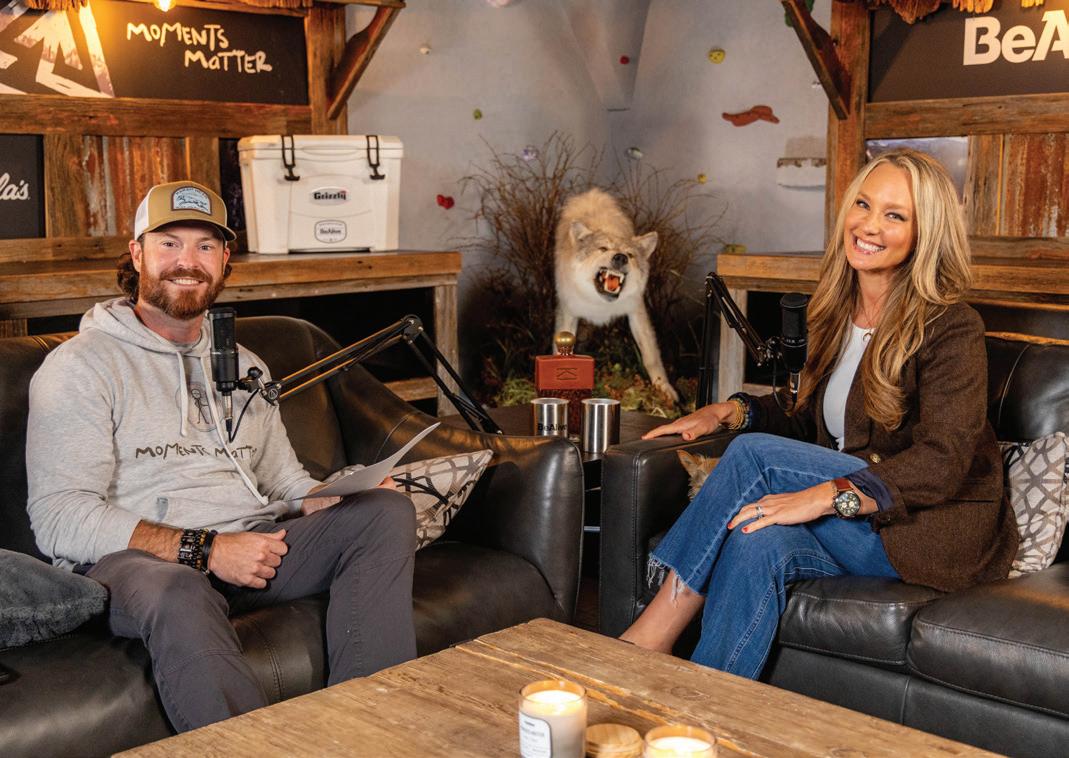
Cody, another brother, works with their father in a family real estate operation, while Chris’s wife, Katie, is a regular participant on the BeAlive podcast.
“We also have the entire Keefer brothers ecosystem, like the hunting brands. We believe that stories have the power to change the world, and you’ve got to tell them, and our authenticity is storytelling,” he says.
“We’ve also launched podcasts, and we do marketing and production work for companies that are looking to tell their stories.”
Ask Keefer to pick a favorite tale or project and he’s stumped, but not for long.
“One near and dear to my heart is a film we made called ‘Keepers of the North,’ which was about a trip to the Gulf of Alaska where we picked up metric tons of ocean trash that was coming out of the rivers and up the Gulf — but Alaska doesn’t have any infrastructure for recycling.”
The challenge for Keefer and his team was to somehow get the trash to a plant operated by the Center for Regenerative Design & Collaboration, which recycles plastic waste.
“We have 30 to 40 different sponsors across the entire organization, and we worked with FedEx on the logistics to get the trash from Alaska to Pennsylvania, where the CRDC plant is, and we changed all of that plastic into bricks, pavement, road signs, and other usable products,” he notes.
“That project was a great example of companies coming together to achieve what we say is progress over perfection. Dow, FedEx, Pyxera Global, CRDC, and the Alliance to End Plastic Waste were all partners on the project.”
To date, the film has drawn millions of views across all the different platforms the company utilizes. What’s more, funding came in from multiple sources, and now the CRDC is planning on putting a recycling facility in Alaska.
“I think we did 56 (filming) projects last year alone, so I’m still very much boots on the ground, filming, doing all kinds of different stuff,” Keefer says. “That’s kind of my day job. It’s all about relationships.”
Above, the film crew for “Keepers of the North,” which covered the clean up of trash in the Gulf of Alaska.
Left, Chris and his wife, Katie, recording a podcast. The wolf that attacked Chris, now mounted, joins them.
To ensure those connections stay strong, he goes on the road every year, from early September through January.
“And I still do ‘Dropped’ for 30 days a year, even if my insurance policy is a little higher these days,” he reveals.
Now 45, Keefer is happily settled in Midland, and the guy who believes he came back from the dead is savoring every moment armed with big goals and a plan for achieving them.
“If a company is part of the problem, then they need to be part of the solution,” he says. “ That’s our approach — progress over perfection, and lift all ships. At one point in my life, I was a deer guide. Now, to be a CEO and see the amazing things that are happening with Rivers Are Life — actual changes (are) coming to fruition.
“It’s just hard work and believing in yourself, more than anything, and here I am.”
The boating industry is poised for a comeback following lackluster sales last year, while more cruise ships and the return of tall ships will propel hospitality and tourism activity.
BY R.J. KING
As boaters, marinas, ports of call, and cruise ships prepare for a new season of recreation and relaxation on lakes and rivers across Michigan, industry forecasters see growth on the horizon.
Throughout 2024, while navigating inflation and rising interest rates, the boating industry continued to normalize following record demand during the COVID-19 pandemic.
Looking to 2025, the National Marine Manufacturers Association anticipates sales of new powerboats to begin to show growth signs, driven by innovative new products, changes in U.S. economic policies, and consistent consumer demand for on-water experiences.
With Americans continuing to hit the water in record numbers since 2020, U.S. boating expenditures in 2025 are expected to sustain those record highs, and come in as much as 3 percent to 5 percent above 2024’s final tally of an estimated $55 billion in sales.
Propelling growth are new freshwater fishing boats, one of the largest boat segments from a volume standpoint, along with new personal watercraft and pontoon boats — the latter a popular option among families.
In addition to providing a versatile experience, buyers are attracted to lower comparable price points and ease of use, whether renting a boat slip or towing their watercraft to a local waterway.
“As a uniquely American-made industry with 95 percent of boats sold in the U.S. having been made in the U.S., a focus on innovation by these American companies has provided a foundation for the growth of recreational boating,” says Frank Hugelmeyer, president and CEO of the National Marine Manufacturers Association.
“Trends in consumer preferences for flexibility, on-demand experiences, and easy-to-use technology — to name a few — have helped give rise to new ways to get on the water, making boating more accessible and versatile than ever.”
To help drive sales, the Michigan Boating Industries Association in Commerce Township, which produces the annual Detroit Boat Show every
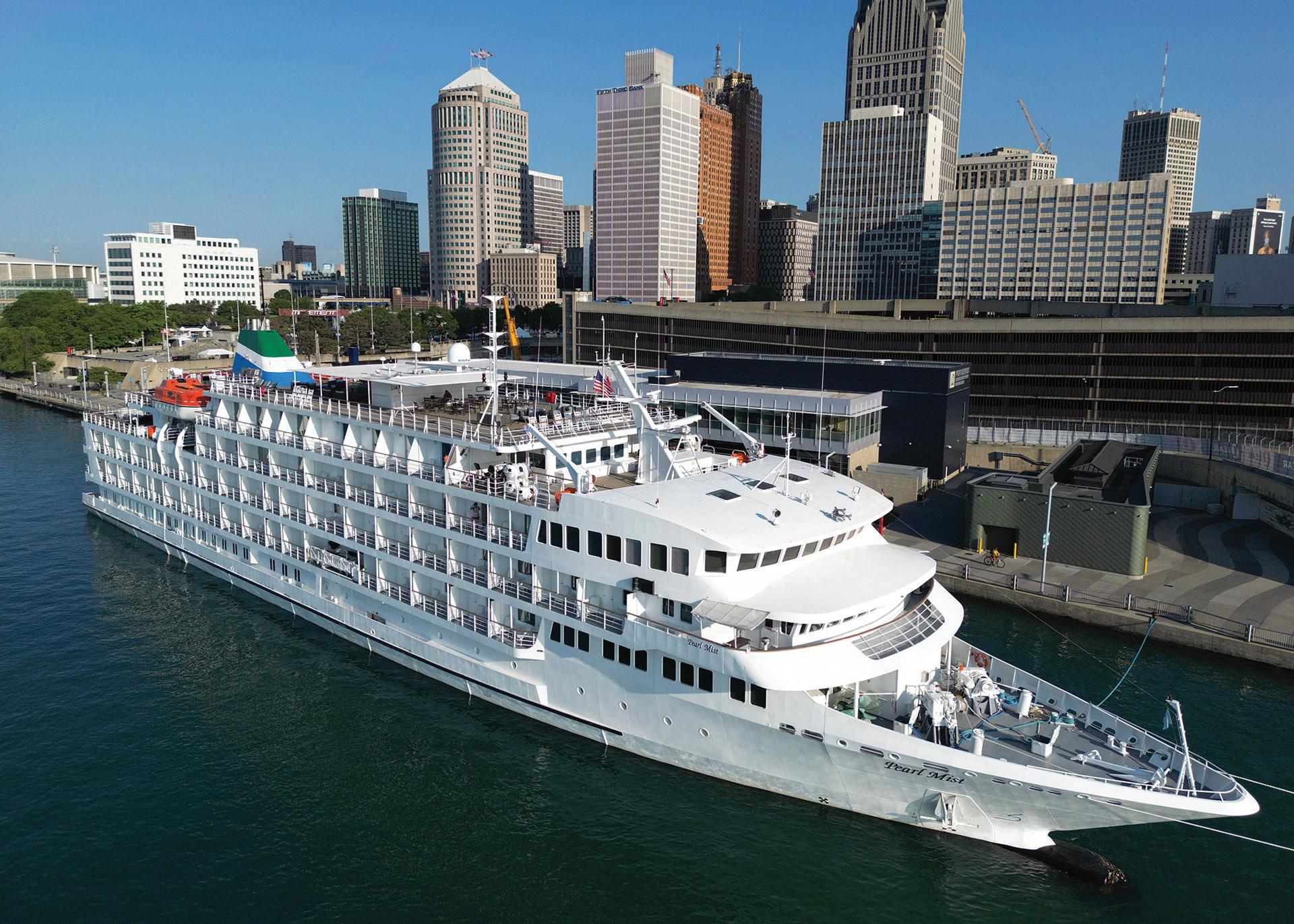

February, will help oversee the Great Lakes Boating Festival at the Grosse Pointe Yacht Club in Grosse Pointe Shores from May 17-18. The free event will include multiple watercraft, marine products and services, and in-water demos.
In another sign of maritime growth in 2025, six premier cruise lines will ply the Great Lakes this summer and fall, up from four last year. The six companies will be operating eight vessels — believed to be the largest number of recreational ships on the Great Lakes in more than half a century.
Cruise lines scheduled to operate on the Great Lakes in 2025 include Pearl Seas, Viking, St. Lawrence Cruise Lines, Ponant, Hapag-Lloyd, and Victory. Victory Cruise Lines announced in 2024 that it would return to the Great Lakes in 2025, bringing its luxury vessels, Victory I and Victory II.
“As we look to 2025, we’re excited to see continued growth in the Great Lakes cruise sector,” says Cathleen Domanico, tourism director for Cruise the Great Lakes. “We forecast this upcoming season to be even stronger than 2024, both in terms of passenger numbers and economic impact, which underscores the appeal of cruising on the Great Lakes.”
Founded in 2018, Cruise the Great Lakes is a marketing effort focused on attracting more passengers. It’s a forum to bring together the states, provinces, cruise lines, ports, convention and visitors bureaus, chambers of commerce, associations, and others to work toward shared goals.
The program is an initiative of the Chicago-based Council of Great Lakes St. Lawrence Governors and Premiers, which includes leaders from the eight states and two Canadian provinces bordering the Great Lakes and the St. Lawrence River.
This year, Great Lakes cruises are projected to welcome more than 22,000 individual passengers, representing a nearly 10 percent increase from 2024. It also forecasts more than 700 port visits planned, up almost 30 percent from last year, and it projects $230 million in economic impact across the area in 2025, reflecting a 15 percent increase from last year.
Overall, Michigan ports of call this year include Detroit, Bay City, East Tawas, Holland, Houghton, Mackinac Island, Marquette, Muskegon, Sault Ste. Marie, and Wyandotte. The cruises run from May to October, with stays as long as 14 nights.
$55B
Estimated U.S. boat sales in 2024
$230M

Apart from personal adventures, for the first time since 2001, when the city celebrated its 300th anniversary, a fleet of tall ships from around the world will sail into the Motor City for the Sail Detroit festival from Aug. 7-10.
Organized by the Detroit/Wayne County Port Authority, the family-friendly event will feature tall ships in a variety of sizes and styles. Most of the activities will be centered at the Port Authority headquarters, located between Hart Plaza and the Renaissance Center.
Ships are scheduled to arrive on Aug. 7, traveling along the riverfront before tying up for three days of public access and viewing from Aug. 8-10.
Accessing Detroit through the St. Lawrence River, Lake Ontario, and Lake Erie, the Port of Detroit is one of several Great Lakes stops in the 2025 Tall Ships Challenge. The armada also will also make stops at Duluth, Minn., and Erie, Pa., among other ports.
For the first Sail Detroit in 2001, more than a million visitors reportedly gathered at the waterfront to
board and experience an array of tall ships moored along the river’s edge. The second rendition of Sail Detroit will honor the city’s maritime history.
“Sail Detroit 2001 was a monumental moment for our city, and we’re so excited to bring tall ships back to Detroit,” says John Jamian, director of operations of the Port Authority. “As we saw, there’s something about the majesty of tall ships that unites us all. And there’s nothing quite like seeing these vessels from on board.”
Corporate outings, special group tours, and a one-of-a-kind captain’s dinners are being organized around Sail Detroit.
“There are so many lessons that can be taught with these ships,” says Mark Schrupp, executive director of the Port Authority. “Our guests will learn about maritime careers, history, sustainability, and Detroit as an important port when they come down to see the ships. The Port Authority footprint on Atwater Street (at Bates Street) will be transformed into an amazing hub of fun during this special celebration of Detroit’s greatest asset, its water.”
Sources: Cruise the Great Lakes, National Marine Manufacturers Association

Battle Creek native John Clark Sheehan developed a synthetic version of penicillin that has been used to save countless lives around the world.
BY NORM SINCLAIR
The diverse interests and achievements of the family into which he was born in Battle Creek in 1915 were an indication John Clark Sheenan could have been successful in any career in which he had an interest.
Few could have predicted, however, that the youngster who excelled in yo-yo competitions, shooting marbles, and playing tennis would become a talented organic chemist who was solely responsible for developing a synthetic version of penicillin that made the antibiotic drug widely available.
Sheehan’s achievement of synthesizing penicillin was even more remarkable because he succeeded after hundreds of other scientists, working for years in dozens of laboratories in the United States and Britain, had failed in their attempts to do the exact same thing.
The backdrop of Sheehan’s success began with his father, Leo, who left home at age 15 and landed a job as a reporter at a newspaper in California. After honing his writing skills on the West Coast, Leo Sheehan returned home and joined the Battle Creek Inquirer as a police news reporter and a sports editor.
He went on to become the managing editor of the newspaper, and a confidant and ghost writer for Frank Murphy, a former Michigan governor and Supreme Court justice.
Sheehan’s mother, Florence, was a genealogist and later became the Michigan registrar for the Daughters of the American Revolution.
His paternal grandfather, John W. Sheehan, was a prominent lawyer who counted among his clients William Jennings Bryan, the famous politician and orator. His maternal grandfather, Nathaniel Y. Green, was a banker with a strong interest in science, nature, and learning. He encouraged Sheehan’s interest in science, giving the boy an advanced Zeiss microscope. He also introduced his grandson to the curator of the local museum, who helped him with several small science projects.
Green was hooked on astronomy. He had a telescope for astronomical observations that he shared
MOLD MAN
In 1957, following years of research, John Clark Sheehan created synthetic penicillin V. The discovery made the antibiotic drug widely available.
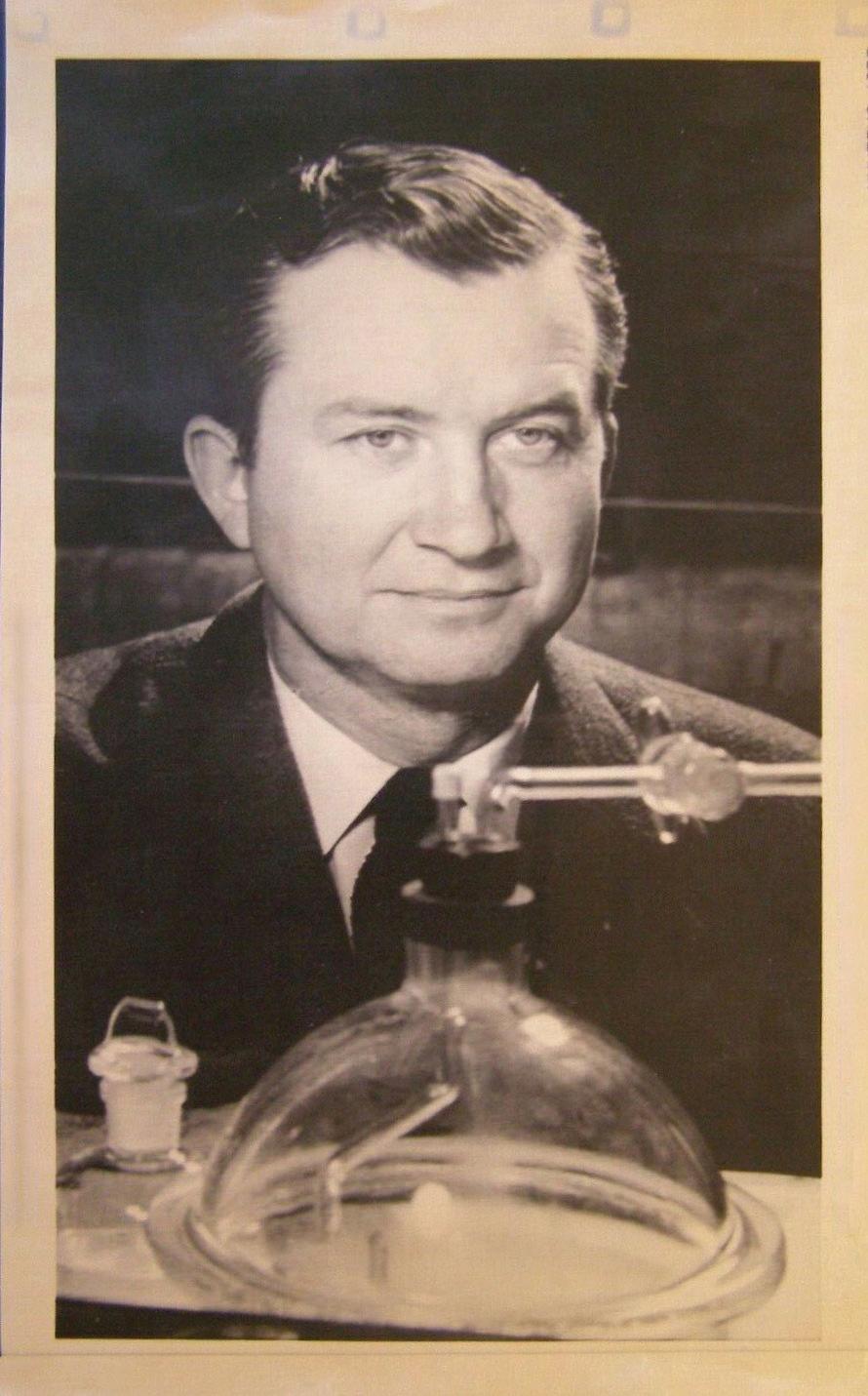
with his grandson, and he frequently took the boy with him to meetings of a local group of astronomy buffs.
As a youth, Sheenan also became interested in rocketry and explosives. Grandfather Green gave him a chemistry set, and the youngster built small rockets and experimented with chemicals to produce small-scale explosions to propel the rockets. Another of the young Sheehan’s interests was building model airplanes. One of his designs with a delta wing won first prize for the longest flight time in a competition Sheehan had entered.
When he wasn’t doing experiments with Grandfather Green, young Sheenan enjoyed outdoor activities and sports. He was a state champion marble shooter in elementary school, a citywide yo-yo champion, and later on a football player.
Sheehan attended Battle Creek College, where he was recognized as the school’s best tennis player. He graduated as the valedictorian of his class and won a scholarship to the University of Michigan in Ann Arbor, where he studied organic chemistry, earning a master’s degree in 1938 and a Ph.D. in 1941.
That same year, Sheenan married Marion Jennings, his high school sweetheart. The couple were married for 50 years, and would have three children.
During his doctoral work, his adviser at U-M was Professor Werner E. Bachman, a Detroiter who was researching the synthesis of steroid hormones. Because of Bachman’s expertise with synthesizing compounds, the professor was tapped in the summer of 1940 by the newly formed National Defense Research Committee to work on a project to commercially produce and adapt for warfare a powerful powder nonatomic explosive known in Britain as RDX (Royal Demolition Explosive), or cyclonite in the United States.
Sheehan’s early interest in launching small rockets put him in good stead, as Bachman recruited him to be his main collaborator on the project.
As it turned out, their partnership produced an explosive charge that was perfect for the heads of rockets, aerial bombs, and torpedoes.
e synthetically mass-produced and powerful explosive is credited with giving the Allied war e ort a huge advantage in World War II. For instance, it was used in the torpedoes that sank the battleships Tirpitz and Bismarck, the pride of the German Navy. e heavily armored ships had been billed as unsinkable.
Sheehan’s experience with that project convinced him he could apply his knowledge of organic chemistry to work on practical, everyday problems that would bene t others.
Having su ered from pneumonia and mastoiditis earlier in his life, he chose to work on developing antibiotics, especially natural penicillin — a drug that was discovered more than 30 years earlier.
Scottish bacteriologist Sir Alexander Fleming rst produced penicillin in 1928 by fermenting penicillium mold, a discovery that touched o worldwide demand for the antibiotic. Mass production, however, was almost as elusive as the discovery itself. Chemists and scientists the world over were ba ed by the composition of the drug.
During World War II, the United States government organized a massive e ort to identify the chemical structure of penicillin, and to chemically reproduce it in mass quantities to treat wounded military personnel.
e e ort, which some compared to the push to develop the atomic bomb, had a $20 million budget, and more than 1,000 chemists were deployed in 39 laboratories in the U.S. and Britain.


According to Time magazine, one group produced a tiny quantity, but their process was so complicated the e ort was abandoned as impractical for production.
One chemist did succeed momentarily in synthesizing penicillin, but the process was so laborious that as soon as he accomplished the feat, he blanked out on his methodology and couldn’t gure out how he had done it. As hard as he tried, he could never again nd the magic formula.
After the war, most chemists and researchers gave up on the quest to produce synthetic penicillin. Some said it couldn’t be done.
Following graduation, Sheenan worked with Merck as a senior research chemist. While there, one of the compounds he developed was vitamin B6.
However, he never wavered from his vision of mass-producing the penicillin antibiotic. After ve years at Merck, he resigned in 1946, accepted a 50 percent pay cut, and joined the faculty at the Massachusetts Institute of Technology as an assistant professor in chemistry.
Sheenan was unlike his young peers, who shunned projects they anticipated would take a long time to complete. Many reasoned years spent on a project would deny them exposure to faculty tenure committees through their experiments and published research papers.
Sheehan, though, was convinced that solving the problem was too important not to take it on.
“At MIT, I was a research committee of one,” he explained in his 1982 book, ‘The Enchanted Ring: The Untold Story of Penicillin.’ “I could make the decision to spend the rest of my life on the penicillin problem; it was only my career that was on the line.”
CARBON, C: GREY
HYDROGEN, H: WHITE
NITROGEN, N: BLUE
OXYGEN, O: RED
SULFUR, S: YELLOW

Sheehan registered around 40 patents, including for antibiotics, peptides, alkaloids, and steriods. The organic chemist also developed Ampicillin (shown), a semi-synthetic penicillin that is taken orally rather than by injection.


e crucial obstacle he had to overcome was nding a way to modify the fragile penicillin molecule by bonding a carbon atom and a nitrogen atom to form a chemical ring in the penicillin molecule. None of the known reagents in use at the time could be applied to that task.
“ e appropriate techniques and reactions for putting together the penicillin molecule simply had not yet been discovered,” he wrote. Using traditional techniques available at that time was like “placing an anvil on top of a house of cards,” or “attempting to repair a ne watch with a blacksmith’s sledge and anvil,” Sheehan said.
During his nine-year pursuit of the penicillin molecule, he was assisted nancially by Bristol Laboratories in Syracuse, N.Y., along with research assistance from Merck.
Finally, in 1957, Sheehan announced he had succeeded in creating synthetic penicillin V, described as one of the most useful forms of the natural antibiotic derived from the penicillin mold.
A byproduct of that initial work was his discovery of the formula for hundreds of other kinds of synthetic penicillin that could be customized to target speci c bacteria. Among Sheehan’s inventions was Ampicillin, a semi-synthetic penicillin that is taken orally rather than by injection.
In his years at MIT, Sheehan registered some 40 patents with the United States Patent and Trademark O ce. Some of those patents were for other antibiotics, for peptides (the chains of amino acids that are the building blocks of protein), and for various alkaloids and steroids.
MIT eventually received almost $30 million in royalties from Sheehan’s patents, some of which was used to establish the John C. Sheehan Professorship of Chemistry. He retired from MIT in 1977.


Among the honors he earned were the American Chemical Society Award in Pure Chemistry (1951), election to the National Academy of Sciences (1957), the American Chemical Society Award for Creative Work in Synthetic Organic Chemistry (1959), the John Scott Award for inventors bene ting mankind (1964), the Outstanding Achievement Award of the University of Michigan (1971), and honorary doctorates from Notre Dame (1953) and the Stevens Institute of Technology (1980).
While at MIT, Sheenan served a two-year stint as a scienti c liaison o cer with the U.S. Embassy in London for the O ce of Naval Research (1953-54). He also was named a scienti c adviser to Presidents Kennedy and Johnson.
John C. Sheehan died at age 76 on March 21, 1992, in Key Biscayne, Fla.
E.J. Corey, a chemistry Nobel laureate and Harvard University professor for whom Sheehan served as a mentor at MIT, remembered Sheehan as “a very conscientious and very e ective teacher … the undisputed pioneer in the eld of penicillin chemistry after World War II. He had a vision and the ability to see important problems and to focus on them.”
How small businesses can use artificial intelligence to compete head to head with Fortune 500 corporations.
BY GINO RONCELLI
For many, the conversation around arti cial intelligence still feels like a high-stakes game reserved for Fortune 500 megacompanies.
We see large corporations leveraging AI to streamline operations, improve customer service, and gain data-driven insights.
But here’s the reality: AI isn’t just for big business. It’s already driving e ciency, accuracy, risk reduction, and productivity for businesses of all sizes.
potential hazards before they lead to injuries. is isn’t just about e ciency; it’s about making better decisions, faster.
For small businesses, this is a game-changer. Where it once took a dozen people to manage a project, now it takes three or four. at’s the power of automation and AI.
It allows smaller teams to punch above their weight, compete at higher levels, and drive greater
TODAY, AI ALLOWS SMALL BUSINESSES TO OPERATE WITH THE PRECISION, AGILITY, AND INTELLIGENCE OF MUCH LARGER ORGANIZATIONS.”
Roncelli isn’t a tech company. It’s a family-owned construction rm with a few hundred employees, operating regionally across seven states and Ontario. Although it’s a small business, AI is already a crucial part of our processes.
We’ve integrated AI-powered software across our operations, linking our ERP (Enterprise Resource Planning), HRIS (Human Resources Information System), and Project Management software into a single, real-time data platform. We’re using AI to predict which job sites are at higher risk for accidents, which projects are ahead or behind schedule, and which ones are likely to stay within budget.
ese insights allow us to act faster, mitigate risks, and operate more e ciently. If Roncelli — an oldschool construction company — can do this, so can your organization. AI has o cially moved from Wall Street to Main Street, and if you’re not harnessing it, you’re falling behind.
One of the biggest misconceptions about AI is that it will replace human jobs. While AI does automate certain tasks, it’s not replacing people — it’s empowering them. Across industries, AI is automating repetitive tasks, thus allowing team members to focus on higher-value work requiring expertise and judgment.
In our business, project managers no longer spend hours compiling reports manually. AI automatically pulls data from multiple sources, highlights key insights, and ags potential issues before they become problems.
In turn, estimators can analyze historical bid data faster, ensuring more accurate and competitive pricing, while safety teams can proactively address
value for their customers. As a general rule, the companies that embrace AI will thrive, while those that ignore it will languish.
If 2023 and 2024 were about businesses waking up to AI’s potential, 2025 will be about Agential AI — the next evolution in automation. Agential AI isn’t just a chatbot answering questions; it’s a platform that can reason and take action across multiple software systems.
In the near future, AI will move beyond insights to executing tasks, streamlining work ows, and acting as a true digital assistant.
If you don’t know what Agential AI is, now is the time to learn. Your competition certainly is. And as this technology becomes more accessible, the gap between businesses that embrace AI and those that don’t will only widen.
e AI revolution is happening right now. At our company, AI has already changed how we work, helping us deliver better results to our clients while making our teams more e ective. And we’re not unique.
If a 60-year-old commercial construction company can embrace this new reality, you absolutely can, too.











Almost all of our team members are using tools like ChatGPT and Microsoft CoPilot daily. However, these AI assistants aren’t just connected to the internet, they’re also connected to our real-time work data. is means our team members get immediate insights from actual project data, improving decision-making and e ciency.
these AI assistants aren’t just connected to the internet, they’re also connected to our real-time work data. is means our team members get immediate insights from actual project data, improving deci-







AI isn’t just a tool for reducing costs, it’s a strategic sizes







AI-driven insights that were once only available to corporations with massive data science teams and budgets. Today, AI allows small businesses to operate




AI isn’t just a tool for reducing costs, it’s a strategic advantage. Businesses of all sizes now have access to AI-driven insights that were once only available to corporations with massive data science teams and budgets. Today, AI allows small businesses to operate with the precision, agility, and intelligence of much larger organizations.








If you’re a small business wondering whether AI is me leave you with this: If you don’t take AI seriously, your competition will. And in an increasingly competitive world, that’s a risk no business can a ord to take.
If you’re a small business owner or a leader still wondering whether AI is worth the investment, let me leave you with this: If you don’t take AI seriously, your competition will. And in an increasingly competitive world, that’s a risk no business can a ord to take.



And it doesn’t have to be a massive, ware partners, it’s likely they’re already
If you’re working with leading software partners, it’s likely they’re already building AI into their platforms — but know that you have to be diligent in choosing the right partners and integrating them properly.
is isn’t some huge, daunting transformation. It’s about being smart, selecting correctly, and moving fast.


And it doesn’t have to be a massive, expensive overhaul.




























It’s no longer a question of whether AI is coming for your industry, because it’s already here. e real question is if, and how, it can be used to
It’s no longer a question of whether AI is coming for your industry, because it’s already here. e real question is if, and how, it can be used to stay competitive.








DIAMOND SPONSOR


Founded in 1954, The Association of Corporate Growth (ACG) is the premier M&A deal-making community with a mission of driving middle-market growth. ACG’s global network operates within 61 local markets worldwide and comprises more than 100,000 middle-market professionals who invest in, own and advise growing companies. ACG Detroit, established in 1984, facilitates a variety of content and networking events for members across the metro Detroit area to drive middle-market growth. To earn more, visit www.acg.org/detroit. Thank
RUBY SPONSORS


SPONSORS

ALL STAR DEAL OF THE YEAR OVER $50M IN REVENUE
Huron Capital Sale of ExperiGreen Lawn Care to Wind Point Partners
ALL STAR DEAL OF THE YEAR UNDER $50M IN REVENUE N.A. Mans & Sons, Inc. Acquisition of Michigan Timber & Truss, Inc.
ALL STAR ADVISOR OF THE YEAR
Matthew VanWasshnova, Partner, Honigman
ALL STAR INVESTMENT BANKER OF THE YEAR Chris Caron, Managing Director, Blue River Financial Group
RISING STAR OF THE YEAR
Ashley Gray, Managing Director, Aquila Equity Partners
ALL STAR DEALMAKER OF THE YEAR PMCF Investment Banking
THOMAS S. VAUGHN LIFETIME ACHIEVEMENT AWARD Mike Kulka (Posthumous), Co-Founder and Former CEO, PM Environmental Inc.




PATRICK GLORIA
The Reimagine Life Foundation (RLF), a nonprofit dedicated to helping people rebuild their lives after a serious illness or injury, staged its Dancing with Our Stars event on March 21 at the Sound Board inside the MotorCity Casino. The event paired community leaders and health care professionals with professional dancers to compete for the Mirror Ball Trophy. Proceeds from the event support the RLF adapted sports program, including Dance Mobility, believed to be Michigan’s sole free ballroom dance program for people with disabilities.
1. Tommy Stowers, Brittney Morgan, Erica and Bradley Balsis
2. Jennifer Payne, Dan Moder, Jacalyn Langenstein
3. Heath Krumlauf, Jessica Brooke Williams
4. Jennifer Nowakowski, Maciej Pietrowicz, Erica Mitra
5. Montoya Curry-Smith, Briannea Taylor


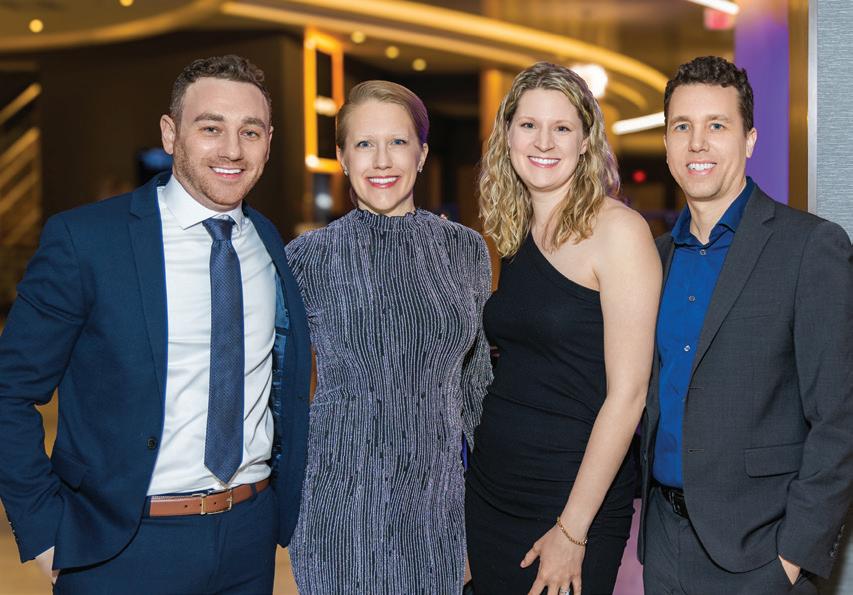

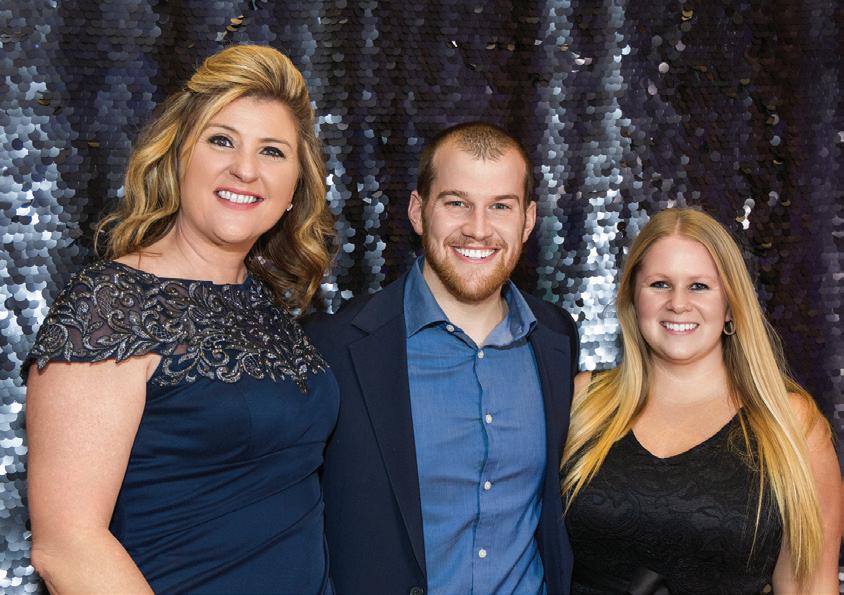

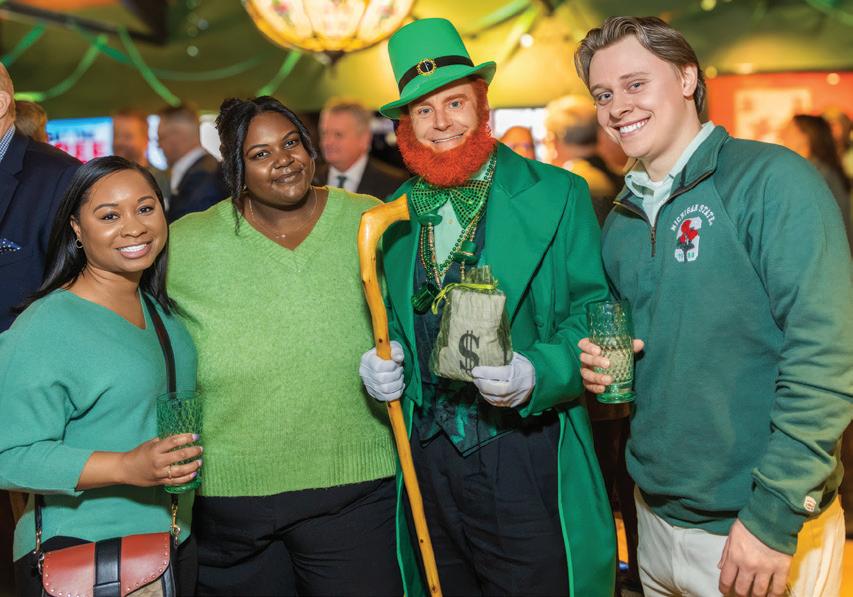

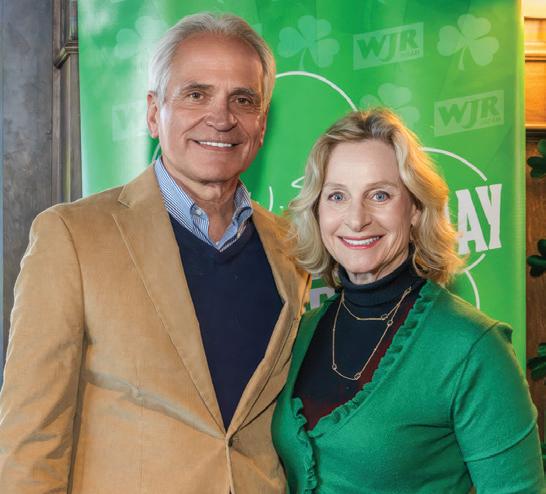
PATRICK GLORIA
The Midwest Independent Retail Association hosted its 107th Annual Gala on March 15 at the Shenandoah Country Club in West Bloomfield Township. The formal evening honored Detroit Mayor Mike Duggan, MIRA’s 2025 Elected Official of the Year. Guests were able to network while enjoying cocktails, followed by a plated dinner, dancing, interactive photo booths, games, cigars, and more.
11. Arkan Houbba, Nada Houbba, Louis Denha, Maranda Denha
12. Mike Cavin, Ron and Evonne Barkho, Nabby Yono
13. Jeff and Jennifer Jedrusik
14. Mark Wilson, Kate Jacobs, John Moore
15. Nevin Denha, Najham Attisha, May Semma
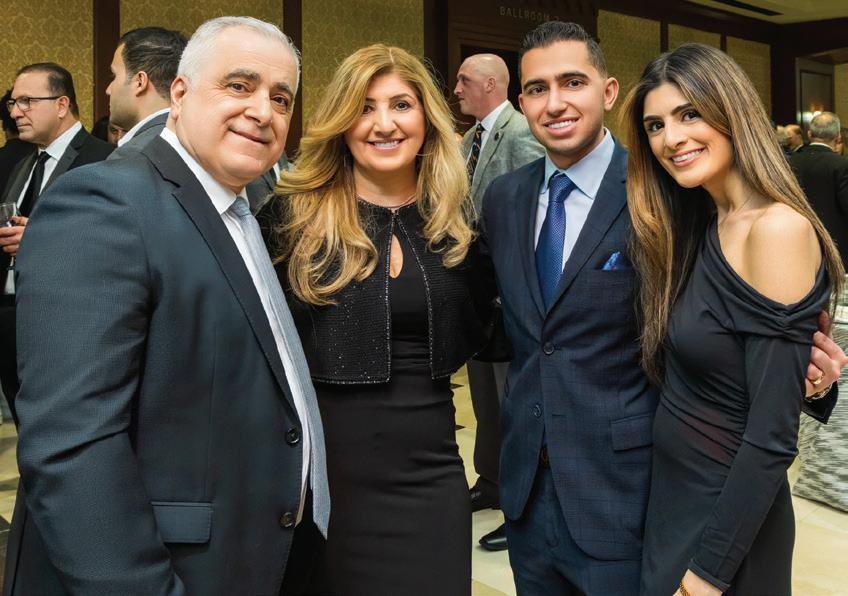


PATRICK GLORIA
WJR Radio 760 AM broadcast its 40th annual St. Patrick’s Day celebration from Doyles Irish Pub at Saint John’s Resort in Plymouth Township on March 17. Carrying on the tradition started by legendary host J.P. McCarthy, Paul W. Smith interviewed business, civic, and community leaders from across southeast Michigan during his radio show. Live Irish music, Irish cuisine, and green beer also were part of the festivities.
6. Cale Johnson, Jim Klein, David Peabody
7. Jasmine Brown, Adia Robbins, L. Gary Kirsh, Nolan Czaja
8. Jessica Kado, Luke Heskett, Rachel Kado 9. Kurt Presley, Kelly Presley
10. Robert and Mary Ann Bury
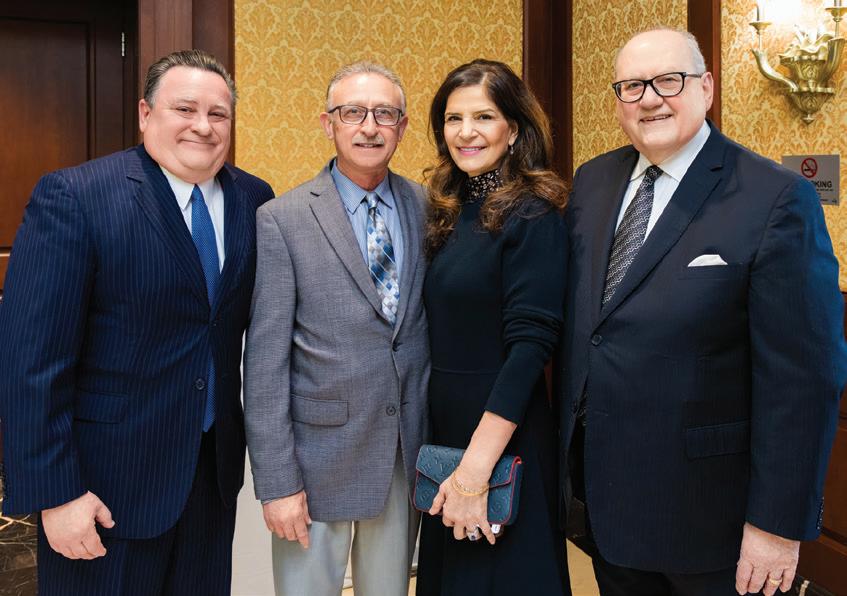
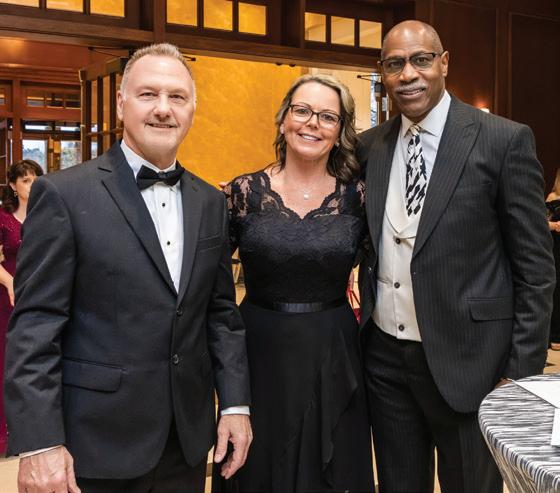


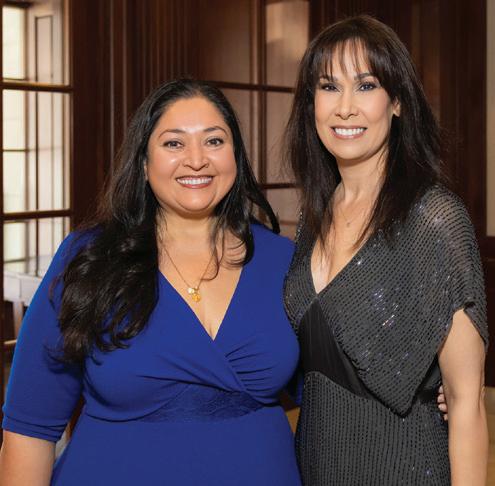
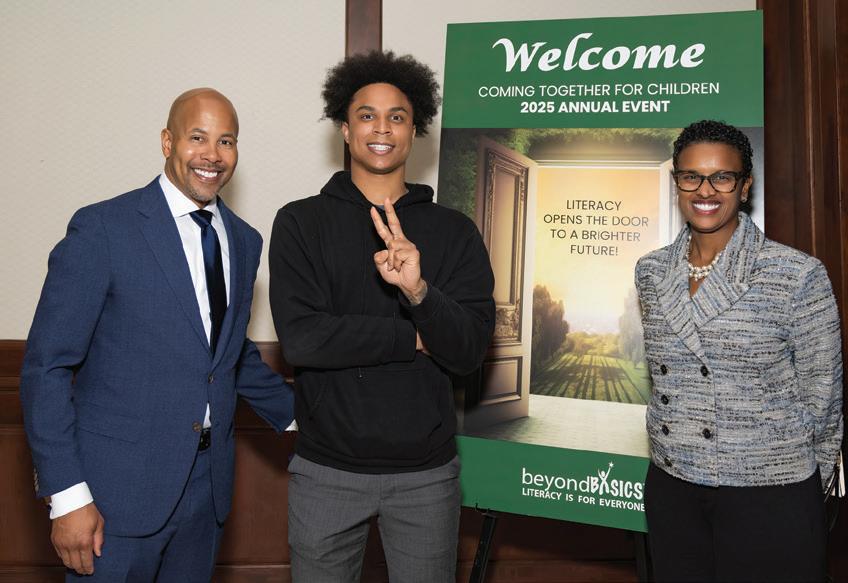
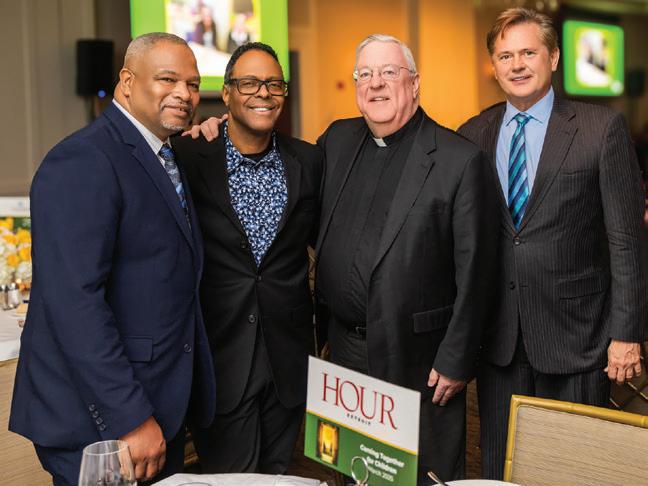
PATRICK GLORIA
Approximately 1,000 people attended the Medallion Gala 2025, which took place on March 8 at the Palazzo Grande in Shelby Township. The black-tie event was hosted by Henry Ford Health, with proceeds dedicated to the continued transformation of Henry Ford Macomb Hospital and its goal of establishing the first fully private-room hospital in Macomb County. The event included a plated dinner, dancing, and a grand package raffle.
6. Jeffery Willians, Hon. David Viviano, Lomas Brown
7. Chris Milback, Mason Dixon, Jason Champine, Jamie Sand
8. Larry and Kimberly Plourde, Sam Skeltis
9. Balaji Pillai, Mohammed and Faseeha Rehman
10. Tina and Tony Gallo
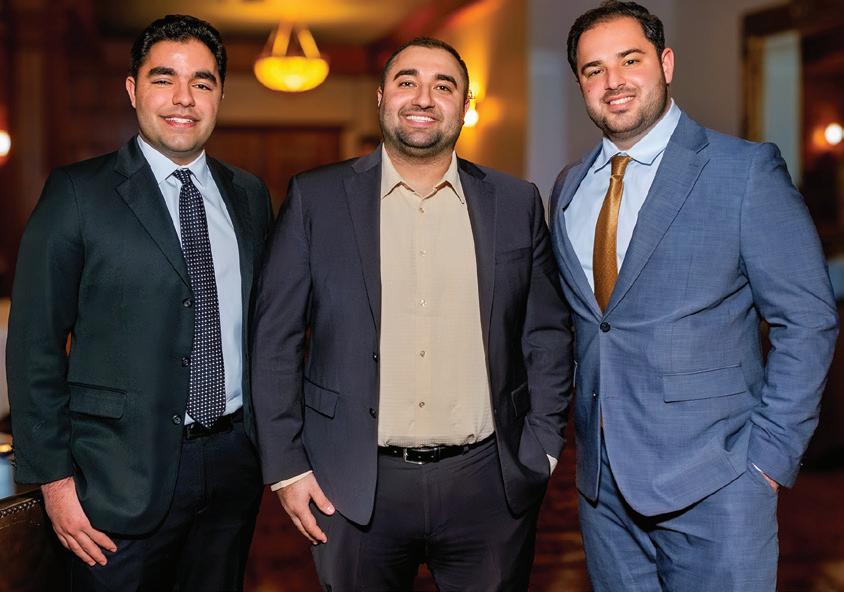
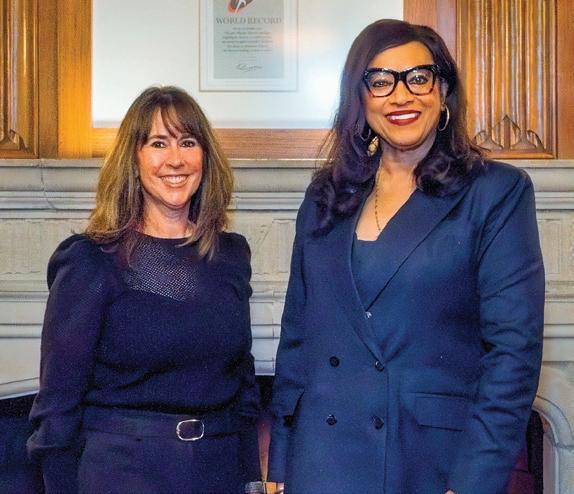
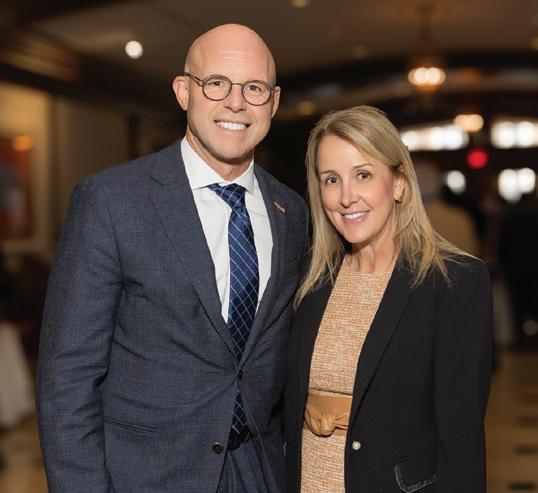

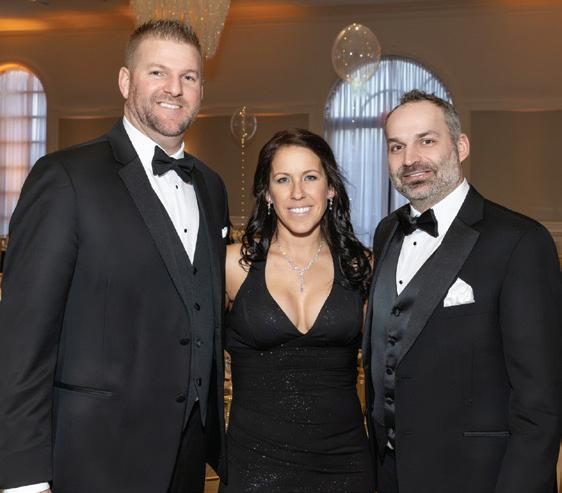
PATRICK GLORIA
Beyond Basics, the Farmington Hills-based nonprofit working to eradicate illiteracy, hosted its Annual Dinner on March 14 at the Townsend Hotel in Birmingham. The organization honored leaders from the sports, private education, and public sectors who have empowered students by helping them achieve reading proficiency. The presenting sponsor was Discount Tire. Additional sponsors included Globe Midwest Adjusters International, the Torgow Family, the Farbman Group, Healthrise, MassMutual Great Lakes, Hour Media, and others.
1. Patricia Mooradian, Zan Nicolli, Susan Sherer
2. Derron Sanders, Damari Covington-Woods, Selam Sanders
3. Hon. Sima Patel, Hon. Shalina Kumar
4. Darryl Woods, Detroit Police Chief Todd Bettison,
Msgr. Charles Kosanke, Hon. Steve Bieda
5. Claude and Kelly Molinari
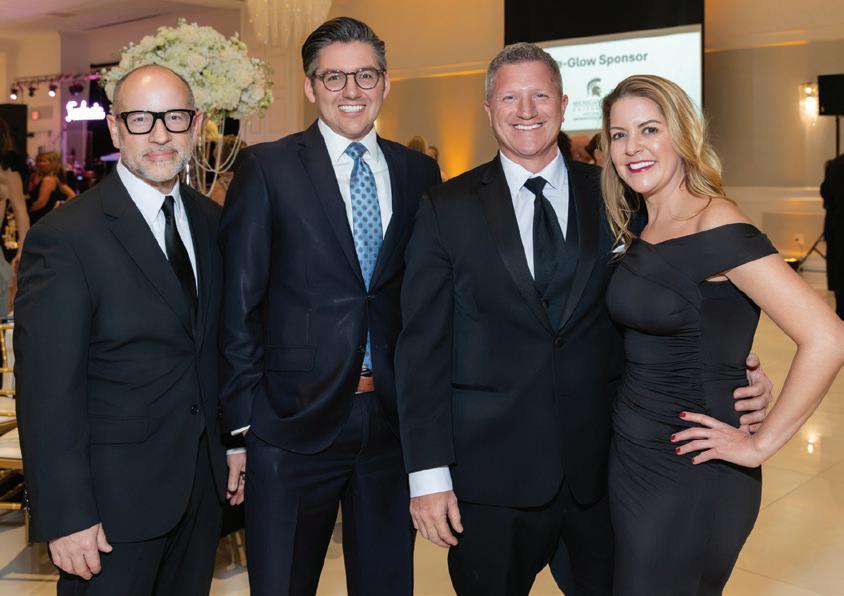
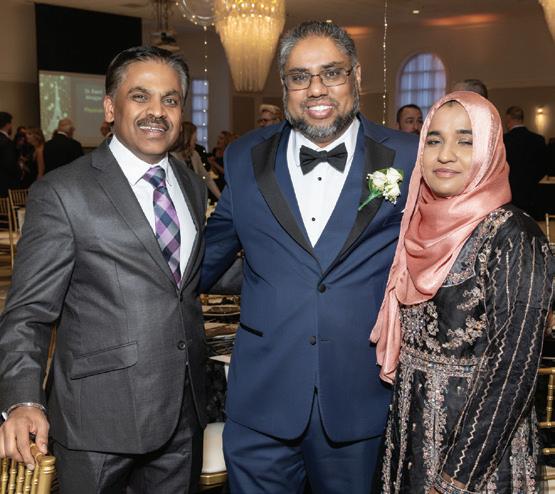

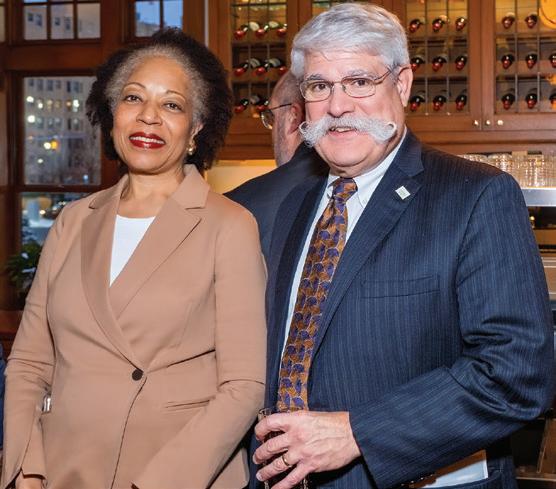
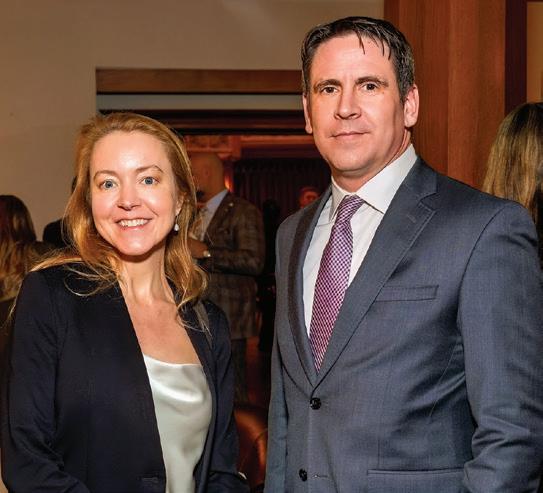
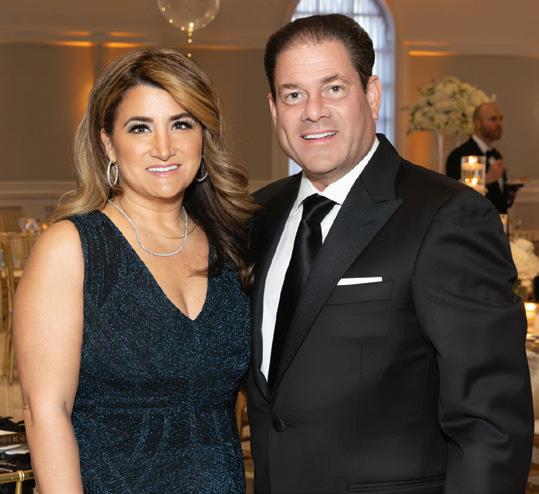
PATRICK GLORIA
The State Bar of Michigan hosted its seventh annual Business Law Symposium, titled Mediation Mastery, on Feb. 13 at the Gem Theatre in downtown Detroit. The program featured individual speakers and panel discussions regarding negotiation and mediation strategy and method. Presenters included Megan Bonanni, Charles “Chip” Brower, Thomas Cranmer, Dan McCarthy, Tom McNeill, E. Powell Miller, Hon. Denise Langford Morris (Ret.) Hon. Julie Nicholson (Ret.), Jerome Rock, and Mark Rossman.
11. Cameron Jajonie, Dilan Kama, Paul Qarana
12. Daniel Agauas, Tyler Gaastra
13. Hon. Julie Nicholson, Hon. Denise Langford-Morris
14. Lisa Simmons, John Sier
15. Sara MacWilliams, Derek Howard

June 9, 11 a.m. to 1 p.m.
auburnhillschamber.com
Women Empowered! brings together women from the community to advance careers through knowledge, networking, and professional development. Attendees will gain key insights from a panel of leading female executives, including Kathryn Baker, president of Auxiom; Kim Clark, executive vice president of Marsh McLennan Agency; and Jill Dralle, vice president and chief operating officer of Nexteer Automotive USA. The discussion will be moderated by Joscelyn A. Davis, president and CEO of JADE Strategies Inc. Sponsorship opportunities are available. For more information, contact info@ auburnhillschamber.com or call 248-853-7862.
June 13, 5 p.m. to 10:30 p.m. tickettailor.com/events/ausaaod/1539421
The Arsenal of Democracy Chapter of the Association of the United States Army will host the U.S. Army 250th Birthday Ball on Friday, June 13, at the Westin Book Cadillac Detroit hotel. The event will feature military tributes, special guest speakers, networking, and entertainment to honor the Army’s 250-year legacy of courage and sacrifice. For details, visit ausa.org
June 16 corewellhealth.org/foundation/southeast/events





Corewell Health Foundation Southeast Michigan presents the Women’s Health Care Classic on Monday, June 16. Join us to support women’s health services and breast care programs offered by Corewell Health hospitals in Dearborn, Taylor, Trenton, and Wayne. Now a one-course event at the Dearborn Country Club, the day includes an 18-hole tournament for men and women in the morning and a nine-hole women’s only round in the afternoon. Attendees will enjoy a day of golf complemented by food and refreshments, a pro shop shopping experience, contests, and a cocktail reception with an award ceremony. For sponsorship opportunities, please contact karen.whetter@corewellhealth.org
June 20, 7 to 11 p.m. detroitzoo.org
Party with a purpose at the Detroit Zoo’s annual fundraising event Sunset at the Zoo presented by KeyBank. From 7 to 11 p.m. on June 20, guests can enjoy food from metro Detroit’s top restaurants, sip summer cocktails, and dance the night away — all while supporting a meaningful cause.
June 23-25
powerconnectionsco.com/commercial-real-estate-event-2025


Power Connections Commercial Real Estate, taking place June 23-25, is a premier event designed to foster collaboration and innovation. Bringing together over 400 industry professionals, including CEOs and C-suite executives, the conference features expert-led discussions and the region’s largest one-on-one speed networking session. Attendees gain valuable connections, strategic insights, and business opportunities.
June 23, 5:30 to 11 p.m. theparade.org

You’re invited to the biggest and most spectacular event of the summer — The Parade Co.’s Ford Fireworks Rooftop Party, presented by Ford Motor Co., Monday, June 23, from 5:30 to 11 p.m. Produced by The Parade Co., the 67th Ford Fireworks is one of the country’s largest and most stunning displays, and this night atop the Center Garage provides the best seats in the city. Bring the entire family to enjoy delectable food by Andiamo, games, giveaways, live music, and more! The Ford Fireworks will light up Detroit’s skyline at dusk, offering picturesque views of the Detroit River and downtown. The Rooftop Party is another amazing event from The Parade Co., and proceeds benefit the Michigan Thanksgiving Parade Foundation. Tickets, subject to availability, are $350; children 6 and under get in for $125. To purchase tickets, please call 313-923-7400 or visit theparade.org

May 5
lung.org

The Detroit Fight for Air Climb, set for Comerica Park, challenges participants to climb in support of those with lung disease. Firefighters and community members will ascend in a spirited atmosphere of hope. When you take part in the Detroit Fight for Air Climb, you’re supporting people with lung disease who are fighting for every breath.
May 7
acg.org

Join the celebration on Wednesday, May 7, at The Townsend Hotel to honor the M&A All Star Award winners for their outstanding work on deals completed in 2024. The evening will feature a brief awards ceremony led by Diamond sponsor Foley & Lardner, along with an open bar, gourmet cuisine, and ample networking opportunities. Attendees will have the chance to connect and strengthen relationships with peers and colleagues from across Detroit’s M&A community.
May 22, 8:30 to 9:30 a.m. detroitpublicsafety.org
Women in Blue is an annual event hosted by the Detroit Public Safety Foundation to celebrate Detroit’s female first responders. The event highlights the incredible women who serve with the Detroit Police and Fire departments. Women in Blue celebrates the first responders’ contributions and encourages women in leadership. Awards are given for the Women in Blue Officer of the Year and the DFD Woman of the Year along with keynote remarks by a strong female leader.
June 2
henryford.com/development/ways/events/providence-golf-classic
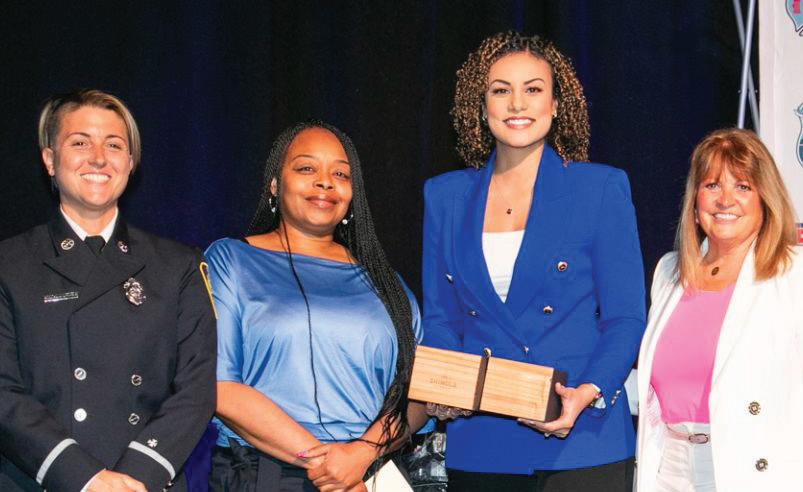
The Providence Golf Classic will take place on Monday, June 2, 2025, at Indianwood Golf & Country Club in Lake Orion. Proceeds from the event will support the Care of the Poor Fund and the Believe in Miracles Fund, which provide financial assistance to patients facing hardships. These funds help cover transportation costs, medical bills, equipment, utility bills, and other essential living expenses.
June 9 tour.diabetes.org


The American Diabetes Association invites individuals, families, and colleagues to ride in support of those with diabetes at the Tour de Cure at Domino’s Farms Petting Farm in Ann Arbor. The event brings together corporations, organizations, and community members to raise awareness, fund lifesaving research, and support vital programs. Proceeds help provide essential resources and advance efforts to find a cure for diabetes.
June 9, 9 a.m. to 5 p.m. corewellhealth.org/foundation/southeast Corewell Health Foundation Southeast Michigan, in partnership with the Mark Wahlberg Youth Foundation, is pleased to host the fifth annual Feldman Automotive Children’s Miracle Celebrity Invitational fundraising event, now in June. This unique celebrity golf event pairs every foursome with one of over 50 national and local celebrities from the world of entertainment and professional sports. The invitational provides a full day of golf on the premier courses of the Detroit Golf Club, all-day hospitality, and a live auction of over-the-top experiences. All proceeds benefit the Children’s Miracle Network at Corewell Health Children’s and the Mark Wahlberg Youth Foundation. For sponsorship details, contact charlotte.alex@corewellhealth.org or visit corewellhealth.org/celebrityinvitational.

(SELECTED BY AAA AND DBUSINESS FOR HOSPITALITY EXCELLENCE)
EAST LANSING
GRADUATE HOTEL EAST LANSING
133 Evergreen Ave.
East Lansing
517-348-0900
graduatehotels.com/east-lansing/ Rooms: 194
Meeting rooms: 2
Dining: Graduate Rock Bar, Poindexter
Coffee
Meeting capacity: 4,622 sq. ft.
MARRIOTT EAST LANSING AT
UNIVERSITY PLACE
300 M.A.C. Ave.
East Lansing
517-337-4440
marriott.com/lanea
Rooms: 181
Meeting rooms: 9
Dining: Bistro 43, Great Room
Restaurant and Lounge
Meeting capacity: 17,327 sq. ft.
GRAND RAPIDS
AMWAY GRAND PLAZA HOTEL, CURIO COLLECTION BY HILTON
187 Monroe Ave. NW
Grand Rapids
616-774-2000
amwaygrand.com
Rooms: 664
Meeting rooms: 42
Dining: Ruth’s Chris Steak House, MDRD, Lumber Baron Bar, Rendezvous, The Kitchen by Wolfgang Puck, Woodrows Duckpin, Starbucks
Meeting capacity: 47,120 sq. ft.
CITYFLATSHOTEL
83 Monroe Center St. NW
Grand Rapids
616-608-1720
cityflatshotel.com
Rooms: 48
Meeting rooms: 4
Dining: CitySen Lounge
Meeting capacity: 5,332 sq. ft.
EMBASSY SUITES BY HILTON
GRAND RAPIDS DOWNTOWN
710 Monroe Ave. NW
Grand Rapids
616-512-5700
hilton.com/en/embassy Rooms: 250
Meeting rooms: 5
Dining: Free breakfast and evening
reception, Whitewater Café & Lounge,
Big E’s Sports Grill
Meeting capacity: 6,176 sq. ft.
JW MARRIOTT GRAND RAPIDS
235 Louis St. NW
Grand Rapids
616-242-1500
ilovethejw.com
Rooms: 340
Meeting rooms: 9
Dining: Margaux, Jdek at Margaux, Lounge at Margaux, Six.One.Six, Starbucks
Meeting capacity: 15,756 sq. ft.
RADISSON HOTEL GRAND RAPIDS
RIVERFRONT
270 Ann St. NW
Grand Rapids
616-317-6874
radissonhotel.com
Rooms: 162
Meeting rooms: 2
Dining: River Rock Restaurant and Lounge
Meeting capacity: 2,232 sq. ft.
HOLLAND
TULYP HOLLAND, TAPESTRY COLLECTION BY HILTON
61 E. 7th St. Holland
616-796-2100
cityflatshotel.com
Rooms: 56
Meeting rooms: 4
Dining: 1847 Lounge, Koffie Coffee
Meeting capacity: 4,674 sq. ft.
KALAMAZOO
RADISSON PLAZA HOTEL & SUITES AT KALAMAZOO CENTER
100 W. Michigan Ave. Kalamazoo
269-343-3333 radissonkzoo.com
Rooms: 340
Meeting rooms: 26
Dining: Old Burdick’s Bar & Grill, The Morning Dish, Brick and Brine, Starbucks, room service
Meeting capacity: 50,000 sq. ft. LEXINGTON
THE CADILLAC HOUSE, TAPESTRY COLLECTION BY HILTON 5502 Main St. Lexington 810-359-7201 hilton.com/en/hotels/ dtwlxup-the-cadillac-house-lexington/ Rooms: 23
Meeting rooms: 2
Dining: Cadillac House Tavern & Bar
Meeting capacity: 1,629 sq. ft.
MACKINAC ISLAND
GRAND HOTEL
286 Grand Ave. P.O. Box 286 Mackinac Island 800-334-7263
St. Joseph 269-983-1111
harborshoresresort.com
Rooms: 92
Meeting rooms: 4
Dining: Plank’s Tavern on the Water, Plank’s Dockside Bar, Rise and Vine, Torch and Tapas
Meeting capacity: 13,000 sq. ft.
TRAVERSE CITY
GRAND TRAVERSE RESORT AND SPA
grandhotel.com
Rooms: 388
Meeting rooms: 17
Dining: Grand Hotel Main Dining Room, Grand Luncheon Experience, Grand Coffee & Provisions, Esther Williams Pool Bar, The Jockey Club, Mackinac Island Pizza Company, Woods Restaurant, The Gate House, Fort Mackinac Tea Room, Sadie’s Ice Cream Parlor. Cocktails available at Audubon Wine Bar, Cupola Bar, Geranium Bar, and Bobby’s Bar at Woods. In-room dining is also available.
Meeting capacity: 24,878 sq. ft.
MISSION POINT RESORT
One Lakeshore Dr. Mackinac Island 800-833-7711
missionpoint.com Rooms: 243
Meeting rooms: 13
Dining: Chianti, Round Island Kitchen, Bistro on the Greens, Boxwood Coffeeshop & Café, Lily’s Lemonade, Strait UP Coffee
Meeting capacity: 38,000 sq. ft. MIDLAND
THE H HOTEL
111 W. Main St. Midland 989-839-0500 thehhotel.com Rooms: 130
Meeting rooms: 11
Dining: ONe eighteen, Café Zinc, Oxygen Lounge, 24-hour room service Meeting capacity: 25,000 sq. ft. (10,000 sq. ft indoors/15,000 sq. ft. outdoors)
SOARING EAGLE CASINO & RESORT
6800 Soaring Eagle Blvd. Mount Pleasant GPS address: 2395 S. Leaton Rd. 989-775-5777
soaringeaglecasino.com Rooms: 514
Meeting rooms: 18
Casino tables: 70
Dining: Ascend Sportsbook Bar and Lounge, Food District, Johnny Rockets, Siniikaung Bistro, Legend’s Diner, Ruth’s Chris Steak House, Central Deli and Slice, Native Grind Coffee Shop, Little Eagle Café
Meeting capacity: 70,000 sq. ft.
ST. JOSEPH
THE INN AT HARBOR SHORES
800 Whitwam Dr.
The Grille, Jack’s Taproom, The Den Bar, Grand Lobby Bar, Marketplace, in-room dining
Meeting capacity: 86,500 sq. ft.
INN AT BAY HARBOR 3600 Village Harbor Dr. Bay Harbor 844-827-1959 innatbayharbor.com
Rooms: 105
Lakeside cottages: 23
Cottages at Crooked Tree: 15
Meeting rooms: 6
100 Grand Traverse Village Blvd. P.O. Box 404 Acme 231-534-6000 grandtraverseresort.com
Rooms: 525
Meeting rooms: More than 20 indoor and outdoor venues
Dining: Aerie Restaurant & Lounge, NIIJII Restaurant, Fin’s Sandbar,
Dining: The Sagamore Room, Inn Café, Vintage, Cabana Bar (summer only), Inn Café, The Links Grille Meeting capacity: 11,425 sq. ft.
WALLOON LAKE
HOTEL WALLOON 4127 N. M-75 Walloon Lake 231-535-5000
hotelwalloon.com
Rooms: 32
Meeting rooms: 4
Dining: Barrel Back, Walloon Lake Inn, Hearth Room and Bar
Meeting capacity: 3,700 sq. ft.
WINDSOR
CAESARS WINDSOR CASINO AND HOTEL
377 Riverside Dr. E. Windsor, Ontario 800-991-7777
caesarswindsor.com
Rooms: 758
Meeting rooms: 10
Casino tables: 85
Dining: Neros Steakhouse, Legends Sports Bar, Spago Trattoria, Café 377, Johnny Rockets, Tim Horton’s, room service
Meeting capacity: 110,000 sq. ft.
Sources: DBusiness research, AAA
1. WALBRIDGE 777 Woodward Ave., Ste. 300 Detroit 313-963-8000 walbridge.com
2024 revenue: $6.1B 2023 revenue: $5.93B
Regional employees: 1,500 Top local executive: Michael Haller, CEO
2. BARTON MALOW HOLDINGS 26500 American Dr. Southfield 248-436-5000 bartonmalow.com
2024 revenue: $4.4B
2023 revenue: $6.4B
Regional employees: 3,000
Top local executive: Ryan Maibach, President & CEO
3. BELFOR HOLDINGS INC. 185 Oakland Ave. Birmingham 248-594-1144 belfor.com
2024 revenue: $2.7B
2023 revenue: $2.7B
Regional employees: 1,651
Top local executive: Sheldon Yellen, CEO
4. ARISTEO CONSTRUCTION 12822 Stark Rd. Livonia 734-427-9111 aristeo.com
2024 revenue: $1.7B
2023 revenue: $818.4M
Regional employees: 750
Top local executive: Michelle Aristeo Barton, President
5. COMMERCIAL CONTRACTING GROUP INC. 4260 N. Atlantic Blvd. Auburn Hills 248-209-0500 cccnetwork.com
2024 revenue: $1.2B
2023 revenue: $1.03B
Regional employees: 352
Top local executive: Stephen Fragnoli, President & CEO
6. IDEAL CONTRACTING 2525 Clark St. Detroit 313-843-8000 idealcontracting.com
2024 revenue: $489.7M
2023 revenue: $537M Employees: 550
Top local executive: Loren Venegas, CEO
7. ALBERICI CONSTRUCTORS INC.
26711 Northwestern Hwy., Ste. 255 Southfield 734-367-2500 alberici.com
2024 revenue: $455.4M
2023 revenue: $367.4M
Local employees: 24
Top local executive: Aaron Walsh, Vice President & Market Leader
8. TURNER CONSTRUCTION CO. 535 Griswold, Ste. 1525 Detroit 313-596-0500 turnerconstruction.com/ office-network/Detroit
2024 revenue: $276.7M
2023 revenue: $207.5M
Regional employees: 113 Top local executives: Brett Klinger, General Manager; Robert Bowen, Vice President and Operations Manager
9. SACHSE CONSTRUCTION
3663 Woodward Ave., Ste. 500 Detroit 313-481-8200 sachseconstruction.com
2024 revenue: $275M
2023 revenue: $246M
Regional employees: 157
Top local executive: Todd Sachse, CEO
10. AUCH CONSTRUCTION
65 University Dr. Pontiac 248-334-2000 auchconstruction.com
2024 revenue: $271M
2023 revenue: $208M
Regional employees: 93
Top local executive: Shawn Verlinden, President & CEO
Source: DBusiness research
1. BLUE CROSS BLUE SHIELD OF MICHIGAN MUTAL INSURANCE CO.
600 E. Lafayette Blvd. Detroit
313-225-9000
bcbsm.com
Assets: $10,077,189
Surplus: $6,402,430
Michigan direct premiums written: 10,132,206
Market share: 24.77 percent
Type: LH-MUT
2. PRIORITY HEALTH
American Center
27777 Franklin Rd., Ste. 1300 Southfield
800-528-8762
priorityhealth.com
Assets: $1,873,890
Surplus: $1,211,444
Michigan direct premiums written:
4,700,815
Market share: 11.49 percent
Type: HMO-NP
3. BLUE CROSS BLUE SHIELD NETWORK OF MICHIGAN
20500 Civic Center Dr. Southfield
800-662-6667
bcbsm.com
Assets: $2,673,167
Surplus: $1,751,452
Michigan direct premiums written: 4,185,224
Market share: 10.23 percent
Type: HMO-NP
4. MERIDIAN HEALTH PLAN OF MICHIGAN
1 Campus Martius, Ste. 700
Detroit
313-324-3700
mimerdian.com
Assets: $938,364
Surplus: $372,409
Michigan direct premiums written:
3,050,564
Market share: 7.46 percent Type: HMO-P
5. MOLINA HEALTH CARE OF MICHIGAN
880 W. Long Lake Rd. Troy
888-898-7969
molinahealthcare.com
Assets: $585,707
Surplus: $213,800
Michigan direct premiums written: 1,981,698
Market share: 4.84 percent
Type: HMO-P
6. HEALTH ALLIANCE PLAN OF MICHIGAN
2850 W. Grand Blvd. Detroit
800-422-4641 hap.org
Assets: $511,902
Surplus: $239.261
Michigan direct premiums written:
1,540,517
Market share: 3.77 percent
Type: HMO-NP
7. UNITED HEALTHCARE COMMUNITY PLAN
26957 Northwestern Hwy., Ste. 400 Southfield
800-903-5253
uhccommunityplan.com
Assets: $388,235
Surplus: $186,840
Michigan direct premiums written:
1,390,823
Market share: 3.4 percent
Type: HMO-P
8. BLUE CROSS COMPLETE OF MICHIGAN
100 Galleria Officentre, Ste. 210 Southfield
800-228-8554 mibluecrosscomplete.com
Assets: $512,042
Surplus: $177,539
Michigan direct premiums written:
1,380,609
Market share: 3.37 percent
Type: HMO-NP
9. MCLAREN HEALTH PLAN
G-3245 Beecher Rd. Flint
888-327-0671
mclarenhealthplan.org
Assets: $434,776
Surplus: $273,710
Michigan direct premiums written: 1,132,124
Market share: 2.77 percent Type: HMO-NP
10. PRIORITY HEALTH CHOICE 1231 Beltline Ave. NE Grand Rapids
833-489-5443 priorityhealth.com
Assets: $424,007
Surplus: $226,972
Michigan direct premiums written: 1,066,472
Market share: 2.61 percent Type: HMO-NP
11. UNITED HEALTHCARE INSURANCE CO.
26957 Northwestern Hwy., Ste. 400 Southfield
800-832-7734 uhc.com
Assets: $21,388,958
Surplus: $6,437,090
Michigan direct premiums written: 923,812
Market share: 2.26 percent
Type: LH-STK
12. HUMANA DENTAL INSURANCE CO.
2660 Telegraph Rd., Ste. 220
Southfield
248-234-1352
humana.com
Assets: $360,550
Surplus: $187,920
Michigan direct premiums written: 876,623
Market share: 2.14 percent
Type: LH-STK
13. HUMANA INSURANCE CO.
2660 Telegraph Rd., Ste. 220 Southfield
248-234-1352 humana.com
Assets: $10,180,328
Surplus: $4,813,772
Michigan direct premiums written: 853,406
Market share: 2.09 percent
Type: LH-STK
14. DELTA DENTAL PLAN OF MICHIGAN
4100 Okemos Rd. Okemos 800-524-0149 deltadentalmi.com
Assets: $725,440
Surplus: $540,183
Michigan direct premiums written: 747,667
Market share: 1.83 percent
Type: HMDI
15. AETNA LIFE INSURANCE CO.
28588 Northwestern Hwy. Southfield
248-357-7766
aetna.com
Assets: $24,809,289
Surplus: $6,192,864
Michigan direct premiums written: 630,327
Market share: 1.54 percent
Type: LH-STK
16. AETNA BETTER HEALTH OF MICHIGAN
28588 Northwestern Hwy., Ste. 3808 Southfield 313-465-1500
aetnabetterhealth.com/Michigan
Assets: $223,936
Surplus: $70,005
Michigan direct premiums written: 412,509
Market share: 1.01 percent
Type: HMO-P
17. PRIORITY HEALTH INSURANCE CO. 1231 E. Beltline Ave. NE Grand Rapids 833-489-5443
priorityhealth.com/about-us
Assets: $141,962
Surplus: $61,635
Michigan direct premiums written: 366,831
Market share: 0.90 percent
Type: LH-STK
18. HUMANA MEDICAL PLAN OF MICHIGAN
16600 Telegraph Rd., Ste. 220 Southfield 800-486-2620 humana.com
Assets: $134,885
Surplus: $72,611
Michigan direct premiums written: 366,672
Market share: 0.89 percent
Type: HMO-P
19. ALLIANCE HEALTH AND LIFE INSURANCE CO. (Part of Health Alliance Plan of Michigan) 2850 W. Grand Blvd. Detroit 313-872-8100 hap.org
Assets: $137,649
Surplus: $45,399
Michigan direct premiums written: 359,337
Market share: 0.88 percent
Type: LH-STK
20. UPPER PENINSULA HEALTH PLAN 853 W. Washington St. Marquette 906-225-7500 uphp.com
Assets: $133,843
Surplus: $72,517
Michigan direct premiums written: 342,431
Market share: 0.84 percent
Type: HMO-P
SUBTOTALS
Assets: $76,662,991
Surplus: $29,549,853
Michigan direct premiums written: 36,440,028
Michigan market share: 89.08 percent
KEY/DEFINITIONS
HMDI (Health, Medical, Dental Indemnity): Nonprofit insurance carriers governed by specific Michigan laws. HMO-P, NP (Health Maintenance Organization – For Profit/Not for Profit): Delivers health care through contracted providers. LH-STK (Life and Health Stock Companies): Stockholder-owned companies authorized to sell life insurance or health insurance. Assets: Investments, cash on hand, items of value.
Surplus: Assets minus obligations. Michigan direct premiums written: Premiums written directly to Michigan consumers from insurance companies.
Source: Michigan Department of Insurance and Financial Services 2024 Annual Report for 2023 activity
BY 2024 REVENUE)
1. AMERISURE 26777 Halsted Rd. Farmington Hills 800-257-1900 amerisure.com
2024 revenue: $976.8M 2023 revenue: $966.7M 2024 premium volume: $976.8M Local employees: 300
2. MARSH MCLENNAN AGENCY
755 W. Big Beaver Rd., Ste. 2300 Troy 248-822-8000 marshmma.com
2024 revenue: $58.9M 2023 revenue: $52.4M 2024 premium volume: $2.4B Employees: 208
3. KAPNICK INSURANCE GROUP
880 West Long Lake Rd., Fifth Floor Troy 248-352-4455 kapnick.com
2024 revenue: $53.8M 2023 revenue: $48.2M
premium volume: $53.2M Employees: 213
4. MICHIGAN FINANCIAL COS. INC. 28411 Northwestern Hwy., Ste. 1300 Southfield 248-663-4700 michiganfinancial.com
revenue: $37.2M 2023 revenue: $30.5M
premium volume: $1.55M Employees: 198 5. HYLANT GROUP * 24 Frank Lloyd Wright Dr., Ste. J4100 Ann Arbor 734-741-0044
2401 W. Big Beaver Rd., Ste. 400 Troy 48084 248-643-8750 hylant.com
2024 revenue: NA 2023 revenue: $34.4M
2024 premium volume: NA Employees: 160
6. BROWN & BROWN OF DETROIT INC.
5250 Corporate Dr., Ste. 200 Troy 586-977-6300 bbrown.com
2024 revenue: $13.6M 2023 revenue: $13.3M 2024 premium volume: $247M Employees: 85
7. KOROTKIN
Southfield 248-355-1414
rcwa.net
2024 revenue: $10.7M
2023 revenue: $10.5M
2024 premium volume: $180M Employees: 52
9. GOODMAN VENEGAS
2800 Livernois Rd., Ste. 170 Troy 248-740-9090
goodmanvenegas.com
2024 revenue: $4.5M
2023 revenue: $4M
2024 premium volume: $40M Employees: 14
*Did not respond to request for information.
Source: DBusiness research
1. HONIGMAN
2290 First National Building
660 Woodward Ave., Ste. 2290 Detroit
313-465-7000
honigman.com
Total attorneys: 244 (metro Detroit), 370 (firmwide)
Specialty: 70 practice areas
2. MILLER CANFIELD
150 W. Jefferson Ave., Ste. 2500 Detroit
313-963-6420
millercanfield.com
Total attorneys: 163 (metro Detroit), 209 (firmwide)
Specialty: 100+ practice areas
3. DICKINSON WRIGHT
500 Woodward Ave., Ste. 4000 Detroit
313-223-3500
dickinson-wright.com
Total attorneys: 160 (metro Detroit), 532 (firmwide)
Specialty: 40+ practice areas
4. BODMAN
1901 St. Antoine St. 6th Floor at Ford Field Detroit
313-259-7777
bodmanlaw.com
Total attorneys: 156 (metro Detroit), 173 (firmwide)
Specialty: 50+ practice areas
5. TAFT DETROIT
27777 Franklin Rd., Ste. 2500 Southfield
248-351-3000
taftlaw.com
Total attorneys: 140 (metro Detroit), 1,068 (firmwide)
Specialty: 20 practice areas
6. CLARK HILL
500 Woodward Ave., Ste. 3500 Detroit
313-965-8300
clarkhill.com
Total attorneys: 120 (metro Detroit), 785 (firmwide)
Specialty: 23 practice areas (metro Detroit), 27 practice areas (firmwide)
7. BUTZEL
150 W. Jefferson Ave., Ste. 100 Detroit
313-225-7000
butzel.com
Total attorneys: 114 (metro Detroit), 150 (firmwide)
Specialty: 70 practice areas
8. DYKEMA
400 Renaissance Center Detroit
313-568-6800
dykema.com
Total attorneys: 111 (metro Detroit), 403 (firmwide)
Specialty: 100+ practice areas
9. KITCH ATTORNEYS & COUNSELORS
1 Woodward Ave., Ste. 2400 Detroit
313-965-7900
kitch.com
Total attorneys: 82 (metro Detroit), 92 (firmwide)
Specialty: 17 practice areas
10. PLUNKETT COONEY
38505 Woodward Ave., Ste. 100 Bloomfield Hills 248-901-4000 plunkettcooney.com
Total attorneys: 79 (metro Detroit), 113 (firmwide)
Specialty: 28 practice areas in business, 32 practice areas in litigation
11. SECREST, WARDLE, LYNCH, HAMPTON, TRUEX AND MORLEY 2600 Troy Center Dr. Troy 248-851-9500 secrestwardle.com
Total attorneys: 74 (metro Detroit), 78 (firmwide) Specialty: 21 practice areas
12. HOWARD & HOWARD ATTORNEYS
450 W. Fourth St. Royal Oak 248-645-1483 howardandhoward.com
Total attorneys: 72 (metro Detroit), 140 (firmwide) Specialty: 16 practice areas
13. BROOKS KUSHMAN
150 W. Second St., Ste. 400N Royal Oak 248-358-4400 brookskushman.com
Total attorneys: 62 (metro Detroit), 71 (firmwide) Specialty: 10 practice areas
AMERICAN ARAB CHAMBER OF COMMERCE*
14. KERR, RUSSELL, AND WEBER
500 Woodward Ave., Ste. 2500 Detroit
313-961-0200 kerr-russell.com
Total attorneys: 60 Specialty: 38 practice areas
15. GIARMARCO, MULLINS & HORTON
101 W. Beaver Rd. 10th Floor Columbia Center Troy
248-457-7000 gmhlaw.com
Total attorneys: 55 (metro Detroit), 60 (firmwide) Specialty: 36 practice areas
16. COLLINS EINHORN FARRELL
4000 Town Center, Ninth Floor Southfield 248-355-4141 ceflawyers.com
Total attorneys: 49 Specialty: 14 practice areas
17. HARNESS IP 5445 Corporate Dr., Ste. 200 Troy 248-641-1600 hdp.com
Total attorneys: 45 (metro Detroit), 91 (firmwide) Specialty: Intellectual property law
18. MADDIN HAUSER
One Towne Square, Floor 5 Southfield 248-354-4030 maddinhauser.com
Total attorneys: 45 Specialty: 18 practice areas
19. GARAN
1155 Brewery Park Blvd., Ste. 200 Detroit 313-446-1530 garanlucow.com
Total attorneys: 39 (metro Detroit), 48 (firmwide) Specialty: 24 practice areas
20. SULLIVAN, WARD, PATTON, GLEESON & FELTY
400 Galleria Officentre, Ste. 500 Southfield 248-746-0700 sullivanwardlaw.com
Total attorneys: 25 Specialty: Business and litigation law
Source: DBusiness research
12740 W. Warren Ave., Ste. 300 Dearborn 313-945-1700
americanarab.com
Members: 1,500-2,500
Focus: Local, national, and international
Meetings: Networking events, monthly seminars, annual Celebrating Success dinner, Arab-American Golf Open, Building Economic Bridges banquet, quarterly Business Builder series, international delegations and trips
Dues: $50-$5,000
Employees: 21
Founded: 1992
Contact: Bilal Hammoud, Executive Director
ANN ARBOR/YPSILANTI REGIONAL CHAMBER
2010 Hogback Rd., Ste. 4 Ann Arbor
734-665-4433
a2ychamber.org
Members: 1,300
Focus: Ann Arbor and Ypsilanti region
Meetings: Monthly networking meetings, Foundation Gala
Dues: $395-$5,000
Employees: 9
Founded: 1919
Contact: Diane Keller, President & CEO
ASIAN PACIFIC AMERICAN CHAMBER OF COMMERCE
P.O. Box 54 Clawson
248-430-5855 apacc.net
Members: 3,000+ in Michigan and U.S.
Focus: Asian/Pacific Islander American and U.S. businesses
Meetings: Networking, personal and professional development
Dues: $200-$1,200
Employees: 3
Founded: 2000
Contact: Duc Nguyen Abrahamson, Executive Director
AUBURN HILLS CHAMBER OF COMMERCE
1700 Harmon Rd. Auburn Hills
248-853-7862
auburnhillschamber.com
Members: 400
Focus: Uniting organizational leaders in driving a world-class business community
Meetings: 100+ educational and networking events per year; several scheduled each month
Dues: $295-$1,950
Employees: 6
Founded: 1991
Contact: Jean Jernigan, President
BERKLEY AREA CHAMBER OF COMMERCE
P.O. Box 72-1253 Berkley
248-414-9157
berkleychamber.com
Members: 155
Focus: Berkley, Huntington Woods, Oak Park, Royal Oak, Southfield
Meetings: Monthly networking events, State of the City, Berkley Art Bash, Berkley Pub Crawl, Berkley Street Art Fest
Dues: $120-$500
Employees: 2
Founded: 1984
Contact: Darlene Rothman, Executive Director
BIRMINGHAM BLOOMFIELD CHAMBER
725 S. Adams Rd., Ste. 130 Birmingham 248-644-1700
bbcc.com
Members: 600
Focus: Beverly Hills, Bingham Farms, Birmingham, Bloomfield Hills, Bloomfield Township, Franklin Meetings: Vine and Dine, Village Fair, Forecast Breakfast Series, Professional Edge Workshop, Business After-Hours, member coffees, Community Leadership Luncheon, Legislative Reception
Dues: $395-$1,120 (Nonprofit and sole proprietor rates available)
Employees: 4.5
Founded: 1947
Contact: Joe Bauman, President
BRITISH-AMERICAN BUSINESS COUNCIL OF MICHIGAN
150 W. Jefferson Ave., Ste. 100 Detroit
248-825-7075
babcmichigan.org
Members: 40 Platinum, Gold, and Silver members
Focus: Providing Midwest businesses and organizations with opportunities to extend their reach into the U.K., and for U.K. companies to deliver
their products, services, and messages to the entire Michigan region
Meetings: Local events and seminars, annual transatlantic business conferences
Dues: $30-$750
Founded: 2006
Contact: Miriam Rhein and Anne Parkin, Executive Directors
CHALDEAN AMERICAN CHAMBER OF COMMERCE
2075 Walnut Lake Rd. West Bloomfield Township 248-851-1200
chaldeanchamber.com
Members: 1,000+
Focus: Advocacy, networking, economic development, community development, cultural preservation Meetings: Quarterly networking meetings, educational forums, annual awards dinner, annual meeting and board election, annual business luncheon, annual golf outing
Dues: $200-$1,500
Employees: 8
Founded: 2003
Contact: Martin Manna, President
CLARKSTON AREA CHAMBER OF COMMERCE
5856 S. Main St. Clarkston
248-625-8055
clarkston.org
Members: 475
Focus: Clarkston, Davisburg, Independence Township, Ortonville, Springfield Township
Meetings: Lunch mixers, breakfasts, after-hours, young professionals, women’s group, and large community events
Dues: $265-$565
Employees: 2
Founded: 1987
Contact: Kendal Penney Petzold, Executive Director
CLAWSON CHAMBER OF COMMERCE
425 North Main St. Clawson
248-435-6500
clawsonchamber.org
Members: 125
Focus: Clawson
Meetings: Morning and after-hours networking events, quarterly Oakland County network mixers, seminars Dues: $90-$200
Employees: 1
Founded: 1939
Contact: Alec Speshock, President
CONNECT MACOMB
12900 Hall Rd., Ste. 100
Sterling Heights
586-731-5400
connectmacomb.com
Members: 1,200
Focus: Clinton Township, Fraser, Macomb Township, Shelby Township, Sterling Heights, Utica, Warren
Meetings: Weekly Business Resource Alliance Group (leads all groups) networking, ambassadors, Public Policy Committee, Tourism and Hospitality group, Health and Wellness group, Nonprofit Network
Dues: $340 (different rates for nonprofits, certain industries)
Employees: 5
Founded: 1961
Contact: Stacy Ziarko, President & CEO
DEARBORN AREA CHAMBER OF COMMERCE
22100 Michigan Ave. Dearborn
313-584-6100
dearbornareachamber.org
Members: 590
Focus: Dearborn, Dearborn Heights, Detroit, Garden City
Meetings: Thirty-nine annual events including 15 complimentary monthly morning and after-hours networking events, Meet the Candidates, small business luncheons, two golf outings, Taste of Dearborn, 20+ Teacher of the Year celebrations, holiday gala
Dues: $295 and up
Employees: 4
Founded: 1944
Contact: Jacqueline Lovejoy, President
DETROIT BLACK CHAMBER OF COMMERCE
1001 Woodward Ave., Ste. 910 Detroit
313-818-3017
detroitblackchamber.com
Members: 3,500
Focus: The Detroit Black Chamber of Commerce is a local chapter of the National Business League, dedicated to empowering and supporting Black-owned businesses. Its mission is to advocate for economic development through avenues including entrepreneurship, procurement, community reinvestment, programmatic and professional development, and fostering economic activity in the United States and the Pan-African Diaspora.
Meetings: Monthly
Dues: $19 and up
Employees: 3
Founded: 1999
Contact: Crystal Gunn, Chair; Bartel Welch, President
DETROIT CHINESE BUSINESS ASSOCIATION*
3250 W. Big Beaver Rd., Ste. 430 Troy
248-918-0391
dcba.com
Members: 3,100
Focus: Michigan
Meetings: Quarterly networking events, annual China Forum, U.S.-China business forum, Chinese New Year Gala, DCBA International Golf Open
Dues: $300-$10,000
Employees: 3
Founded: 1995
Contact: Brian Gao, President
DETROIT REGIONAL CHAMBER
777 Woodward Ave., Ste. 800 Detroit
313-964-4000 detroitchamber.com
Members: 1,800
Focus: Eleven counties in southeast Michigan
Meetings: More than 80 programs and events including the Mackinac Policy Conference; meetings with local, state, and national government officials; regional business events; leadership and talent development programs
Dues: Vary
Employees: 90
Founded: 1903
Contact: Lori Ostrow, Senior Director, Membership Engagement and Development
DOWNRIVER BUSINESS ASSOCIATION
8225 Allen Rd., Ste. 134 Dearborn 313-595-2624
downriverbusinessassociation. com
Members: 300+
Focus: Downriver communities, from Allen Park to Wyandotte Meetings: Monthly breakfast, lunch, and evening networking events; monthly women’s group; monthly book club; spring and fall business expos
Dues: $225-$800
Employees: 3
Founded: 2005
Contact: Laura Fennell, Director
EASTPOINTE-ROSEVILLE CHAMBER OF COMMERCE
24840 Gratiot Ave., Ste. C Eastpointe 586-776-5520 erchamber.com
Members: 240
Focus: Eastpointe, Fraser, Roseville, and surrounding communities
Meetings: Networking coffee hours and After-5 events, Women in Business group, community events and awards dinners, Eastpointe State of the City, annual membership meeting, Christmas charity auction, educational webinars, multi-chamber events
Dues: $85 to $300
Employees: 3
Founded: 1922; recognized organization, 1944
Contact: Linda Weishaupt, Executive Director
FERNDALE AREA CHAMBER OF COMMERCE
1938 Burdette St. Ferndale
248-542-2160 ferndaleareachamber.com
Members: 300
Focus: Ferndale, Oak Park, Pleasant Ridge
Meetings: Networking events (two morning, one lunch, and one after-hours), annual awards gala, annual Rainbow Run, annual Artist in You event
Dues: $250-$450
Employees: 1
Founded: 1936
Contact: Joy R. Wells, Director of Operations
FRENCH AMERICAN CHAMBER OF COMMERCE – MICHIGAN
CHAPTER
2000 Town Center, Ste. 1800 Southfield
248-365-0535 faccmi.org
Members: 5,000+
Focus: To contribute to the improvement of economic, commercial, and financial relations between France and the U.S.
Meetings: Business seminars and round-table events with high-level speakers, networking receptions, annual meeting, annual gala and awards ceremony, and summer wine-tasting
Dues: Several membership levels are available
Employees: 1
Founded: 1992
Contact: Tatiana Grzeskowiak, Executive Director
GERMAN-AMERICAN BUSINESS
COUNCIL OF MICHIGAN
2000 Town Center, Ste. 1800 Southfield
248-826-8806 gabcmi.org
Members: 80
Focus: Foster investment and trade relations while cultivating business between Germany and the State of Michigan
Meetings: Networking events, lunchtime speaker series, German Haus at NAIAS, annual fall dinner, monthly roundtable, August Welcome to Michigan event for all expats
Dues: $25 (student), $150 (individual), $300 (small business), $500 (corporation)
Employees: No full-time employees
Founded: 1994
Contact: Henry Julicher, Vice President, Membership
GREATER BRIGHTON AREA
CHAMBER OF COMMERCE
218 E. Grand River Ave. Brighton 810-277-5086 brightoncoc.corg
Members: 250
Focus: Charter Township of Lyon, Green Oak Township, New Hudson, Salem Township, South Lyon Meetings: Bimonthly breakfast, one
after-hours monthly mixer, networking group, ribbon-cuttings, special events
Dues: $195-$480 (based on size of business)
Founded: 1965
Contact: Gavin Johnson, President & CEO
GREATER FARMINGTON AREA CHAMBER OF COMMERCE
33227 Grand River Ave. Farmington 248-919-6917
gfachamber.com
Members: 300
Focus: Farmington, Farmington Hills
Meetings: Annual State of the Cities, multiple monthly networking/ professional development events, annual Health & Wellness Expo, new member welcome luncheons, Bunkers and Bogies golf outing, annual dinner and awards program
Dues: $290-$5,000
Employees: 2
Founded: 2009
Contact: Susan Arlin, Executive Director
GREATER WEST BLOOMFIELD
CHAMBER OF COMMERCE
5745 W. Maple Rd., Ste. 206 West Bloomfield 248-626-3636
westbloomfieldchamber.com
Members: 350
Focus: Keego Harbor, Orchard Lake, Sylvan Lake, West Bloomfield
Meetings: Weekly networking events, business matchmaking, Connect with an Expert, V.I.B.E. (Virtual Innovative Business Event), leadership luncheon, holiday party, officer installation, health and wellness fair, annual awards dinner, W.I.N. (Women’s Inspiration Network), Cup of Connections, B.I.G. (Business Innovation Generator), R/X Health Connections, Senior Resource group, Y.E.N. (Young Entrepreneur group)
Dues: $195-$5,000
Employees: 1
Founded: 1976
Contact: Suzanne Levine, Executive Director
GROSSE POINTE CHAMBER OF COMMERCE
106 Kercheval Ave. Grosse Pointe Farms 313-881-4722 grossepointechamber.com
Members: 650
Focus: The Grosse Pointe Chamber of Commerce promotes businesses and engages residents for a thriving community.
Meetings: Monthly general networking before hours and business after-hours, young professional networking, women’s networking, Building your Business Bootcamp Lunch and Learn programs, annual membership breakfast, Mayor’s Prayer Breakfast, art festival, holiday parade, member gift card program, and Chamber Foundation
Dues: $100-$2,500
Employees: 3
Founded: 2006
Contact: Lisa Frasier, Director of Finance
HURON VALLEY CHAMBER OF COMMERCE
317 Union St. Milford 248-685-7129
huronvcc.com
Members: 450
Focus: Commerce Township, Highland and Highland Township, Milford and Milford Township, White Lake Township
Meetings: Monthly and bimonthly networking events, Milford Memories summer festival, Brewed in Michigan, coffee clubs, networking events
Dues: $75 to $525
Employees: 4
Founded: 1962
Contact: Joell Beether, Executive Director
IRISH NETWORK DETROIT Beverly Hills 231-590-0003
irishnetworkdetroit.com
Members: 70
Focus: Individuals, businesspeople, and other community members working together to advance the business, culture, education, and civic welfare of the residents of Michigan who are of Irish descent
Meetings: Vary
Dues: $100 (full-time students under 25), $200 (business and professional level), $500 (Business Bronze), $800 (Business Platinum), $1,200 (Chairman’s Circle)
Founded: 2012
Contact: Meghan Kennedy Riordan, President
ITALIAN AMERICAN CHAMBER OF COMMERCE OF MICHIGAN
51194 Romeo Plank Rd., Ste. 354 Macomb
586-925-2020 iaccm.net
Members: 190
Focus: Business and professional growth, inclusive of the organization’s Italian history and culture; commercial, educational, and charitable forums to inspire pride throughout the Italian community; establishing a relationship of trust and service
Meetings: 10 meetings per year
Dues: $400
Employees: 1
Founded: 1919
Contact: Mark Garagiola, President
LAKES AREA CHAMBER OF COMMERCE
305 N. Pontiac Trail, Ste. A Walled Lake
248-624-2826
lakesareachamber.com
Members: 420
Focus: Commerce Township, Union Lake, Walled Lake, Waterford Township, White Lake, Wixom, and Wolverine Lake
Meetings: Monthly business “spotlight” lunches, annual State of the Lakes luncheon, annual Black & White Awards Ball, First Friday and Third Thursday Coffee Connect, annual spring golf outing, Rockin’ summer concert, Women of Wisdom Luncheon, Jingle Mingle Mixer, and more
Dues: $250-$600
Employees: 3
Founded: 1950
Contact: Sydney Lawson, Executive Director
LIVONIA WESTLAND CHAMBER OF COMMERCE
33300 Five Mile Rd., Ste. 212 Livonia
734-427-2122
livonia.org
Members: 940
Focus: Livonia and surrounding communities
Meetings: Two to three monthly networking events, annual golf outing, annual home improvement show, diversity and inclusion training, Livonia State of the City Luncheon, Western Wayne Business Leadership Banquet
Dues: $289-$1,000
Employees: 4
Founded: 1950
Contact: Dan West, President
MACOMB COUNTY CHAMBER OF COMMERCE
28 First St., Ste. B Mount Clemens
586-493-7600
macombcountychamber.com
Members: 1,000
Focus: Macomb County Meetings: Monthly networking and economic development and public policy meetings, Lake St. Clair Appreciation Day, Macomb County Hall of Fame, Athena Awards, aerospace and defense meetings, Blue Economy Initiative
Dues: $335-$1,680
Employees: 6
Founded: 1892
Contact: Kelley Lovati, CEO
MADISON HEIGHTS/HAZEL PARK CHAMBER OF COMMERCE
300 E. 13 Mile Rd. Madison Heights 248-542-5010 mhhpchamber.com
Members: 300
Focus: Hazel Park, Madison Heights Meetings: Three monthly networking events, auction, State of the Cities annual address, golf outing, BRAND referral group Dues: $10-$1,000
Employees: 1
Founded: 1969
Contact: Linda Williams, Executive Director
MICHIGAN HISPANIC CHAMBER OF COMMERCE*
1700 Harmon Rd., Ste. 1 Auburn Hills 248-792-2763 mhcc.org
Members: 240+
Focus: Promote the economic growth and sustainability of member businesses and the Hispanic business community across Michigan, enable access to business opportunities and developmental resources through programs and strategic initiatives in English and Spanish
Meetings: Monthly third Thursdays Business Networking, Q1 Economic Forum Breakfast, Q2 Supplier
Diversity Matchmaker, Q3 golf outing, Q4 Gala Hispana Fiesta
Dues: $25-$3,300
Employees: 4
Founded: 1989
Contact: Mark A. Moreno, Executive Director
MICHIGAN VETERANS CHAMBER OF COMMERCE
49575 Bog Rd., Ste. 3
Belleville
734-740-0807
veteranownedbusiness.com
Members: 302
Focus: Supporting veterans, veteran-owned businesses, and veteran-supporting businesses
Meetings: Monthly, at member locations
Dues: $255
Founded: 2021
Contact: Tracy Congdon, Executive Director
NATIONAL ASSOCIATION OF WOMEN BUSINESS OWNERS –GREATER DETROIT CHAPTER
26677 W. 12 Mile Rd. Southfield
313-961-4748
nawbogdc.org
Members: 175
Focus: Southeast Michigan and NAWBO National
Meetings: Networking events, professional development sessions, President’s Reception & Annual Meeting. Signature events include Top 10 Michigan Women Business Awards, PARtners Golf Outing, and Holiday Affair.
Dues: $120-$795
Employees: 1
Founded: 1980
Contacts: Mariyah Saifuddin, Chapter President
NATIONAL BUSINESS LEAGUE –MIDWEST OFFICE
1001 Woodward Ave., Ste. 910 Detroit 313-818-3017
nationalbusinessleague.org
Members: 15,760
Focus: The National Business League aims to empower and support Black-owned businesses through advocacy for economic development strategies such as entrepreneurship, procurement, community reinvestment, programmatic and professional development, and fostering economic activity in the United States and the Pan-African Diaspora.
Meetings: Monthly
Dues: $19 and up
Employees: 3
Founded: 1900
Contact: Chad Rhodes, Regional Director
NORTH OAKLAND REGIONAL CHAMBERS ASSOCIATION
Divisions: Holly Area Chamber and Ortonville Area Chamber
3043 Grange Hall Rd., Ste. 10
Holly 248-215-7099
northoaklandchambers.com
Members: 170
Focus: Groveland Township, Holly Township, Rose Township, Springfield Township, Village of Holly
Meetings: Monthly board meeting, monthly networking breakfast, periodic after-hours networking events
Dues: $165 (nonprofit), $240 (business)
Employees: Volunteer board of directors, 1 paid director
Founded: 1918
Contact: Richard Kinnamon, CEO
NORTHVILLE CHAMBER OF COMMERCE
195 S. Main St. Northville
248-349-7640 northville.org
Members: 400
Focus: Northville and surrounding communities
Meetings: Coffee Connections, after-hours gatherings, new member receptions, Northville Community Awards dinner, State of the Community luncheon, farmers market, veteran banner program, flower sale, Memorial Day parade, Fourth of July parade, Victorian Festival, Streets of Treats, holiday lighted parade, greens market, holiday party, golf outing
Dues: $275-$1,200
Employees: 2
Founded: 1964
Contact: Douglas Wallace, Executive Director
NOVI CHAMBER OF COMMERCE
43155 Main St., Ste. 205 Novi
248-349-3743 novichamber.com
Members: 350
Focus: Greater Novi area
Meetings: Various networking events/month, educational seminars, Business Builders referral group, rising professionals, ambassadors, golf outing, No.VI Dinner Tour, holiday luncheon, Annual Awards Gala, EPIC lunch and learns, after-hours mixers, multi-chamber mixers
Dues: $165-$792
Employees: 2
Founded: 1967
Contact: Katie Chuba, President
ORION AREA CHAMBER OF COMMERCE
1335 Joslyn Rd., Ste. 100 Lake Orion
248-693-6300
orionareachamber.com
Members: 300+
Focus: Auburn Hills, Clarkston, Lake Orion, Orion Township, Oxford
Meetings: Monthly morning and evening networking meetings, monthly luncheons, two annual community expos, Women in Business Conference, annual golf outing
Dues: $35-$1,800
Employees: 3
Founded: 1950
Contact: Joyce Donaldson, President & CEO
OXFORD CHAMBER OF COMMERCE
P.O. Box 142
22 W. Burdick St. Oxford
248-628-0410
oxfordchamber.net
Members: 250
Focus: Addison Oaks, Clarkston, Lake Orion, Lapeer, Metamora, Oxford
Meetings: Monthly mixers, coffee, connects, annual golf outing, annual community breakfast, Small Business expo, Christmas parade, bridge lighting, Luncheon Learns, ambassadors, OPN group, ribbon cuttings for new businesses
Dues: $150
Employees: 1
Founded: 1950
Contact: Amy Desotell, Executive Director
PHILIPPINE CHAMBER OF COMMERCE – MICHIGAN*
17356 Northland Park Ct., Ste. 200 Southfield
586-774-1800
pccmichigan.org
Members: 90
Focus: Michigan
Meetings: Monthly board meetings; networking and educational events; leadership, management, and organizational events
Dues: $200-$1,200
Employees: Volunteer officers and board
Founded: 2008
Contact: Betsy Henry-Vincenzetti, President
PLYMOUTH COMMUNITY CHAMBER OF COMMERCE
850 W. Ann Arbor Trail Plymouth 734-453-1540 plymouthmich.org
Members: 670
Focus: To stimulate growth and prosperity for a healthy business community
Meetings: January and November
Dues: $300-$1,600
Employees: 6
Founded: 1954
Contact: Wes Graff, President
PONTIAC REGIONAL CHAMBER
402 N. Telegraph Rd. Pontiac 248-335-9600 pontiacrc.com
Members: 250
Focus: Pontiac and surrounding communities
Meetings: Weekly, monthly, and quarterly networking; professional development events; and speakers
Dues: Varies by company size (minimum $99/year, maximum $5,000/year)
Employees: 2
Founded: 1904
Contact: Damany Head, President & Board Chair
ROCHESTER REGIONAL CHAMBER OF COMMERCE
71 Walnut St., Ste. 110 Rochester
248-651-6700 rrc-mi.com
Members: 700
Focus: Oakland Township, Rochester, Rochester Hills
Meetings: Community Outlook Breakfast, Public Affairs Group, Sunrise Pinnacle Awards Ceremony, Coffee Talk networking, Ambassador Network, Preferred Client networking groups, Peer Solution groups, Women in Business Luncheon, annual golf outing, Rochester Area Hometown Christmas Parade and Memorial Day Parade of Heroes, Leadership Greater Rochester, Youth Leadership of Greater Rochester
Dues: $325-$1,625
Employees: 5
Founded: 1955
Contact: Maggie Bobitz, President
ROYAL OAK CHAMBER OF COMMERCE
200 S. Washington Ave. Royal Oak 248-547-4000 royaloakchamber.com
Members: 500
Focus: Royal Oak and surrounding communities
Meetings: Three monthly networking events; three community events each year: Royal Oak in Bloom, Royal Oak Live, Summer Concert Series; three networking groups that meet bimonthly/monthly: Business Women’s Network, Network First, and ROYAL (Royal Oak Young Ambitious Leaders)
Dues: $275-$465
Employees: 4
Founded: 1936
Contact: Shelly Kemp, President
SOUTHEAST MICHIGAN CHAMBER OF COMMERCE
59 Walnut Ave., Ste. 206 Mount Clemens 586-214-9116 semchamber.org
Members: NA
Focus: Chesterfield, Clinton Township, Eastpointe, Lennox, Macomb Township, Mount Clemens, Roseville, Richmond, and the Village of New Haven
Meetings: Monthly luncheon meetings, Run Warren Center Line 5K, Cruisin’ 53, boat outing, Chesterfield 5K, North Gratiot Cruise, MCREST Good Samaritan Awards,
MCREST homeless children’s Christmas party
Dues: $250-$10,000
Employees: 5
Founded: 2013
Contact: John Johnson, CEO
SOUTHERN WAYNE COUNTY REGIONAL CHAMBER
20904 Northline Rd. Taylor
734-284-6000
swcrc.com
Members: 500+
Focus: Twenty-one southern Wayne County communities
Meetings: Monthly morning and evening networking events, legislative and business forums, Young Professional group, Chamber Connection groups, Black Tie Gala and Expo, golf outing, Taste of Downriver, Women of Achievement Awards, Celebration of Downriver and Southern Wayne County, and more
Dues: $255
Employees: 4
Founded: 1967
Contact: Ron Hinrichs, President
SOUTHFIELD AREA CHAMBER OF COMMERCE
20300 Civic Center Dr., Ste. 1102 Southfield
248-557-6661
southfieldchamber.com
Members: 300
Focus: Lathrup Village, Oak Park, Southfield
Meetings: Monthly networking events, golf outing, State of the City, education series, Taste of Southfield
Dues: $300-$15,000
Employees: 1
Founded: 1953
Contact: Jasmine Patton, Executive Director
SWEDISH AMERICAN CHAMBER OF COMMERCE DETROIT
2000 Town Center, Ste. 1800 Southfield saccdetroit.org
Members: Around 100
Focus: Enhance trade, commerce, and investment between the Detroit region and Sweden
Meetings: Three major events per year, pub nights, and company tours/ visits
Dues: $50-$1,000
Employees: 0
Founded: 1988
Contact: Andreas Waller, President
TAIWANESE CHAMBER OF COMMERCE OF GREATER DETROIT*
6636 Maple Creek Blvd. West Bloomfield 248-681-4068
Members: 75
Focus: Southeast Michigan
Meetings: Chinese New Year banquet, annual professional development seminars, picnic, golf outing, banquet
Dues: $200
Employees: Volunteer board
Founded: 1996
Contact: Roger Huang, President
TROY CHAMBER OF COMMERCE
3838 Livernois, Ste. 123 Troy 248-641-8151
troychamber.com
Members: 700+
Focus: Troy
Meetings: Monthly morning, afternoon, and evening networking events; Tee Off Fore Troy golf outing; Top of Troy Women in Leadership event; Your City Your State Government Relations event, Made in Michigan holiday luncheon; quarterly CEO Series; TC Business Excellence Awards; economic development forums; diversity summit; Nonprofit Management Conference; outdoor summer series; young professional mixers, Troy Restaurant Week
Dues: $350-$3,045
Employees: 5
Founded: 1959
Contact: Tara Tomcsik-Husak, President & CEO
WATERFORD AREA CHAMBER OF COMMERCE
2309 Airport Rd. Waterford 248-666-8600
waterfordchamber.org
Members: 550
Focus: Clarkston, Waterford, White Lake
Meetings: Monthly and bimonthly networking events, periodic luncheons, annual State of the Township breakfast, annual Business and Home Expo, Networking Referral Groups, annual dinner and awards, annual golf classic, and annual Women’s event
Dues: $225
Employees: 3
Founded: 1998
Contact: Nikki Tippett, Executive Director
*Member of the Council of Ethnic Chambers of Commerce
Source: DBusiness research
A: I played center on the offensive line at the University of Michigan for four years. That position can be thankless, but it equipped me with the tools necessary to be an effective leader — making sure everyone is aligned on how we are going to execute the play as a team. You must be a good communicator and understand what people need, what will resonate with them, and what will foster success.
Eight years ago, I joined Hylant, a 90-year-old family-owned insurance brokerage that handles
commercial, employee benefits, and personal insurance. I consider myself a facilitator between what our executive team in Toledo wants to accomplish and how those of us in the Birmingham and Ann Arbor offices take action to achieve those goals. Most of our competition is publicly traded or private equity owned and interested in returns for shareholders and investors. Hylant is privately owned, and our goal is to take care of our clients with a model that prioritizes clients’ interests above all.

Hylant
Jack Miller Market President
220 Park St., Suite 102
Birmingham, MI 48009
248-643-8750
jack.miller@hylant.com hylant.com




When the telephone arrived on the scene in the 1870s, consumers and businesses didn’t know how one ring could change their prospects.
BY RONALD AHRENS
In 1877, upon the first local demonstration of the telephone, ladies and gentlemen of the Detroit Club observed this curious invention for themselves. These early adopters wondered how to use the instrument.
The answer came across 284 miles, from Chicago. A singer delivered the Scottish ballad “Comin’ Thro’ the Rye,” establishing the phone as a music-streaming device. Months later, hooked up by phone from a Griswold Street office, one team of chess players defeated opponents in a 14th Street office. Indeed, it was also an early gaming device.
The word “telephone” was in the newspapers as often as “AI” is now, and people had to figure out the applications. The first telephone service began after American District Telegraph strung wires to connect signal boxes throughout Detroit’s downtown district.
Failing to grasp the potential for direct voice communication, the offering was used to summon and direct messengers throughout the city — and, soon, it impacted deliveries of retail goods.
The first ADT business lines were $60 per year, and $50 for residences. There were 300 telephones and 22 private lines by the end of 1879.
Soon, telephone stations were set up around the city and people paid 10 cents per call, although reporting an emergency was free.
Subscribers were listed by name alone, until service volume warranted the issuing of numbers, followed by area codes. A central exchange in 1880 took up a whole floor of the former Newberry & McMillan Building at the southeast corner of Griswold and Congress streets (today occupied by the Guardian Building).
The operators at Michigan Bell Telephone Co. in Detroit were the first to route individual telephone numbers, while the initial commercial phone line in the state connected a drug store to a chemical lab. In 1929, the Bell Building opened (operators shown). Longtime Detroiters are likely to recall its iconic fluorescent sign, “Find it Fast, Yellow Pages.”
By the next year, Michigan Bell Telephone Co., a subsidiary of American Bell, was on the scene with the mission of controlling licensees and making connections. Long-distance service soon extended to cities within a 100-mile radius of Detroit.
Locally owned exchanges competed as Bell strove for a vertically integrated monopoly. By 1898, the Michigan Independent Telephone Association had 16,000 phones versus Bell’s 14,000. Bell refused to let the independent companies connect to its lines, and customers were restricted to service only within the individual systems.
American Telephone & Telegraph Corp. absorbed American Bell in 1899. It consolidated the Michigan properties into one entity, operating as Michigan State Telephone Co. for two decades until the name Michigan Bell returned in 1924. “Ma Bell” started to emerge as the nickname for the whole system.
As it grew, AT&T found itself under attack. On the one hand, the Bell System was like Gulliver tied down by Lilliputian competitors; on the other, the U.S. Department of Justice viewed it as King Kong and undertook antitrust investigations.
When the United States entered World War I, telephone and telegraph lines were nationalized, putting them under the direction of the U.S. Post Office from June 1918 to July 1919. With 261,000 phones then in service, Michigan Bell’s revenue dropped to $5 million from $8 million. The public cried out about poor service.
Within two years, Congress passed the Graham Act, the first step in AT&T becoming a so-called “regulated monopoly.” Competitors could now connect to Bell System lines. Buying up independent companies brought Michigan Bell up to 623,000 telephones by 1932.
The post-Graham Act arrangement remained intact through the mid-century period, with long-distance rates being regulated by the Federal Communications Commission. A DOJ lawsuit led to the 1984 breakup of AT&T into seven regional companies known as Baby Bells, with AT&T transitioning to a long-distance service provider. Michigan Bell now stood under the Ameritech umbrella.
A greater method of decentralization came about in the form of the cell phone.
Last year, AT&T announced it will phase out state landlines by 2029. That means about 2.8 million customers will keep their old numbers while going to wireless or broadband connections.
Will the lines of communication ever be the same?




PENINSULA CAPITAL PARTNERS L.L.C. is a respected private equity investment firm that has always proudly called Detroit its home. Since its founding in 1995, Peninsula has raised eight investment partnerships exceeding $2.2 billion, each providing customized capital solutions to middle-market businesses seeking funding to complete acquisitions, support growth, buyback stock or address other special situations requiring junior capital. We pioneered the development of a new, more flexible investment approach in the private equity industry and are recognized as a leader in our market, earning us the patronage of major institutional investors both in the United States and Europe. Our unique investment approach combines elements of buyout, private debt and growth capital funds, allowing us the rare flexibility to craft tailored capital solutions for businesses, including both debt and equity, and either as a controlling or non-controlling investor. Since 1995, we have closed nearly 150 platform investments, about half of which have been in partnership with independent sponsor groups. Please keep us in mind the next time you require a junior capital provider; we’ll bring our Detroit can-do attitude to help make your next deal another success story.



